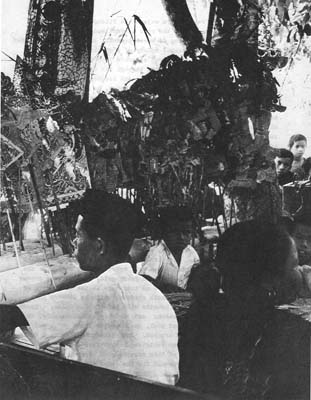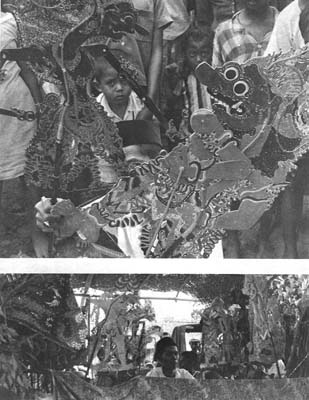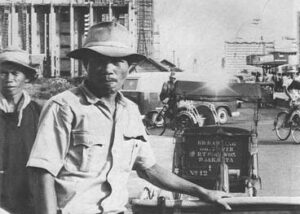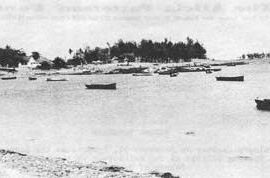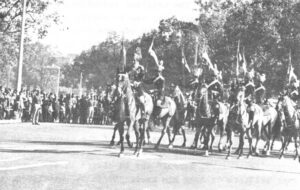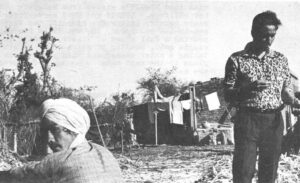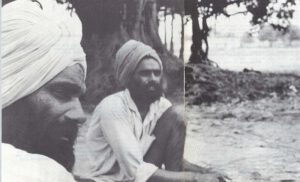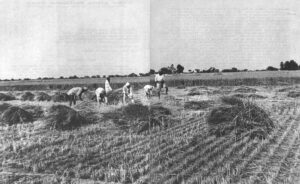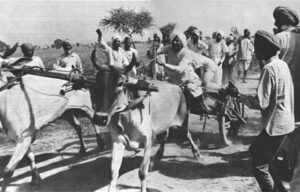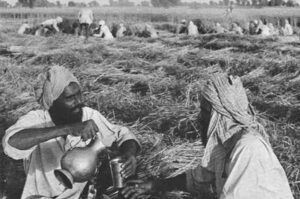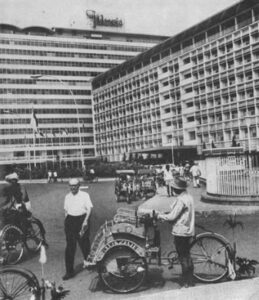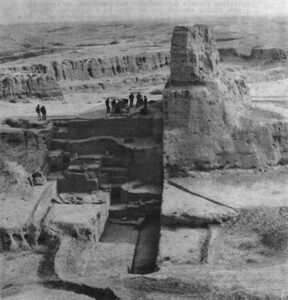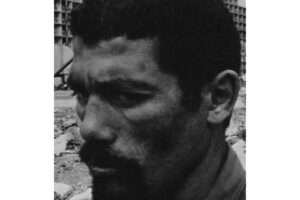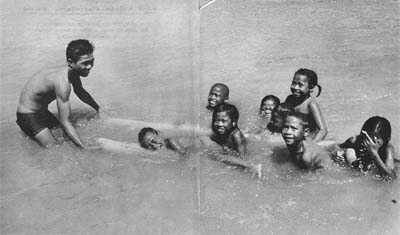
Or ever the silver cord be loosed,
Or the golden bowl be broken,
Or the pitcher be broken at the fountain,
Or the wheel broken at the cistern…
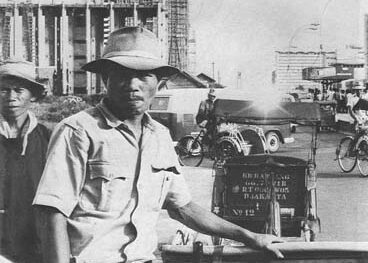
The flow to the towns is already a major trouble in the poor countries of the world. In the 1970s it is liable to become an uncontrollable flood, and threaten real, red, raw, urban revolution.
(The Economist, December 27, 1969)
For capital to pay for weeding, harvesting and planting our rice, we depend mostly on what money our sons and daughters can send from Djakarta. Why, a fourth of the population of Pilangsari and almost a third of Karanggetas village across the river spend at least part of the year working in Djakarta, selling rice, street vending, pedaling betjaks – jobs like that.
(A rice farmer in Pilangsari, August, 1970)
Djakarta is hereby declared a closed city to all future jobless settlers. Urbanization has grown to such proportions it is endangering the public safety and order of life in the capital.
(Lieutenant General Ali Sadikin, Governor of Djakarta, August 6, 1970)
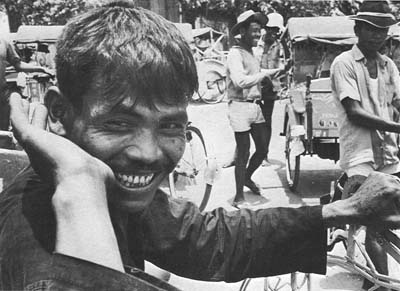
Contents
Part One:
- The Village
- God’s Will Be Done
- Homecoming
- Husen
- Pa Lojo and the Sandiwara Troupe – The Shadow Play
- Abu and Father
- Return to Djakarta
Part Two:
- The City
- Simprug
- $40 and a Wedding
- Ring
- Bantjis
- Riot
- Tjasta
- A Closed City
- The Java Bar in
- Tandjung Priok
- To Sea in Kali Baru
- My Son, My Son
- Return to Pilangsari
Part One: The Village
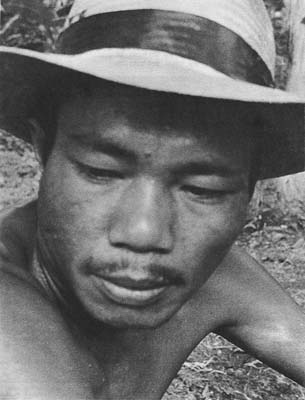
Husen, 31, a Javanese rice farmer and betjak driver
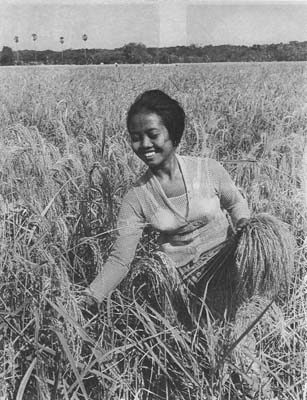
Karniti, 19, his wife
In Part One
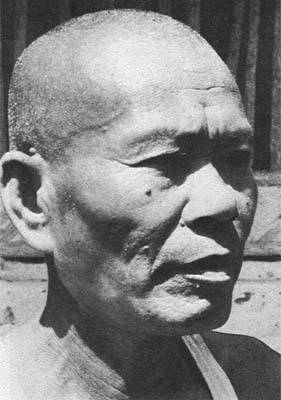
Husen’s father, 61
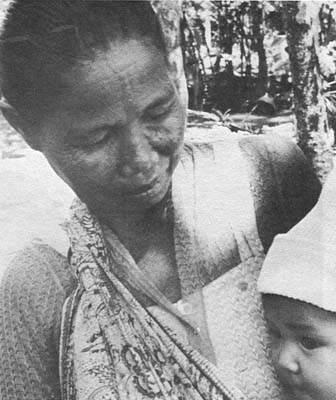
Husen’s mother, 55
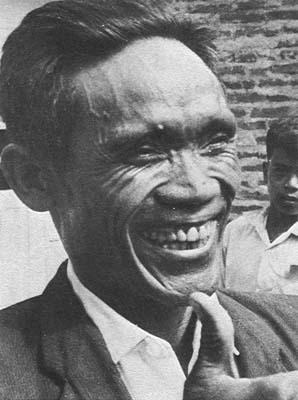
Lojo, 65, a popular comedian
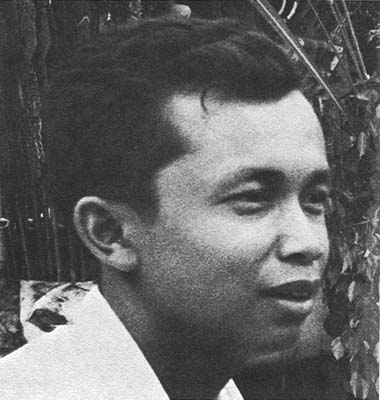
Abu, 22, a village extension worker
In Part Two
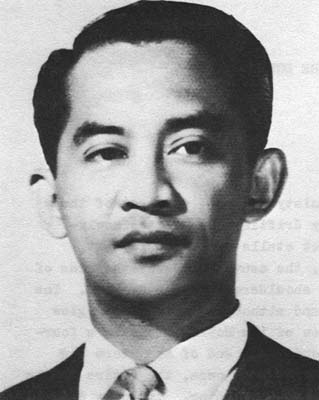
Lieutenant General Ali Sadikin
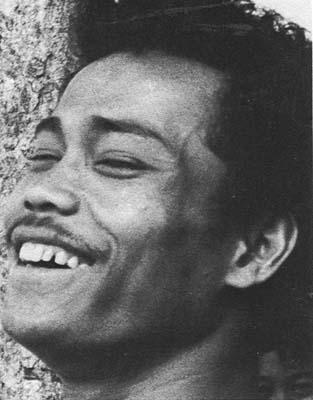
Djuned, 27, a villager-betjak man
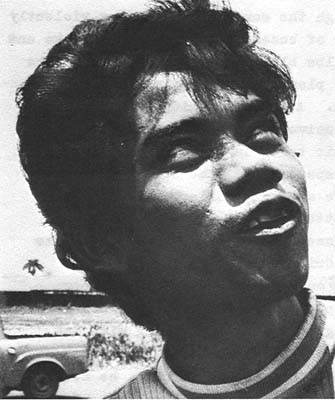
Tjasidi, 23, a villager-betjak man
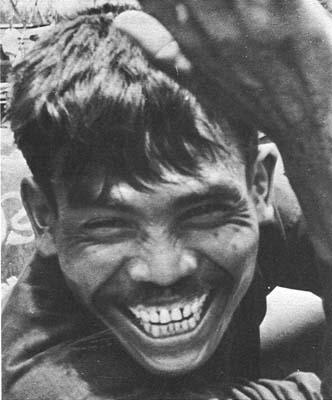
Tjasta, 31, a villager-betjak man
God’s Will Be Done
It is twilight. A misty drizzle, the last of the afternoon’s thunderstorm is gently drifting down on the newly lighted kerosene lamps of the street stalls and lying in soft, glistening wetness on the pavement, the canvas hoods of the line of betjaks and the lean, hard-muscled shoulders of their drivers. The streets are covered with puddles, and although a bright rosy glow appears on the angled glass surfaces of the Hotel Indonesia’s fourteenth floor, as a break in the clouds, the end of the storm and the onrush of the tropical night come all at once. The entire circle seems to be a landscape of flowing, falling water. It pours down the rusted steel girders of the twenty-nine story skeletal skyscraper across Djalan Thamrin, washes down the austere facades of the British and German embassies, surges through the canals and splashes violently from the gathering evening traffic of buses, motor scooters, tracks and cars. As thousands of electric bulbs blink on like fireflies in the night everything seems wet: ferns, plants, trees, palms, skyscrapers, shanties and people drip with rain. A fresh, warming breeze appears – the rain relents. The day’s oppressive heat and gasoline fumes have been washed away and the evening air takes on a gentle fragrance, one gets a whiff of frangipani or perhaps jasmine, the spicy smells of food from the street stalls and the sweet, peculiarly Indonesian odor of clove-spiced kretek cigarettes.
The betjak driver, Husen, is quite wet and looks like a phantom; he is seated under the dripping hood on the betjak’s upholstered seat, which is mounted on a bicycle base. The other drivers, now that the rain has stopped, move about, bright brown faces beaming, white teeth gleaming, laughing and joking with one another. Husen sits almost bent double. Bareheaded, barelegged and barefooted, his shorts and shirt torn and soaked through, he never makes a move. If the heavens again opened up with a torrent of water it seems as if he would not stir to find a better shelter. He is, no doubt, plunged in deep thought. If you were snatched from your rice fields and gardens, from your usual green surroundings so beautiful, mysterious and intimate men have made nature their god, and thrown into this confusion of monstrous lights, unceasing-noise and hurrying people, you too would find it difficult not to think.
Husen and his betjak have not moved from their place in the line at the hotel for a long while. He pedaled up before Moslem evening prayers, and, up to now, not a fare. The evening mist is descending over the city and the pale colored lights strung around the obelisk in Welcome Circle grow brighter. The drumbeat of a dance band drifts down from a rooftop restaurant. A shiny, black car with a diplomatic flag glides past the betjak men into the entranceway.
“Betjak!” suddenly hears Husen. “Betjak!”
He sits up but several drivers, as soon as they saw guests coming from the hotel, have left the line and are pashing their betjaks toward them, smiling eagerly.
“Hello, mister, where are you going?”
“We need two this evening, Tjasta,” calls a tall European, in evening clothes.
“I can take both, tuan.”
“Maybe you can, sport. But we want to be comfortable. Where’s your friend?”
Another driver is summoned and the two betjaks move off with their passengers. Husen pulls from under the seat a crumpled packet of kretek cigarettes and crouches over to light one. He inhales deeply, retaining the clove-scented smoke in the hollow of his chest and then blowing it through his nostrils, slowly, as if to draw its warmth to his wet body.
Along the sidewalk a vendor approaches knocking a hollow bamboo stick on a piece of wood to make a pleasant ringing sound. He balances two heavy tin cans suspended from a bamboo pole and moves with short, quick dance steps, swinging one arm lustily and using the other to keep his shoulder pole in place. Near Husen’s betjak, he sets his burden on the sidewalk, opens the can, perches on a stool and spreads out a food counter of shredded cabbage, tomatoes, pieces of chicken, warm boiled rice, jars of spices, noodles and white china bowls. Several betjak drivers squat on their haunches around this improvised restaurant for their evening meal and the smell of soup hangs pungent in the air; it seems to Husen as if he can taste it. His stomach rumbles with hunger; he has had nothing to eat since morning and puffs more furiously on his kretek.
All around him there is activity now. A steady flow of people walk on the sidewalk past the betjak stand, going in and out of the hotel: orchestra players, waiters, security men, guests.
A European youth with long hair, beard, sandals and a rucksack strolls by. “Hello, mister, where are you going?” comes a chorus of deep-throated voices. “Just for a walk,” mutters the hippie, moving quickly on.
Most of the drivers put down their hoods and climb into their betjaks to rest and talk as they wait for fares. Husen listens idly to snatches of conversation.
“There was a fight at Djakarta Fair last night. One drew a pistol. The other used a knife.”
“Last night my passenger was an American who was drunk. He made a lot of trouble but I don’t care.”
Two men are discussing a football match and Husen calls to them, “How is the score?”
“I don’t know. But at half-time it was two to two.”
“Those Koreans are unfair. They kicked our players.”
A young girl approaches from the hotel and Tjasidi, a tall, curly-haired youth, calls loudly, “This one must be for me.”
“No. She doesn’t belong to you, she’s for me,” laughs another.
The girl walks hastily past them to an older driver and negotiates a fare, as the two youths laugh. “Hello, where are you going?” Tjasidi calls after her. “Maybe going to restaurant, bar, Djakarta Fair?”
There is a commotion at the curb as two fat Dutch ladies arrive in two betjaks and disagree on the price. “All, all!” one cries vehemently, answered by the drivers’ pleas of “More, ma’am.” As other drivers gather round, the ladies give some Netherlands coins to the two men and hasten into the hotel. “Three hundred rupiah,” shouts one of the drivers after them. “Because big one.”
Another girl appears and this time chooses Tjasidi’s betjak. He brushes off the cushion and with a bow says gallantly, “Please sit down.” “Thank you.” As their betjak moves off the other drivers hoot after them, “Awas, awas! Watch out, watch out! Be careful with that one, miss!”
Along the sidewalk two tall, huskily-built youths with brilliant black hair, sunglasses and tightly fitting yellow slacks, their arms entangled, approach the hotel. Husen hears one complain bitterly, “Only for money. Not for love. I’ve had over five hundred Europeans in the last six years and all they ever made was false promises.”
Husen is distracted by a man on a motorcycle who roars up to the betjak stand and shouts, “There’s robbers! Please come! Stop them!” Six or seven drivers mount their betjaks and move out on Djalan Thamrin together, in what seems to be a formidable force. Husen joins a group gathering on the sidewalk.
“Hey, what is the story?” he asks.
“I don’t know,” shrugs a cigarette vendor. “Maybe pickpocket.”
“It started from Djakarta Fair, maybe,” says a betjak man. “I heard there were two gangs fighting each other and that man who rides the motorcycle knows one of the boys and he thinks it’s robbers but he doesn’t know exactly what.”
“I heard it’s two teenage gangs fighting. They were stopping cars and robbing people.”
“Some had pistols and were firing in the air.”
“Maybe the sons of generals or army men.”
The speculation goes on. Husen sees two foreign women approaching and calls to them, “Always tired, Madam. If take betjak, not.”
“No. We want to walk.” Husen watches the two women become surrounded by vendors selling curios, bows and arrows and velvet paintings from Bandung, carved daggers, and magazines. He tells another betjak man to follow alongside them; they will soon tire of fending off the vendors.
Husen returns to his betjak and once more, as in the rain, he feels alone and surrounded by silence. With an anxious and a hurried look, he searches the hotel entrance crowds for one person who will take his betjak. But all the guests seem to be getting into cars.
“Betjak, betjak!”
Husen jumps this time and sees a soldier over his shoulder.
“Bapak [Note: father, here used in a show of respect], where are you going?”
“Only over there. To Blora.”
With a nod of assent, Husen lifts the betjak and wheels it around on its back tires, the soldier seats himself and Husen mounts his leather perch behind the passenger seat. He pedals, briskly, his knees pointing outward and his hands clasping the handles on the back of the seat; the entire chassis, passenger and all, must be rotated to steer and one needs as strong arm muscles as leg muscles. Not far down Djalan Thamrin, just past the Kartika Plaza hotel, he must dismount and starts pushing the betjak up an incline.
“Where are you going, badoh tolo kamu! You stupid fool!” is the exclamation Husen hears from the hunched figure in front of him.
“Where the devil are you going? Go under the bridge!”
A youth on a motor scooter, speeding and skidding on the wet pavement, swears at Husen; a passerby, who has run across the road and rubbed his leg against the betjak’s wet tires, looks at Husen furiously as he brushes his pants off.
“You do not know how to drive. If there’s an accident, then what? Hey, is this the right way? Do you know or not?”
“Please, Pak, once more, where are you going? Maybe I have it wrong.”
“To Blora, fool. Blora, Blora.”
They pass underneath the bridge and in the momentary darkness, feminine voices call to them.
“Hey, Husen, have no money!” “Hello, hello, Pak, where are you going?” “Hey, you like to go pooki pooki? You like come sleep my house?”
The soldier laughs. “Bantjis [Note: male homosexual prostitute who dresses in women’s clothing to attract customers and deceive foreigners]. Only the foreigners take them for women.”
Seeing his passenger in better humor, Husen moves his lips. He evidently has decided to say something but the only sound that issues is a choked sigh.
“What?” asks the soldier.
Husen twists his mouth and grins nervously from ear to ear. He is away from the hotel now and feels he must speak to someone, some stranger like this soldier. With an effort amidst his labored breathing, he says hoarsely, “I beg your pardon a thousand times, Pak, because my boy – my baby son – he is not here, that is, please lighten the burden I bear by giving me your pardon. I know I must be iklas. [Note: State of willed affectlessness, highly desired by Javanese]. It was God who took my boy away and I have no right to complain. We must bend to the will of God, mustn’t we? I mean, what could I do anyway? But you see, I beg your pardon a thousand times, Pak, but my son died this week.”
“Hmmmm! What did he die of?”
Husen leans forward, almost rising from his seat and says, “Who knows? They say fever and influenza. He was sick a week and then died…I took him to the doctor for an injection and then to the village and then he died…Inallillahi Wainna llilla hi Roziun. God’s will be done.”
The betjak hits a pothole in the road and the soldier is almost thrown out of his seat.
“Watch out! Tolol! Fool! You have not eyes!” Husen dismounts to push the betjak wheels out of the hole and back on the pavement.
“Go on, go on,” grumbles the soldier, “Hurry a bit.”
Husen straightens up again, straining his back and legs and pedals as fast as he can.
“I am sorry about your son,” the soldier mutters.
Several times Husen seems as if to speak again, but the soldier, perhaps worried he will be asked for money, has turned, squarely to the front and apparently is not disposed to listen.
At an open air restaurant in Blora the soldier motions for Husen to stop and jumps out, handing him only a ten rupiah note.
“Wah. Not enough!” Husen exclaims.
“Why not enough?”
Alarmed he has annoyed the soldier, Husen grows apologetic. “You don’t be angry with me, Pak. All right, you haven’t money, okay? I am sorry.”
Husen pedals quickly to a tea stall, seats himself in his betjak and again remains motionless, staring now and then up at the trees and stars. The road is almost empty and he starts to rise to hunt for passengers, doubles himself up and abandons himself to his grief. In less than five minutes he straightens up, holds his head up as if he felt some sharp pain and stares forward.
Why? Why? he asks himself. My little boy was not bad. He had done no wrong. He was but one year old. So clean and fair-skinned. And big and healthy with a long nose like a Dutchman’s. He didn’t deserve to die so young. Why not me instead? I want to die too. No. I must go on. For Karniti’s sake. They say in the village she has cried solidly all this week, even since I left, that she can’t sleep, can’t eat or anything. If only I can find money for the slametans. [Note: Javanese version of communal feast, symbolizing mystic and social unity] – maybe ten, twelve thousand – I can go back and take her to the dukun. [Note: Village faith healer or witch doctor or masseur]. Maybe he can give her some magic tea to drink so she can sleep. But now I must be iklas, must be iklas…He sits numb and in silence. An hour passes, and another…
Along the road, with laughter, curses and load voices, come three young men, foreign sailors in white uniforms, two of them short and stocky and one tall and thin.
“Hey, betjak! How much to Chez Mario?” calls the tall one.
Husen hurries to mount the betjak and smacks his lips. Perhaps he will earn money this night after all.
“One hundred fifty.”
“No, fifty. We don’t wanna come back.”
“Oh, no, no, not fifty, sir.” Husen twists his mouth into a smile. “Chez Mario is a long way. Two and a half kilometers from here. Where you want to go? You go to Club 69?”
One of the short sailors groans. “We went to Club 69 last night and got taken.”
“I drive you, okay, Papa-san?” The tall one was already on the betjak seat and began pedaling the machine a few yards before he found he couldn’t steer and thumped into the road bank.
“Look,” he calls, coming back. “Look, I pay only fifty. You have too much money, papa-san. You don’t give it to your wife. You go out and drink beer and see taxi-girls and get into trouble. I’ll pay you only fifty and keep you outta trouble. How’s that for a deal? I don’t want to talk about it anymore. Okay, I’ll give you seventy-five because you’re a nice man.”
“No, sir, one hundred fifty.”
“If I give you one hundred fifty I no eat today, Papa-san,” the sailor laughs. [Note: The legal exchange rate for the rupiah is 375 to a U.S. dollar; its real buying value is considerably more, especially for food].
Husen mounts the betjak seat and tells the sailors to climb in. Seventy-five rupiah is not a fair price, but he does not mind – to him it is all the same now, so long as they are passengers and he is kept busy taking them around. The sailors, jostling each other and using bad language, approach the betjak, and all three at once try to get on the seat; then begins a discussion which two shall sit back and who shall be the one to balance forward on the edge. After wrangling, laughing and abusing each other, it is at last decided that the tall man should sit forward, he being the largest.
“Now then, hurry up! To Chez Mario.”
“Oh. Chez Mario,” Husen says absently. “Very far from here, sir.”
“C’mon, boy. Are you going the whole way at this pace? We’ll never get there. You’ve been screwing too many taxi girls.”
“Ha-ha-ha-ha,” laughs Husen. “Such a…”
“We should have got his buddy for the same price,” says one of the short sailors. “This is too damn small for the three of us.”
“If Chez Mario is no good we can try the Bamboo Den. It’s just down the street.”
“Are you going to speed up or not, you lazy cotton pickin’ bastard?” calls the tall sailor, who seems impatient to get to the destination. “Is this the way to drive a betjak? Let’s see you get a little steam up. Go, go, man go. Let’s see how fast this buggy can go.”
Husen listens to the abuse, listens to the jokes, sees the people and little by little the feeling of loneliness leaves him again. The tall one goes on talking and he chokes in a coughing fit. The other two begin to talk about a certain Australian girl named Angela they met the night before at Club 69. Husen waits for a temporary silence, then asks, “What are you? What is your country? Australia? Holland?”
“America,” says the tall one.
“Don’t knock it, buddy.”
“Ha-ha-ha-ha,” Husen laughs. “Oh, America. Much money!” He pauses for a moment and then murmurs: “My son died this week…Influenza.”
“Sorry ’bout that.”
“That’s too bad, Papa-san.”
“You sure he’s just not saying that to get some money outta us,” grumbles one of the short sailors.
“Hey, betjak, are you married?” asks the other, apparently not following the conversation. “I bet you got four wives.”
“Can you have four?”
“Yah, can. If Moslem can have four.”
“How come Moslems can have four wives?”
“I don’t know, tuan. Maybe if strong, if looking for money and is okay. Okay, can have. For me, one is enough. I have only one wife…yah, ha-ha-ha-ha, that is to say, my son is dead and I am alive…instead of coming for me death took my son. But I must be iklas. You know iklas?”
“No.” The sailors were getting impatient to reach a nightclub.
“Just like I take you in my betjak. I should feel I get a good price and you should too. So that not you or me is upset in his heart. You understand? Must be iklas and that is how I mast feel about my son’s death…”
Husen begins to tell them how his son died but at this moment, one of the sailors says with relief, “Hey, here’s Club 69. Let’s stop off and see Angela.” And Husen watches them disappear through the dark entrance. Once more he is alone and surrounded by the empty street. His grief, which had abated again for a short while, returns with greater force. He searches among the crowds trying to find one friend along the way from his village who will listen to him. But the crowds hurry by without noticing him or his trouble.
At the Hotel Indonesia a state dinner is underway and police have chased the betjaks down the street. Not noticing, Husen sees a policeman by the entrance and decides to talk to him, “Pak, what time is it?” he asks.
“Past twelve. What are you standing here for? The high people will be coming out soon and all betjaks have been ordered to move on.”
Husen starts pedaling for home, a betjak shed in Pedjampongan where he has been sleeping since he took Karniti and their sick son back to the village.
About an hour later Husen is seated cross-legged on a bamboo mat in one corner of the shed. He has replaced his threadbare shirt and the five pairs of tight short pants he wears to prevent a possible hernia with a comfortable, loose sarong and sits smoking a kretek. Out of the two hundred fifty rupiah he has earned tonight – the sailors gave him one hundred fifty after all – twenty have gone for a single plate of rice with some vegetable broth. Another ten went for coffee and a fried yam and forty for a fresh packet of his favorite kretek “djinggo” cigarettes. Eighty more has gone to pay the daily fee of the betjak owner. This leaves just a hundred rupees which is a small step toward ten thousand. Well, perhaps tomorrow he will be lucky…He will write Karniti and say it may take longer than he had hoped to find the slametan money.
The bamboo shed, no better than a crude shanty, has an atap roof, earthen floor and bamboo walls. It is only twenty by fifteen feet yet the entire floor space is filled with sleeping betjak drivers, like Husen, sarong-wrapped and bare-chested, with arms and legs entangled and the bodies packed so close the air is thick, damp and suffocatingly hot. Husen listens to the sleepers, hears some of them groan or have a coughing seizure or gnash their teeth as Javanese do in their sleep and he scratches himself where a flea has bitten and regrets having returned so early.
A touseled-haired youth in one corner gets up, grunts sleepily and goes outside to make water. Husen recognizes Juned, a fellow farmer from his village and follows him into the fresh night air.
“Juned. When did you come to Djakarta?”
“Last week, Husen, but I have been sleeping at my sister’s.”
“Want a cigarette?”
“Don’t I want a cigarette! Thanks, brother.”
Husen lights it for him and the two fellow villagers sit in the doorway of the betjak shed smoking for a time in silence until Husen says, “Listen, brother, you know my son is dead…Did you hear? This week, in the village, it’s a long story.”
Husen looks to see what effect his words have and finds the other is listening as attentively as if they were back at home sitting in front of someone’s hut and talking under the stars until late in the night. With great relief, he begins. It will be a week since his son died and although he knows he must be iklas he has not been able to speak about it properly to anyone since he returned to Djakarta. One must tell it slowly and carefully: the baby had been his third child and his second to die when a year old. The only survivor was a seven-year-old son who lived with Husen’s first, now divorced wife in Djakarta and whom he rarely saw. This was to have been his and Karniti’s first child and then the boy fell ill, he suffered fever and he died. One must describe the visit to the doctor for injections, the journey to the village when these failed, going to the dukun and the details of the funeral. His wife, Karniti, remained in the village while he came back to the city to find money. One must talk about her too.
And as Husen spoke to his friend, both sensed the mystic and social bond of their village, Pilangsari, between them and it was as if the uncertainty, tension and loneliness of the city were forgotten. Both the betjak drivers were poor, both suffered the same hardships in Djakarta, but both also were bound by the same appreciation of the pervading beauty of life in their Javanese village.
Husen’s words lifted them out of their half-empty stomachs, out of the squalor at the betjak stand, out into a green misty realm of jungle, sea, river, garden, fields and sun where daily coexistence with a higher, spiritual otherworld gave life its value.
When the baby died, Husen took it from its mother’s arms and laid it in his own lap and washed it and wrapped it in fresh linen clothes and carried it to the graveyard. And he laid his little boy on his side, resting on seven stones with the head pointing north. Then he loosed the strings on the shroud and turned his son’s face so that his little pale cheek touched the earth. And then the priest stepped into the grave and said the Confession of Faith three times in the dead child’s ear.
“O, you are already living in the world of the grave. Do not forget the Confession of Faith. You will soon be visited by two messengers of God, two angels who will say, ‘O, human being, who is your God and what is your religion and who is your prophet and what is your religious lodestar and what is the direction in which you turn to pray and what has been commanded of you and who are your brothers?’ You must answer clearly and forthrightly; you most not be afraid or startled: ‘The Lord Allah is my God; Islam is my religion; Mohammad is my Prophet; the Holy Koran is my lodestar; I turn toward the Black Stone of Mecca to pray; the five daily prayers are what I have been commanded; all Moslems, men and women, are my brothers.’ O, my child, you already know that the questions of the angels do in fact exist, that life in the grave does exist, that the balancing of good and evil deeds does exist, that heaven and hell indeed do exist and that the Lord Allah will wake each individual in the grave on Judgment Day.”
A few days later a visiting American official of an international development agency who had taken Husen’s betjak in the past observed his Javanese friend was troubled and asking what the problem was and hearing the story, he sent Husen back to the village with twelve thousand rupiah. This was enough to pay for all the needed slametan ceremonies, including the last, which the Javanese believe marks the time when the body has decayed entirely to dust.
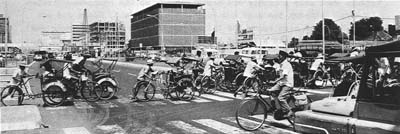
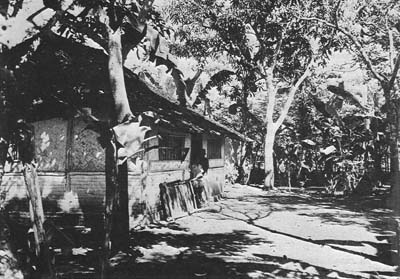
Homecoming
Many months afterward. Around nine o’clock in the evening.
Husen, along with a dozen other young men, was riding in the baggage rack atop a creaky old passenger bus on the Djakarta-Tjirebon highway. Although the wind was cold since nightfall, Husen did not mind. He would soon reach the little market town of Djatibarang and, from there could take a betjak or walk the last three kilometers to his village. Besides he enjoyed the feeling of freedom, of rushing through space and the jokes and companionship of the youths, who preferred to brave the cold and wind rather than sit in the hot, cramped interior of the bus itself. The trip had taken five hours and once outside Djakarta nature was beautiful. Everything was green, every shade of green and there were reds and yellows too. Fruits and vegetables seemed to grow to giant size this year and all the vegetation looked rich and tall. All along the two-lane highway were single-story houses, some of stone but mostly of white-painted bamboo; their bamboo picket fences seemed to stretch – broken only by the occasional roadside rice paddy – in a single line all the way back to Djakarta. The houses all had red-tile atap roofs, else they would be flooded in the almost daily downpours. They were surrounded by trees: fat, stumpy banana trees with wide, fibrous foliage; palm trees, some low, some soaring up majestically to fifty feet, clean and straight as telegraph poles with towering crowns of outstretched branches; clamps of feathery bamboo, their green trunks leaning left and right; and mimosa bushes hang with golden balls. Every so often there was a big waringin tree [Note: What is called the banyan tree in India], its trunk of great height and width as its branches reached downward to implant themselves in the earth only to take root and shoot up again as new trunks linked with the original one. To Husen, these giant trees, constantly renewing themselves and enduring for centuries, seemed to symbolize the vital essence of life.
The highway was thick with traffic: cars, buses, trucks, scooters, bicycles, betjaks. On the tailboard of one truck somebody had painted, in neat lettering, “No Time for-Love.” On others had been scrawled, less neatly but always in English, “Love,” “Revolution,” “Mr. Sly” and, curiously, “Humble Pie.” The bus driver was in a hurry and sometimes the bus would lurch as it passed another vehicle and the youths on the roof would have to grip the luggage rail tightly so as not to be thrown off. The bus knek [Note: From the Dutch knecht or manservant] or driver’s helper, who clambered on and off the roof at every stop, told Husen he had twice ridden on buses that rolled on their side; he advised him to jump upward, away from the falling side if it happened. Otherwise one might get crushed.
When darkness fell, the bamboo trading shacks along the highway were lit with hanging kerosene lamps, little orange glows that gave the villages an enchanted, strange air. In some villages along the highway crowds had gathered for a wajang kulit [Note: The famous Javanese shadow play] or sandiwara drama performance and the roadside would be lined with little stalls selling tea, coffee, cakes and cigarettes.
In Djatibarang, Husen shouted to the driver to stop and barely had time to scramble down the ladder before the bus was off again. He carried no luggage; the tight-fitting betjak shorts and threadbare shirt he wore in Djakarta were left behind at the betjak stand. Husen kept a toothbrush in both the city and the village and soap was a luxury. Besides he hated to be encumbered by possessions of any sort when he moved about.
Most of the shops were already closed in Djatibarang but people were still moving about and Husen walked for a time until he reached a betjak stand on the road to his village.
“Hello, Husen. Okay, use my betjak?” It was a neighbor from Pilangsari and Husen climbed into the betjak, feeling very much the Djakarta man in his maroon pullover and long trousers. “If tomorrow night you want to look at a guitarist from Tjirebon you can come on this road with me,” his friend advised.
“Okay, maybe tomorrow night if I have time. Do you like cigarette? Okay, please.”
“Thank you very much.” Few of the villagers smoked factory-made kreteks, which were considered a luxury, but rolled their own out of palm leaves. It was very dark along the road, most of the kerosene lamps in the houses were already extinguished and all around them there seemed to be only trees, fields and a star-filled sky. From somewhere came the sound of scolding birds, interfering with each other’s sleep. As they drove along, the betjak creaking in and out of the ruts and the driver breathing more heavily, Husen noticed motionless shapes seemed to be dotted around the fields, peeping out from bushes and hiding behind the trees. All seemed to have a resemblance to people and filled him with suspicions and fears.
“Okay, friend, this place has many ghosts,” he told the driver.
The other said the government had cut down many trees to widen the road; it was to be paved as a new highway linking Djakarta and Surabaja at the other end of Java, some 600 miles away, by-passing the nearby port city of Tjirebon.
Husen noticed one tree, almost jutting into the widened road, had been left standing. “Remember, is this the tree that has a ghost?”
“Yes.”
“Ah, that’s why they didn’t cut this tree. There’s the Bali Desa [Note: Village headquarters]. A lamp is on.” Husen called out, “Hoi! Hoi! Stop, stop, because I want to tell my chief I’m back.” But then the lamp he saw flickered out and they continued on to a large clump of trees across a canal. Husen was speaking in a hushed voice now.
“This bridge good or not, over the canal?”
“Oh, better over there. That one is big and good.”
“Okay, over there better. Yah, all right, stop.”
“You have small money?”
“Yah, brother, have. Djakarta money. I can pay you.”
Husen crossed the small footbridge over the canal and followed a path along a grove of banana and mango trees. Through the dimness appeared a bamboo cottage with an atap roof and shattered windows. Somewhat to one side a woeful little pond was discernible; besides which drooped some somnolent little papaya trees, barren of fruit. In the blackness of the garden behind the house Husen could hear the croaking of angry frogs. Otherwise nothing else was to be seen or heard near the house except a pale expanse of open rice paddy, resembling, in the night, the open sea.
Hardly had Husen called out, “Ma! Ma!” than there was a sound of glad voices from the house – one was a woman’s, the other two men’s voices; a bolt was pulled back, a swing-door gave a squeak and in another moment a tall, spare figure stood by Husen, holding his hand and chanting a Moslem prayer. He was bald and wore only a pair of loose black pajamas and seemed very joyful to see his son again. Husen took his father’s right hand in both of his own and bowed low.
“Please inside,” the father said, as Husen’s mother and younger brother, Tarja, rushed out. After greeting them, Husen asked. “Where is my wife?”
“In Karanggetas tonight. She went across the river to visit her parents this evening. How are you in Djakarta? Are you very well, my son?”
After hot coffee had been fetched and Husen inquired if the river boatman had already gone to sleep – he always worried about friction between his parents and Karniti – he and his father went outside to sit under the stars on a bamboo bench.
Husen mentioned he had observed that the government had left one tree uncut along the road. He knew his father always enjoyed talking about ghosts and asked him, “How many years ago, Father, about the ghosts before?”
“Oh, you were like your son is now. About ten or twelve years old.”
“Oh. Yes, I not forget. It was about 1948 or so. You want to make jokes with some children and buffalo boys.”
“Yah, firstly, I just wanted to make a joke. I saw some children coming and I said, ‘Do you want to see ghosts?’ The boys said, ‘Yes, where is it?’ ‘All right,’ I told them, ‘you must take off all your clothes and follow me. Each of you must bring a tin or bamboo and hit it to make some noise. Na-no, na-no, like that.'”
The father chuckled. “Well, when they did that one of the boys actually did seem to see a ghost. He suddenly ran away and all the other children started to follow him. But I called them back and forced them to go on. I said, ‘Trus, trus, [Note: trus, pronounced “troos,” is a common expression meaning “Let’s go,” “Hurry up,” “C’mon.”], go on, go on, don’t be afraid. Let’s go, let’s go.’ And they went on, round the village. They visited all the houses which had sick men or sick children. I gave the children a chant to frighten away all the ghosts, “Patjolang, Patjaling, Patchiak, chiak, Rakim Bismillah.’ I, myself, didn’t take off my clothes. One of the boys went into a house but came running out again and kicked me. I cried, ‘Oh, don’t.’ He said he thought one of the ghosts is hiding in my clothes. Every night they went around to the houses which had sick people. All came. It was like a demonstrasi.”
He sighed. “We had a curfew then. There were Dutch soldiers in Djatibarang.”
Husen remembered. “They had red berets. In front of my school.”
“When the boy went to kick me, I said, ‘Oh, no, no, it’s me. I’m not the ghost. Don’t, don’t. I am not ghost.’ All the boys took off their clothes. That is why they could see the ghosts. But I didn’t. Only the boys. They tried to run away but I was not afraid. Because I didn’t see the ghosts I said, ‘No, no, let’s go on.’ If I took off my clothes I would get in trouble in the village. But that’s why I couldn’t see the ghosts. But the boys describe them to me. One ghost wore a red badong or sash around his waist, nothing else. The boys said he was floating suspended over the earth and was dancing.”
“I remember. It went on very night. They said the ghosts were very tall and white. Setans.” [Note: Setans is a generic word for “ghosts” in Pilangsari]
“If the ghosts walked it was not like we walk but like the puppets do in a wajang play.” The father made a floating motion with his fingers. “The ghosts stayed for a month, every night, all night, then left and never came back. At the end of the month an old man in the village had a dream. We must serve the ghosts with tumpeng poleng, put steamed rice stacked as a pyramid and dyed white on top, Yellow in the middle and black at the base and leave it with a cigar, a piece of roasted chicken, a piece of roasted fish and incense.”
For a time there was silence. A lizard shrieked from its perch in a banana tree. “Gecko! Gecko! Gecko!” There was another sound from the blackness of the garden: “Knick, knack, knick, knack.”
“Oh, maybe a ghost,” said Husen’s mother from the doorway.
“No,” the father replied. “That is only a turtle or frog.”
“In Djatibarang a small baby sometimes dies every day,” the mother went on. “I have heard many ghosts of children calling, over there on the other side of the village where the trees are thick, many, many hear ghosts.”
“There are many also in the banana grove behind our house,” the father affirmed. “People going there at night to relieve themselves sometimes have seen the earth rising like a geyser.”
Out of the darkness several figures approached, neighbor youths who made the rounds of the village at night, sometimes playing a guitar and singing the sad, bittersweet songs of Tjirebon, telling stories or dongeng, as Javanese folk tales are called, and sleeping wherever it suited their fancy. Sometimes they would talk all night, and then swim in the Tjimanuk River before going to work in the fields. The Javanese did with remarkably little sleep. One of the arrivals was Husen’s friend, Juned, also back from Djakarta, who said, “Tell us about the ghost you met in Djakarta, ‘Sen.”
Husen chuckled with self-deprecation and pleasure as the others joined in, “Yah, Husen, trus, trus, let’s go, tell us.” He was known as the best story teller in the village and was always pleased to have an appreciative audience.
The lamplight from the doorway cast a flickering halo over the group of men and youths who huddled together, Husen joining them in squatting on the ground in a semi-circle around the feet of his father. Outside the orange halo of light the world looked impenetrable and dark. The youths were resting from a day’s hard labor and edged in closer as Husen began:
“The Phantom Passenger”
I am a betjak driver in Djakarta, oh, seven or eight years ago, maybe 1960. I am going along Djalan Palam Street in Menteng at 12:30 at night and I look under the trees in front of one house where it is very dark and see this girl. I think, “Oh, this is nice girl. What is she doing here?” And she waved to my betjak. I stopped and she got into the betjak. Oh, very nice, beautiful. And I said, “Where are you going, Miss?” She doesn’t answer but just points down the street so we go. I can smell very good perfume.
“Why, Miss, are you out so late?” I am asking her. “No taxi’s now. It is after midnight.”
But she does not speak. Now before I hear people speak that there are many setan and kutil anak [Note: A prostitute ghost] on that road, Djalan Palam, which is lined with very tall palm trees. And so I say, “Where are you going, left or right?” But she only pointed to the right, to Djalan Djawa.
“Where are you going?” I asked again and again but again she only pointed, this time to Gredja Theresia Street. She used her left hand. Then she pointed straight and we went to August Salim street and then on to Djalan Thamrin. I think maybe she want going to Sarinah Department Store. Maybe to the nightclub upstairs. Because she is very nice, this girl. But instead she pointed left down Djalan Wahid Asim, a dark place and the houses not so good and I am getting worried now so I ask in a hard voice, “Where are you going?” But she not talk. One word also, no. So we go through Tanahabang and after Tanahabang there is a highway to the market and we must go up a steep hill. There is a big bridge there and usually I must get off and push. But now I feel myself very strong. I am very happy driving, very easy. Not tired. And after Djembatan Tinggi I think, oooooh, this is very nice girl. Maybe she like with me. So I reach out to touch her shoulder and, aggggggh, there is nothing there. My hand goes right through her.
At this, Husen’s audience drew nearer, just as if they had grown apprehensive.
Oh? I can see, I can see. But I cannot touch. So the hairs on the back of my neck become stiff and I see we are passing Kober Djatipetamburan, the biggest cemetery in Djakarta. Now I hear the gong of another betjak behind me. Br-r-r-r-r-r-r-ing. Br-r-r-ring. Like that. And I turned my head a moment to look but there was no betjak there. And when I turned back again the girl had vanished. I not stop. She cannot jump down. She is just disappear.
“Wah!” I think. “This is ghost! Kuntil anak!”
And I jumped out, lifted the betjak in the air to turn it around and pedaled back to the Hotel Indonesia as fast as I can. But not speak with other people. Because it is bad luck if you have seen a kuntil anak. For one week I am very lucky. I find much money with my betjak. But after one week I am standing in front of Hotel Transaera at the railroad station and I am tell with my friends, I am talk with my friends, the other betjak drivers. And they said, “Oh, that is many times in Djakarta, many betjak drivers, find like that.”
And one betjak driver said, “Husen, if you can pull one hair from the head of a kuntil anak it is very lucky. You will get rich.”
Now I know this too but I forgot. I not think because if it was girl and not kuntil anak then she is very angry with me if I try to pull out a hair. Because if not setan or ghost but girl, okay, angry, I am afraid.
But the next time I bring girl, very nice girl, late at night, how many months again I forget, I find this girl in a scary place and it is 11:30. I am the betjak driver and this girl not speak again but only point. And I am think, “It is, sama sama [Note: The same] like before,” and I am afraid like before. And so I reached out and grabbed her hair.
“Ee-e-e-e-e-e-e-ek!” this girl screamed. She is very angry. “Why you make like that?”
“Oh, I’m sorry, sorry, sorry, sorry, sorry, Miss,” I speak.
“Why you grab me like that? I call polisi!”
“Oh, Miss, I think like Djalan Palam.” And when I told her the story she was all right again and not cry for the polisi or anything. And a very big house she have. Rich peoples. One big building.
So after that if nice girl at night, if too late and they don’t talk, I don’t reach out and grab them but just try to pull out one hair. You know the betjak driver holds his hands on the sides. So if we go fast and the girl’s hair flies out I move my hands a little and try to catch one hair. I keep trying. I think, yah, if setan, one hair will I try to get. It is very good luck and I will get rich. So when girl passenger’s hair flies, I pull out one. If she screams, I think, “Wah! This is girl.”
Husen paused and laughed uproariously.
Then I am say, “Oh, very, very sorry, Miss. Your hair is flying in the wind and catch where my hand holds the side of the betjak. But there is that good luck also. If I catch a setan’s hair I will have money. So I keep trying until now. If bring nice girl late at night.
“Go on, go on,” Husen,” his audience exclaimed when he finished.
“Yah, tell us more about you as a betjak man in Djakarta.”
“Oh, yah, it is only a routine. Although I am betjak man I never join fights or demonstrations,” Husen rose, tore off a banana leaf and brought it back to the circle to sit on, dusting off the seat of his pants. “You want history about how I am staying in Djakarta?” “Better about the man in the moon,” said Juned, who had had enough of Djakarta himself for a while. “Do you want to hear about man going to the moon?”
“Yah.” “Yah.”
“Okay, I tell you the history. The first time there are three men in a rocket. Their name is Astronaut.”
“Oh, Husen, what is the meaning of Astronaut?”
“Oh, three men inside the rocket and they are heroes. And they are all clever men. Maybe professors and so on, I don’t know. You see, the United States country is modern country. And American people, they want to try everything. Maybe these Americans they want trying going to the moon and the Mars and other things in the sky. Maybe they want sama sama with God. All the time try.”
“Did they really come to the moon?”
“Maybe. But not sure also. But what for the radio tell, if not true? If Radio Djakarta tell every night, why, if not true? Already American peoples they want to try everything in the sky. Radio Djakarta tells every night about Astronaut.”
“What is Astronaut? Not understand.”
“Ah, Astronaut is three people who want to try the moon.”
“Who is that, the three people?”
“Oh, I forgot. Gordon maybe is one. Like before you see Flash Gordon? You, see in cinema? But this Gordon is better than Flash Gordon. That’s only story in book, not sure. Because three men really go to the moon.”
His friends were puzzled. One asked, “That is, not eat, not drink, in rocket?”
“Maybe bring food in the rocket and maybe bring oxygen to the moon.”
“Oh, very far. Very far.”
“I heard on Radio Djakarta. Already inside the moon. Long time ago.”
“What is proof the men come to the moon?”
“Oh, listen, listen, brothers. Three people, the radio said, went with a big rocket and a small rocket up under.”
“In the moon is only one woman, Njitawok and cat. Because if I look from here, I see Njitawok give food to the cat.”
“No, no, no Njitawok. No the trees. No the water.” Husen began to despair of making his friends understand.
“Go on, go on, Husen,” coaxed Djuned.
“Well, after come to the moon, Astronaut jumps, but most slowly. Many dust over there and many big holes. Now I know that if a nice girl like the moon it is no good. Before people see a nice girl, they say, ‘Oh, her face is like a moon.’ But now, no, because the moon is full of too many holes.”
“That is not hot, the moon?” one of the youths asked.
“Because if from here it gives light at nighttime.”
Husen replied, “Oh, because light from sunlight. Look at a mirror. If you put it in front of a lamp you can see the light.”
“Husen, if the moon turns over, why don’t the men fall off?”
“Look here,” Husen said. He took an old pail lying in the yard and dipped it into the pond, filling it with water. Then he swung it over the heads of his friends. “If you spin, it goes to the bottom, not fall down. People are like this water, stay like this. Because there is a magnet in the center of the earth. Because go very quickly.”
“Okay, go on, Husen, trus, trus. Give as another history. About history in Djakarta.”
“Oh, yah, I have one more. I hear there is a restaurant under the ocean. Maybe from Japanese. He want to make restaurant like that.”
The youths laughed. “Oh, not restaurant under the ocean! The water go inside the restaurant and the people eat over there die.”
“No, no,” Husen said. “Very large. Maybe one hundred meters. Maybe the restaurant is made from steel. In order the big fish don’t hit the sides.”
“It’s illogical,” thought Djuned, who unlike Husen, never read newspapers. “I don’t believe. And the water, many inside. How do they push the water out?”
“Oh, you don’t believe, ‘Ed? You look in Djakarta. Many. They push out water with pumps. You can see. Maybe behind the steel they fix mirror. If already take out water, they pump out with machine. Maybe give hole from the room going to, up over the water. Okay, maybe the people who eat in that restaurant seeing fish. Very happy. You can go. Looking left and right. Very happy. In Japan.
“Husen, you ever go inside the Hotel Indonesia?” This was more familiar ground.
“It looks like a beehive.”
“The people over there not fall down? How the people’s going up so high over there?”
“You don’t know how elevator is going? Okay, I tell you.”
“Riding the Elevator”
One time an American peoples come out from Hotel Indonesia. And I say, “Hello, mister, where are you going?”
And he say, “Hey, boy, you know Tjendana Street?”
“Yah, I know.”
“Take this letter and deliver it over there.”
“With you, tuan. Better with you.”
“No. I’ll wait in my room. And you must wait for an answer to this letter. Bring the reply back to my room in the Hotel. It’s number 812.”
So I took the letter to a big house on Tjendana Street. But at the corner many soldiers are waiting because it was already seven o’clock and some big generals lived around there. I am afraid because President Suharto’s house is also on that street. My President, Pak Suharto. Very near this house where I must take the letter. I’m afraid of the soldiers and stop in front of them with my betjak. “Oh, good evening,” I tell the soldiers.
“What do you want?” says one.
“No. I only want to deliver this letter,” I said.
“Over there,” the soldier said, but he pointed away from the house where I want to be going. It is inside the barricade. So I take a round and come back and ask again.
“Hello, what is it you want, betjak man?” the soldier asks again.
“Pak,” I said, because it is a soldier, “Pak, where is this address?”
“Over there,” he says, pointing the wrong way so I take another round and come back again.
“Pak,” I say this time, “this letter is for over there. Not so far from this barricade but inside.” Wah, I think, I am very tired. Go and come. Go and come. Only pay 250.
The soldier is looking at me. “Oh, yah, it is inside. Go over there.” He lifts the gate and I take the betjak inside in front of the house. But, wah! Two big tanks are in front of the house. “Okay,” says another soldier. “Come with me.” Two Panzer tanks in front of the house, wah! “Okay, waiting, waiting you.” So I am waiting while a man inside the house is writing an answer to the letter I bring. Then he sends a new letter outside. I am come back again. Wah, I think, very difficult.
Only two hundred fifty! I must go into the Hotel and go into the elevator. I am never see an elevator before and stand there waiting. The door closes. But not go up. Wah, very difficult. I wait there some time and then two white people get into the elevator, but women. I think, okay, I go up sama sama. And they push the button and we go up. But these two women, she is out on fifth floor and I want to go to eighth floor. But I not know how. So I get out at fifth floor and am looking for the number 812 on the door. But I see the two women follow me and stand and watch me. I am wearing short betjak pants.
“Oh, I am sorry, madam. I am looking for this room.” And I show them the letter.
“Okay, come with us,” one says. “I’ll bring you to this number.” And again we are inside the elevator. The lady pushed the button but we go down instead of up. “Damn,” says the lady because somebody else has pushed the button first. Because I not understand. So we go down and then up again and this lady, she is out with me, sama sama, on eighth. I am only looking for the number, standing in front of the door with 812. The lady knocked on the door and a man came out. “Thank you,” he tells the lady. “Why have you taken such a long time?” the man says to me. He is angry. He gave me the letter at seven o’clock. Now it is ten o’clock.
I am not speak much English at that time so only can say, “Going over there, going over there with the soldiers. My President, Pak Suharto stay.” And maybe he is understand because he gave me another 100 roops. “You long time stand in front of this hotel, boy?” he asks.
“Yah, long time. But I am not understand about inside of hotel.”
Inside the hotel I not like. Very quiet. Room by room, only room. You never find anybody in a gang of peoples like outside. I want to knock on the door but am afraid of wrong number. The lady knocked for me and the number is right. But if I got wrong? Wah! Many troubles. I not go inside the hotel again.”
Husen sighed and lit a kretek. To the youths in his audience he seemed very wise and experienced and they were glad to be in the village where all was familiar.
In Djakarta you must be careful, Husen continued, if you go first time to Djakarta, better you look for betjak driver, Javanese from Tjirebon. Speak, speak, like friend. You must speak friendly, like Djakarta peoples. “Okay, let’s go. Bring me over there, Hotel Indonesia. Okay, how much?”
You must tell how much from here going over there. If the betjak driver says, “Oh, never mind, it’s up to you,” maybe he thinks you are many times in Djakarta. So is like friend. If you buy cigarette and give to him and it is a new packet, you must open first. Because all betjak drivers now understand if passenger give cigarette to you with packet already opened he not like. Because maybe dangerous. Maybe some drug like opium or morphine in the cigarette.
“So it is like that, Husen?”
“Yah. If new packet of cigarettes than you smoke first and after offer to him. And after that you and betjak driver are very friendly. You must speak, speak with betjak driver so he is not tired and he bring you very well. Speak, speak, all the time with the betjak driver.
“Good, good,” grinned Djuned. “When I go to Djakarta I try and do like you, Husen.”
“Much money over there, Husen?”
Husen chuckled. “Okay, yah, if you not like me, okay, maybe much money also.”
His father said, “I forget everything about Djakarta. It was a long time ago. I left Djatibarang by truck and came to some place…I can’t remember. It was so confusing. Cars and people going every direction.”
Husen turned serious. “If you come in Gambir Station Railway you must be careful. You don’t take truck or Austin or bus in front of Gambir. You must take betjak first and have him take you to Thamrin or Harmonie or Banteng bus station. Then you can look for bus. Have sign on front. And you can take that bus. Sometimes maybe if take bus from Gambir can get robbed. Not for sure. Maybe. You must stay with friends at first. You must stay with me if first time in Djakarta.”
“Tell as a dongeng, Husen.”
“Yah, another history.”
“Oh, Husen,” laughed Djuned. “If you have many history you, are quickly old.” Husen grinned, “You like to hear story of Koler.”
“Trus, trus!”
“Koler”
Once upon a time there was a carpenter who was many times looking for wood in the forest. Because he stayed in the forest a long time, yah, maybe ten days or two weeks. Mosquitoes came, so many, many and the carpenter – his name was Koler – said, “Wah! This is not good, to stay in the forest.” One night he became very angry with all the mosquitoes and cursed. “Damn these mosquitoes! Fuck their mother!”
At this a beautiful woman appeared, who said she was the mother of the mosquitoes and had come to fulfill Koler’s wish. But while they were fucking, she turned into a giant mosquito and flew away while Koler was still inside her.
And so the carpenter’s pipe (penis) became very long, about a hundred meters, like a fire hose, so he is called “Koler” in the Javanese language.
And Koler said, “Wah! This is very difficult. I am fucking with the mother of the mosquitoes and happy already. But now my pipe is very long.”
So he bought a sarong and wrapped his pipe round and around himself, bent over and pulled on the sarong, so no one could see his great pipe. And he said, “Now better. Because no one can see. But I am very hot. Maybe good go swimming in the river.”
Across the river was a king’s palace. And while Koler was swimming, the king’s daughter and her nurses came to the river to bathe. And the king’s daughter is also swimming, swimming in the river. Koler has also jumped in the river without his clothes and when he saw the king’s daughter his pipe got hard and went across the river to find the king’s daughter.
And she cried out to her nurses, “Oh, this thing I find in the water. This is very happy. What is this?” And she told many people, “In the river, I don’t know what is this. I don’t know but is very happy.” And the next day she again played in the river as Koler was swimming on the other side.
After some days all the people in the court knew the king’s daughter was going to have a baby although she has no husband. And soon the baby is already big and can walk. The king’s daughter is beloved by all even if she is not a virgin and has a son. Many young men fall in love with her. And the king gets confused because too many nobles from other countries want to marry his daughter.
So the king has a contest for many, many peoples and he tells them, “Whoever brings food for the baby and the baby likes it, that man is its father.”
And the people, so many, bring food, like apples, like mangos, like good things, motor car, Honda, Toyota, if this year. Many, many rich peoples come because the king’s daughter is very nice. But the baby doesn’t like any of the food or presents.
Koler hears about the contest. But he cannot go anywhere. He only sits with his sarong wrapped all around him to cover his great pipe. But he hears more and more about the contest and finally thinks, “Ah, it is time for me.”
Because Koler is a poor carpenter he has nothing to give the baby. So he makes a kind of food, leftovers from pounded paddy, with gar, water and salt and puts this, called duk, in a piece of banana leaf and presses it with a brick and roasts it on the fire.
And Koler only brings this because he is a poor, poor man. He cannot walk very well, like this…
To everyone’s merriment, Husen rose and, doubled over, waddled around like poor Koler in his sarong and predicament. Husen chuckled, “Poor Koler.”
And he gives the duk to the baby and the baby eats it and likes that food. So all the people are looking at Koler and they applaud when the baby eats. “But, oh, the daughter of the king will marry with this poor man,” they say and the king is ashamed and he gives black instructions. He says that whoever can kidnap Koler and drop him in the sea will be rewarded. And the king gives money, one million roops, to whoever will kidnap Koler and he says whoever succeeds can marry his daughter.
And one evil man puts Koler inside a drum and drops it into the ocean and Koler is riding the waves of the ocean for two years. You see, these ancient people can go without eating and drinking for two years. And Koler goes to the middle of the ocean but the wind carries him back again after two years. One day the drum is swept onto the sand and a very old man, walking along the ocean, found it and opened it. “Oh, what is inside this drum?” he said.
And inside the drum was Koler and Koler stepped out and his pipe is short again and he looks a very noble prince.
“Oh, very good,” said the old man. “You stay with me.” Because Koler is now very nice. The old man stayed in a hut near the ocean and Koler told the old man all the story.
But now the king’s daughter is already married to the man who threw Koler into the ocean. At that time, the kingdom is attacked by an epidemic and many people die. Many ghosts are there also. Now Vijayakushuma as Koler is now called, since he is nice, heard that in the kingdom there is an epidemic and diseases. And the king’s son-in-law has vanished. And Koler learns about it and comes to the kingdom.
“I can help you, about this situation,” Koler tells the king, “which was created by your son-in-law because he is really not a man but an evil spirit.”
At this the little boy is coming and he says, “Hello, papa.” He recognizes Koler who is now Vijayakushuma. And the daughter of the king was surprised that Koler is back to normal and is a noble young man.
And Vijayakushuma said, “Tonight I will look for the ghost and destroy him.” And in the night Vijayakushuma went out and fought with the ghost and in the morning he told the kingdom, “Now already I have killed that ghost and lady, that was not your husband but a ghost. Your husband is me and this is my son. You know how I made this boy? If you want to know how I made this boy, remember swimming in the river? Were you happy or not? Before my pipe was one hundred meters but once you married the ghost and I am in the drum at sea for two years, my pipe goes back to normal.” So Koler and the king’s daughter lived happily ever after. [Note: Needless to say, it is much better to hear Husen tell a dongeng orally]
“Hey, Husen, now monkey and turtle!”
“Okay,” Husen chuckled. “You not tired?”
“Monkey and Turtle”
This turtle have plenty of banana trees. And from the ground the ripe bananas are too high to reach. And the turtle is confused because he cannot climb the trees. He can only stay under the trees. He wants to take the fruit of the bananas but cannot reach it. Too high.
Along comes a monkey, walking by the turtle. And the monkey looked at the turtle, who stayed under the tree and the monkey said, “Why you stay over there, Turtle?”
The turtle answered, “Monkey, can you help me get these bananas down and give me.”
The monkey said, “All right, I want to pick the bananas.” And the monkey climbed the tree and picked the bananas but the monkey didn’t bring down. He only sat there, eating them.
And the turtle said, “Where is Monkey?”
The monkey said, “Here. Awas. Be careful.” Instead of dropping bananas the monkey answered the call of nature.
The turtle again, “Where is?”
“Over there, over there. Black one.”
“Oh,” said the turtle. “You cheated me. This is not bananas. Only this is your droppings,” and the turtle ran to the river.
One day the monkey was swimming in the river but he is very cold and wet. And he comes up on the sand and he wants to find the turtle but he doesn’t see. Instead he finds a djengkok, a footstool with a carved back and a knob for carrying, and he sits down. “Yah,” the monkey says. “Oh, better I sit on this thing.” And he sat down. And he called to the turtle, “Turtle. Turtle.” The turtle said, “Tinul, tinul” in his high squeaky voice. “Yes, Monkey?”
And the monkey said, “Where is Brother Turtle?” He looks around but cannot see the turtle. And the monkey calls once more, “Turtle!”
“Tinul, tinul,” comes the answer.
Here the audience laughed at Husen’s high-pitched turtle’s voice.
And the monkey said, “Aw, goddam, shaddup, fucking, bloody, this is, my pipe has answered.” Yah, the monkey thinks his pipe has answered because he doesn’t know that he is sitting on turtle. And the monkey runs and takes a stone and bangs it down on his pipe. “Agh-gh-gh-gh!” goes the monkey and he loses his senses.
And the turtle runs away and comes back and says, “What happened to you, Monkey?”
“Aw,” the monkey said, “I am lost consciousness. Because I just hit my pipe. Why? Because I took the stone and banged it down on it.”
And the turtle said, “Oh, it was not your pipe that answered. I am is under you. You sit on my shell. You call me and I am answer. Tinul, tinul. And why you took your pipe for me?”
“Oh, I don’t know. Because I am looking to everywhere, looking for you and not find, not see you, and I am angry. And I took a stone.”
“Yes. But you are an animal. I am an animal. So you don’t lie to your fellow animals. Are you not forget before? I tell you to give me bananas but you are answer the call of nature. So now you get your turn.”
“Oh, yes.”
“That is monkey,” said Husen. “Finish,” and he doubled up with laughter. “You understand? The turtle ran away, when the monkey cries he hit his pipe. That is ‘fraid and come back and find.”
“More, more, Husen.” The youths now were beginning to stretch out, leaning against one another with their sarongs pulled over their shoulders against the cool night air.
“You want more? Okay, one or two maybe short ones and then better we go sleep. Hmmmm. You know how Tangkuban Prau Mountain got its name?”
“Tangkuban Prau Mountain”
Once upon a time one woman have a son. But this boy is naughty. And the mother make of the food and the boy said, “C’mon, Ma, give me food. You make quickly. Give me food. Because I am hungry.”
And the mother is angry with this boy because this boy is very, very naughty. He is impatient to wait. And his mother took a tjantongor wooden scoop, and she hit him in the middle of the forehead and blood came out and he ran away.
And he went to the forest and lived with setans and ghosts and giants for many years. And because not long time coming to the village and one day this boy want going to the village and he went. In the village the boy saw a beautiful woman who was very, very nice. So he love with her. And the woman also looking that boy, okay, love him also. So sama sama love. And that is about loving, already long time. But not like fucking – fucking, no. Only loving. That is, he wants to marry her first. But because the boy has so many fleas in his hair he says to the woman, “Come here, lady. Look for fleas in my hair.” The woman saw the scar on his scalp and she knows it is her son. She think, “Oh, that is my boy” and she is surprised and ashamed because she is love with him. Because she is sure it is her son. And the woman said with the boy, “You are my son.”
But the boy is not certain she is his mother. He said, “No, no, you are not my mother. I am love with you.”
“I am not forget. You have scar on your head.”
But the boy is not sure. The boy doesn’t believe her story.
The mother said, “All right. I like to marry you but only you must first make a boat and finish it in one night.”
And the boy said, “All right.” But the woman knows he cannot make a boat in one night.
The boy, he ran into the forest to seek help from ghosts, setan, giants and so on. The boy makes the boat. After midnight he wants to finish. But the woman came to see if he had built the boat. The mother saw him and was surprised he had almost finished it.
And she quickly threw up her slendang or red shawl, which looked like the sunrise and the ghosts, setans and the boy’s friends, he think it is already morning and ran away. And the boy is very angry because he knows he cannot finish in time and will never marry the woman and in his fury he kicked the boat and it fell over, on its side and now is the Tangkuban Prau Mountain.
“Now one last story,” said Husen. “The name of this one is “The Son is a Lazy Boy.”
“The Son is a Lazy Boy”
One Masir or King in Egypt has a daughter and all the men in the country want to marry her. People from twenty-five countries come. It is only history.
Husen paused and laughed.
Because so many countries come to that King he notifies nobles of twenty-five countries and says, “Whosoever is the bravest fighter can marry my daughter.”
And war breaks out between the twenty-five countries and two end up on top. Neither can defeat the other and it presents the King with a problem. So he decides to hold a second contest. For the King sees both countries are strong. And he says, “If you show adji penrawa, or telepathic powers, you can marry my daughter.”
The King has a servant who listens to what the King tells the two other rulers about the contest and the servant says, “All right, I am adji penrawa.” Neither the two other rulers possess these powers so they leave.
The servant asks the King for time. “Give me seven days.” And the King asks the servant, “You really possess such powers?”
“Yah, I do. Give me time. Waiting for seven days.”
And the servant ran away. Looking for different fruits. Mangos, bananas, oranges. And he went to the forest and dug a hole and hid the fruit in several places.
The servant, after seven days, he said to the King, “All right, Your Majesty, I am ready.”
“Oh, you are ready. You want to try with me? Okay, let’s go to the forest,” said the King.
They left the palace and went to the forest and every kilometer a fruit was buried. The King and all his ministers and the servant leading the way. And the servant said, “Stop here. Because okay already.” And he looked in the earth. The servant said, “Oh, here is mango. All the King’s ministers want to test me, all right.”
He took a patjul, or hoe, and dug up the mangos. All the people applauded and expressed their wonder. He went on and found a fruit every kilometer until they reached the forest.
So now the servant can marry the King’s daughter. He is very lazy but he is clever and already married with the King’s daughter so now the family is very happy.
But one day the King wants some more fruit from the forest. And he told his son-in-law, “Oh, can you find the fruit of Ketileng in the forest?”
“Oh, father, I am very tired to search for fruit in the forest again. But, okay, I will do you. You bring a sack and we’ll go now.”
And they went together into the forest. And after they entered the trees were very high and there were many red ants.
The King said to his son-in-law, “You can climb trees over there.”
“Oh, I am sorry, Father. I am sick in the head, maybe influenza. Better you climb, you climb the tree and I’ll gather the fruit and put it into the sack.”
The King agreed and climbed the tree and the son-in-law gathered the fruit and put in the sack.
After half an hour, the King said, “Hey, son, already or not?” The son-in-law, who had crawled inside the sack to sleep, looked up at the King but said nothing. The King called down again, “Son-in-law, ready or not?” The King said to himself, “Goddam, he went home already.” The King climbed down and saw the sack already full and thinks it is full of fruit. And the King carries the sack back to his palace. After he has returned, the King asked his daughter, “Daughter, your husband, has he already come?”
“I don’t know, father. He hasn’t come yet.”
“Where is your husband?” asks the King.
“Here I am, father,” says the son-in-law in the sack.
“Goddam, shaddup.” [Note: Husen’s version of “shut up.”] The King is very angry to have carried his son-in-law all the way back. “Tomorrow I get revenge,” he thinks.
And the next day the King told his son, “All right, we shall return to the forest and look for fruit like yesterday.”
And the son-in-law agreed. And after they entered the forest, the King said, “This time you climb the tree.”
“All right. Because today I am not sick.”
And the son-in-law very quickly climbed the tree and picked fruit because he was lazy but clever. And the son-in-law called to the King, “Father? Already?”
The King was not yet inside the sack. “No, not yet. Wait a minute.” So the son-in-law pretended not to look, only pick fruit. And he called again, Father, father.” But no answer because the King was already inside the sack.
The son-in-law took a stick and threw it down on the sack. And he heard a groan.
“Oh, I’ll climb down because the sack is already full. The King has perhaps already returned home,” the son-in-law said in a loud voice. Then he said, “Oh, I’m tired already. I can’t carry the sack.” And he dragged it over the ground. Sometimes he stumbled over the way and bumped the sack against stones and trees. From inside the sack came groans and moans. The son-in-law heard but said to himself, “Never mind.” Soon he came to a river. “Oh, this fruit is too dry,” he said and he dropped the sack into the water. The sack made a gargling sound. After the river, the son-in-law carried the sack home on his shoulder. And he called the King’s wife, Mother, mother, my father come or not?”
“I don’t know. Where is the King? Not yet coming,” she said.
And the son-in-law dropped the sack on the ground. Thump! “Wah! Aduh, aduh!” cried the King. “Here I am in the sack!”
“Oh, father, father, oh, I’m sorry, I didn’t know it was you in the sack,” and the son-in-law ran alongside as they carried the King to his doctors.
And when he recovered the King told his daughter, “Daughter, your husband must go to the rice field because it is not hoed yet.” And the daughter told the son-in-law, “Better you go work in the rice field.”
And the son-in-law took a patjul or hoe and went to the rice field. But when he got there he didn’t work but looked for snails. As soon as he found one that was empty he blew into the shell.
And the King became angry and cursed the son-in-law. “All right, we’ll go to the rice field.” And in his fury he went beating a drum, and shouting…”Shaddup, bloody, goddam.” And workers in the rice fields, seeing the son-in-law blowing his shell and the King approaching with his drum said, “Oh, see how happy they are; the King and his son-in-law are dancing.”
As Husen finished speaking the sky was already beginning to lighten in the east, the air seemed warm and fragrant and there was a scent of green grass wet with dew. His father had gone inside to say his morning prayers and most of the youths had drooping eyelids and nodding heads.
“To the river, better go for a swim in the river,” Husen said, raising his voice and in a moment, all four of the young men were scrambling through the garden, jostling and pushing each other down the Tjimanuk’s banks, stripping off their clothes and leaping into the water.
Some little boys were already bathing and they squealed with delight when Husen leaped toward them slashing and shouting, “Whoever can catch me can ride on my shoulders!” With a bevy of children behind him, Husen swam to the middle of the river to a sandbar and standing, waved his arms like a giant to frighten some very small children on the opposite bank. They shrieked with alarm and ran back to their mother who was gathering water in two cooking pots.
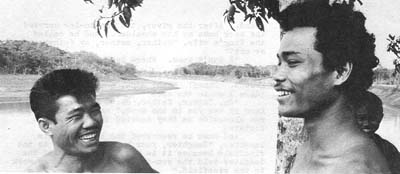
Husen and Juned.
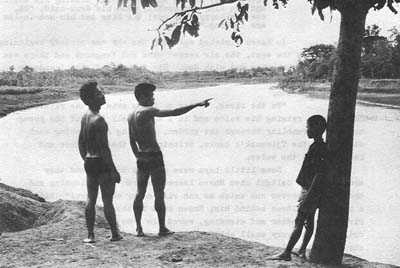
At the Tjimanuk River
“Hey, where you come from?” called a tiny little boy.
Husen shouted back in a low, gruff giant’s voice, “I haven’t village. Can I sleep in your house?”
“No, no,” the children all shouted back. “We’re afraid you’re a tjulik (a bewitched man who decapitates little boys) or a giant!”
“Oh, if I cannot sleep in your house I will bring you to the center of the river where it’s deep.”
“Please,” the tiny boy dared him. “Come on,” the others shouted.
Husen dove underwater and the children shrieked again and ran behind their mother, clutching at her sarong. He surfaced closer to them and standing, called once more, “Awas! Watch out! I’ll carry you away to my village.”
“I’m not afraid,” retorted the tiny boy, adding as if proof of his courage, “I go with my mother to the market in Djatibarang.”
Husen dove again and this time emerged out of the water with a great leap and splash sending all the children running past their mother and up the riverbank. “Hai! Hai!” he called, laughing and then turned back to join his friends, who were already drying off again.
The sun now made its appearance on the treetops of the opposite bank and in the blue distance Husen could see the faint outlines of the sacred volcano, Mount Tjiremai, fifty miles away. As he watched a broad streak of yellow light slipped through the banana trees, glittered across the river water, rose up to touch the bank on his side, and suddenly the entire green landscape cast aside the grayness of dawn and sparkled with dew. His friends hurried home for their morning tea and something made Husen look sharply up the bank to the pathway above.
His wife, Karniti, was waiting there. “When did you come?” she asked.
“Last night. You were across the river.”
“Yes. I’m sorry. I took my mother some tea and sugar.”
“You don’t stay there, Kar.”
“I wanted to see my parents, Husen.” She paused. Although nineteen, Karniti looked even younger; with her delicate features and gentle, bell-like voice, she seemed almost a child.
“I was watching you with that little boy, Husen. That’s how our son would have been.”
“Kar, you don’t speak like that.”
“One of your mother’s kittens died yesterday. It was sick and lying by the fire. I looked to see if it was breathing and it was. But I looked again a few minutes later and it was dead already.”
“When?”
“Last evening. I was making food and all the kittens came and I looked and there were only three.”
“If it was already dead its mother would come and protect its body.”
“Yes,” Karniti turned her face away and looked into the distance, far down the river. “You maybe have another girl again?”
Husen sighed. “No, I got here late yesterday. I had to wait a long time for a bus and we sat up all night telling stories. Ask Djuned. So I am only sitting in front of the house, speaking with my friends there. No. I haven’t another girl. Why, every day in Djakarta I am only going to drive the betjak and finish and go home. I never look at anyone else. Why you think always I am having another girl?”
Karniti was facing him now and Husen could see she had tears in her eyes. “Oh, Husen, I want to sell something in the village. I want something to do.”
“Why you not wanting to go to Djakarta with me? I must go there to make money. Now we have a better room there too.”
Karniti didn’t answer.
“Okay, what do you want to sell?”
Her face brightened and she spoke as if she had had the words on her mind for some time. “I would like a small warung or shop by the street to sell cigarettes and ice and food.”
Husen could think of nothing to say for a minute. Then he broke the silence. “Better you going to Djakarta.”
But she had turned away again.
“Okay, Kar, waiting,” Husen said gently. “Maybe I’ll have money next time.”
Karniti took a few steps away from him and leaned against the trunk of a low palm tree. “In Djakarta, I have nothing to do. I’m getting older, Husen. Perhaps I could make my life better. I want to take a new step, to build a new life.”
“I know, Kar. I know.”
Husen fumbled for words. “Actually, I, too, am in trouble and I’m confused. My son by Taminah is seven now and I’ve got to find money for his circumcision ceremony. And he’s growing up with all those gamblers and whores in Bongkaren (an area of prostitution in Djakarta) and doesn’t even go to school.”
“Bring Rustani here with us. I’ve asked you to bring him many times.”
“He won’t leave his mother. You know how he cried all the time when we brought him before, even when we had much rice and mangos.” He paused again. “And I have my own life to worry about. We haven’t the money, Kar. Wait for some time.”
Karniti said in a toneless voice, “Better you go work the fields now, Husen,” and she turned and moved quickly toward the house.
Husen watched his young wife retreat through his father’s mango orchard, feeling slightly resentful over her increasingly frequent accusations that he was unfaithful. He wondered if she was getting too deeply involved in the life of the village. He even allowed the suspicion to cross his mind that she had found someone else. It did not occur to him that it had been more than three years since their marriage and that ever since the loss of their baby, Karniti, who loved him very much, was desperately afraid of being childless.
Husen
“The betjak ‘boys’ are Indonesians in their twenties or thirties who will probably die young.”
(Louis Fischer in “The Story of Indonesia”)“A betjak driver is like a buffalo. A buffalo is kicked by a man but a betjak driver is kicked by money.”
(Husen’s father)
As a young landless peasant, Husen’s father had ambitions of educating his children. He had carried a heavy load of bananas into Djatibarang to sell in the marketplace each evening after a hard day’s labor in the fields. And over the years, along with raising and selling mangos, sugar cane and srikaya and kadongdong fruit, piece by piece, he was able to buy almost a hectare of fairly good rice land.
But of his nine surviving children only Husen had managed to reach high school. And he had provided the father with one of his bitterest disappointments.
It was in 1955, when Husen was sixteen and had only a year to go to complete a government scholarship at the teachers’ training school in Indramaju, the nearby district capitol. One day the father received a letter from the school superintendent informing him, “Your son has been absent from school without permission for four days. If he withdraws you will be held accountable for the seven thousand rupiahs paid him under his scholarship the past three years.”
To the father, such a sum would have spelled financial ruin and he hastened to Indramaju, deciding along the way to charge the superintendent with full responsibility for Husen’s behavior.
“In one year my son has spent only one month in my house,” the father declared on arrival. “It is the duty of the teachers to take care of the pupils. So it is not my fault if Husen has done wrong.”
“Well, what do you think?” the superintendent asked him. “Should we carry on another year with Husen?”
“It’s up to you.”
“But he cannot live in the dormitory any longer. Your son is a wild boy. He is a bad influence on the other students.”
“I have no money to put him up with a family.”
“Then he is automatically released.”
“Let me see him first.” And the father searched through Indramaju for Husen, finally finding the boy at the house of a distant relative, lying on a mat, smoking a kretek and staring sullenly at a wall.
“Husen,” the father said. “You are not going to school. Why?”
“I am ashamed, father. I failed my examinations in algebra and geometry. I saw the results posted and I ran away. I don’t want to go back, father. I don’t want to see my friends.”
The father was exasperated and angry. “You must go back. You must take that class over again and have double studies next year.”
“No. I won’t go back. I never go again.”
“Why? You’ve gone to school nine years already. One year more and you can become a teacher.”
“No, father. Better I go home to my village. If it is like this, being a teacher, better I am a farmer.”
“We must see the superintendent. He sent me a letter. He wants me to pay back the seven thousand rupiah of your scholarship.”
“You must say like this, father. You tell him I am like out from this school and the teacher must expel me. If the school throws me out, we won’t have to pay back the money. Only if I go voluntarily, then we must pay. So we go and talk to the superintendent. Okay, father?”
The older man didn’t know what to say. He had had such high hopes for Husen. And now this. “All right, if you like, please. It’s up to you. If you want you can become a stupid boy. But if you like to become a clever man and be high peoples you must return to school. Then you will not be like other peoples in the village. You’ll have a good job, good work. Only matjul, hoe in the fields, with fountain pen. You will not be tired like a farmer. You will only sit and write and wear white clothing.”
But Husen had rolled over on his side and refused to speak again.
At home his mother wept. “Where did you go those four days?” she cried.
“I don’t know. I am going to everywhere.”
“If you didn’t go to school, why didn’t you tell us? Why didn’t you let us know? You should have told us. Do you like to condemn yourself to a life of hard labor? Always be tired all your life?” And she began weeping again.
Anguished, Husen lashed back at her. “All right! If my parents are all the time angry with me, all the time shouting at me, I will go away. I want going to everywhere, to see many places, to make many friends in my life. I not want to be teacher, always books and papers, quickly become old. I want to see everything, to try everything in my life, mother. I want going away.”
“Oh, Husen,” the mother cried. “You won’t listen to your parents. Don’t you even believe in God?”
“Where is God? I don’t know. Maybe in myself.” And he stormed outside. But instead of running away, Husen stayed home and worked hard in the fields. His father told him, “All right, son. If you like being a farmer, all right. But you don’t be lazy. You will learn to work hard in the garden and the fields.”
So for a month Husen did hard physical labor for the first time in his life and fell exhausted to sleep every night. And as the weeks passed he thought to himself, “If I stay a long time in the village it is not good.”
One evening Husen was sitting idle at a village tea stall when a youth from Djatibarang, Supardi, who had prospered selling rice in Djakarta, approached him. Supardi, although only eighteen, wore silk shirts, trousers, black patent leather shoes and stockings, a rarity in the village.
“Hello, hello, Husen,” he grinned. “Didn’t you go back to school again?”
“No, finish. A long time already. About two months ago.”
“And where you work now?”
“In the rice field.”
“If you always work in the fields, you’ll quickly be an old man.”
“Why?”
“Because, yah, farming is hard work. And if you stay in the village all the time you won’t know so many friends from everywhere and you must all the time work hard. Better, if you like, you come to Djakarta with me.”
And Husen thought to himself, okay, better go to Djakarta. If stay, I see only one village in my life.
In the coming days, Husen and Supardi became good friends, going to all the surrounding villages at night to see shadow plays, sandiwara dramas and flirt with girls. At first Husen was ashamed to have no money but Supardi never seemed to mind paying for everything and gradually this was accepted and the two laid plans for going to Djakarta.
Husen worried a little about telling his parents and one day declared to his father: “I want going to Djakarta.”
The father, who had watched Husen do less and less work and spend most nights away from home, had feared this was coming and told his son, “Do you know Djakarta? What work would you do over there? You do even have any relatives in Djakarta. Better you stay home with your family, son.”
“No. I go with friends.”
“With who?”
“With Supardi.”
The father was silent for a long time, thinking. Then he took Husen’s right hand in both of his own and said, “If you want to go to the city, go ahead with my blessing, my son. But I want promises from you, promises that you must never break in the long years ahead.”
“Yes, father.”
“First, you must be a good man. You don’t be a thief, you don’t rob and you don’t become a pickpocket, even if you have to starve. Second, you don’t forget your parents. If you have money, you must help your parents. And third, you must look for many, many friends in Djakarta. The city is dangerous but if you have many, many friends it will help you. I hope all goes well with you, my son.”
“You have money, father? To go by train?”
The fare was eighteen rupiah and his father gave Husen thirty. In this way, Husen first went to Djakarta. He and Supardi found a place to stay near the Hotel Duta with a shopkeeper from Tegal; a bamboo shack consisting of three cubicles with earthen floors. In one the shopkeeper and his family slept, keeping their meager possessions, a pile of neatly-folded batiks and soft-pressed shirts, in a small trunk. The second was a tiny kitchen, only a pot on a primus stove, a bag of rice and vegetables in a basket and in the third, Husen and Supardi slept. The shack had no electricity; small coconut oil lamps were used at night. There was also no water – Husen had to bathe, relieve himself and do his laundry in a nearby canal. There was no place else to go. Accustomed to the privacy of a banana leaf privy at home, Husen would never quite get over the shame of having to defecate in full view of others in the canal; fifteen years later as a betjak driver he would often pedal a considerable distance to find a vacant grassy lot or grove of trees where he could answer the call of nature unseen.
But he also found most of the peasants who came to seek work in Djakarta, often with good stone or bamboo houses set in orchards at home, lived as he did. And gradually he became accustomed to the pall of smoke from cooking pots in the back yards, the mile after mile of little alleys snaking through densely-packed huts of straw, crumbling brick or beaten tin cans, the endless little stairways on the canal banks carved from mud, the potholes, the rubbish along the pathways, the skinny chickens picking in the dirt, the multitudes of nearly naked children, hair matted, spindly legs with the open sores of yaws or scabies, the pathetic lines of rags and torn garments strung up to dry. And these were not the worst places; deep in the city were dense, filthy holes where yellow-powdered, lice-ridden prostitutes could be had for a few pennies, where pimps and addicts could be seen smoking opium and morphine and ganja from early morning on and where in sudden moments of frightfulness, pain, loss and terror, life could end with a dagger in the ribs. But gradually Husen, like other rural immigrants, got used to the infested shacks, the rats in the yards, the bugs falling from the broken atap roofs, the floods of muddy water in the rainy season and the sour smell of bitter poverty that seemed to pervade almost every aspect of his new life in Djakarta.
Within a month, Supardi had disappeared. He had borrowed fifty thousand rupiah from merchants in Djatibarang but he never again appeared in the village. Husen, who helped his landlord with his small shop in exchange for rice while he searched work, only knew he left one morning and never came back. People said, “Supardi is dead.” His parents came to Djakarta looking for him and even went to the police. At that time, the Darul Islam Moslem rebels were fighting the Indonesian army in the forest not far from Husen’s village. Some said that Supardi had been taken away by the Moslem guerrillas and forced to join them and was later killed in the fighting. But no one ever knew for certain.
In the days after Supardi’s disappearance, Husen, unable to find work and completely without money, feared he might have to return home. Then one day a betjak man who came by the shop every day for tea, asked Husen if he still had his school license, “a Bombay man, Mr. Tarachand” needed someone. He took Husen to a tiny office near Pasar Senen, Djakarta’s central marketplace, which had an imposing sign in English over the door: “Tarachand Trading Company and Krishna Limited.” Mr. Tarachand, it turned out, was a thin, bespectacled, gentle little Indian who made a precarious living importing saris from Calcutta and selling them to local shops for Djakarta’s small Indian community. The office consisted only of a desk, typewriter and a small desk for Mr. Sital, Mr. Tarachand’s Indian secretary.
Husen, who wrote his father, he had got a job “as a clerk with a Bombay firm,” actually was a servant and errand boy. Each day he bicycled with “Bombay food” from Mr. Tarachand’s small house across Djakarta to the office; he also ran messages, carried mail to the post office and dusted the rooms and swept the floor in the Tarachand house on Pasar Baru.
It was this last task that got him into trouble and ended with Husen again, after seven months, finding himself unemployed.
Mr. Tarachand’s wife was as fat, ferocious and ill-tempered as her husband was thin and mild. To Husen, she always seemed angry. “Why you come late?” she would shriek. “Trouble with the motor car. Very many trouble in the street. Many cars and so on,” Husen would say humbly with the hint of a wry grin on his face. One day Mrs. Tarachand told Husen, “You make clean the rooms while I prepare my husband’s lunch,” and she proceeded to squat down in her sari in the kitchen and flap chapattis on and off the fire.
Husen started vigorously dusting and singing to himself and when Mrs. Tarachand came back she found him absentmindedly but very zealously rubbing the face of her cherished portrait of Mahatma Gandhi with a dirty rag.
“Aaaaggggh!” screamed Mrs. Tarachand, moving her round sari-clad figure across the room with surprising speed to snatch the rag from Husen’s hand. “That is Mahatma Gandhi! Don’t you do like that! Ee-e-e-e-e! You have left a dirty smear right across his nose!”
As Husen chuckled to the shopkeeper that night, “Wah! I think, ‘maybe is a god.'”
For some days Husen found work as a gardener and then, borrowing a betjak from a neighbor, began the labor one evening that was to be his for most of the next fifteen years.
His first passenger was a woman who wanted to go from Harmonie to Djalan Thamrin, a short distance; she looked at Husen doubtfully when he pedaled up to her, “Are you really a betjak man, son? You look like a student.” Husen was almost afraid to answer. Indeed, he still felt much like a schoolboy and felt not a little ashamed to be driving a betjak, something he had never expected to do.
Only a few nights afterward another passenger, this time a man, also seemed reluctant to take Husen’s betjak. Once they were underway he asked Husen his name and said, “You are too young to be a betjak man.”
“Sir, I have to do something. To support my life here.”
“You are still a school boy, I think.”
The man, a middle-aged Javanese, asked to see Husen’s papers and seeing he had had nine years of school, abruptly offered to finance Husen’s further study. Husen was too confused to answer but after they reached the passenger’s destination he was told to wait outside. Soon afterwards another man came out of the house and, looking Husen over, called back, “Oh, is this the boy?”
“Yes.” answered a voice inside.
“Oh, if so, okay,” said the other. “If he wants to continue his studies, we’ll finance him.”
In a short while the original passenger came out again and asked Husen to take him to a different house. On the way he introduced himself as a schoolteacher. When they reached his house, he invited Husen inside and served him coffee, saying, “You can stay here and sleep with me If you like.” Frightened, Husen fled to his betjak as the man called after him, “Come back tomorrow.” In retrospect, Husen could never be sure whether the man – who had the thick lips and hard, cruel mouth of a sensualist, peculiar for a schoolteacher – had really meant to help him or not. He shrugged and told himself, “My brain can’t handle more studies anyway.”
Husen drove the betjak almost a year and then, for a time, drifted from one job to another, first as a construction laborer, then as a knek or truck driver’s helper at Djakarta’s harbor, Tandjung Priok, and finally, for nine months, as a garbage-removing coolie for the city’s public works department. This last – filling baskets with rotten, sticking refuse, sodden with mud, filth and germs and loading them on the truck – was perhaps the low point in Husen’s years in the city. But one soon got used to living with the all-pervasive stench, which clung to Husen no matter how many baths he took so that even his food tasted of it. And the driver shared the illegal profits he made by selling the garbage to farmers on the Bogor Road instead of delivering it to the city dumping ground.
Husen was now eighteen. An older sister, Karlina, had come to Djakarta to join her husband, who ran a highly profitable general store in Bongkaren, one of the city’s most notorious centers of gambling, prostitution, narcotics and vice. One of Husen’s fellow garbage-removing coolies lived nearby in Bongkaren, an older man, and one night at Karlina’s store he met his daughter, Taminah.
Taminah just missed being beautiful. Tall, fair and fine-featured, there was a hint of bitterness and toughness about her, perhaps because of her father’s low social status which meant it would be difficult for her to make a good marriage. Two weeks after they met, Karlina told Husen, “If you want to marry, take that girl.”
The ceremony was at her father’s house, a bamboo shanty, really, on a narrow lane in the center of Bongkaren. Karlina arranged everything. Husen’s own parents did not come for the wedding. He wrote his father, urging him to come but received back only a terse, one-line message, “If you need money for your marriage, ask your sister or brother-in-law.”
After the marriage, Husen returned to betjak-driving for good and for almost seven years he and Taminah were happy, first, living with her parents and then finding their own small, two-cubicle bamboo house not far away. After two years, a son, whom, they called Rustani, was born and after six years, Misri, a baby girl.
The future looked promising. Husen’s father-in-law, who had risen to a driver in the public works department, was able to find a job for Husen in the car pool. It meant he could leave betjak driving and learn to drive a truck.
And then the sores came.
At first Husen hardly noticed the inflammations on his thigh. [Note: Although he did not know it, Husen was suffering from francosia or “yaws” caused by a protein and vitamin deficiency.] And then they grew and grew until there were four boils the size of a fist, red and swollen, spreading up his right thigh to the small of his back. The whole area was red and swollen and made anyone shudder to see it. Finally, the day came when he could no longer go to work. He was badly sick. His clothes hung on an increasingly thin body and his eyes grew inflamed and watery and sank into the hollows of his cheeks.
One morning, after a night of feverish fitful dreaming he awoke and looked over to the balai-balai where his wife and the baby girl slept and saw it was empty and stripped of its covers. Husen staggered to his feet and went to the trunk where his wife kept her clothes. They were gone. The tiny kitchen was bare. He lurched to the door, opened it and stood staring out at the bright sunlight like a drunken man.
“Where is my wife?” he called to a neighbor.
“She’s gone to her parents,” a woman called.
“She’s a very bad wife,” the neighbor said indifferently. “When you are well, she is kind with you. If you are sick, she is going.”
In his fever, Husen tried to say something, but his voice, quavering with agitation and despair, was lost on his trembling lips. Ashamed at the spectacle he must be making, he backed into the house and slammed the door. Then as if he had come to the end of his strength after he had done this, every part of his body shook, his teeth chattered and tears streamed from his eyes. Then he fell unconscious to the floor.
For seven days and nights he lay there. His whole body was consumed by fever. The boils and his thigh and back caused incessant pain and every so often he would mutter, “La illa hailallah – la illa hailallah” (“there is no God but Allah) and then moan with pain. He didn’t eat, he didn’t defecate. A neighbor, who thought he was dying, left a tin of tea for him and this he drank, afterward crawling into a corner of the room to make water.
When the high fever attacked him, he often had nightmares and imagined the little room was filled with setans. He cried aloud, “Aduh, Taminah! Help! Help! Taminah!”
On the seventh morning his fever subsided considerably. He woke up and listened to the crowing of a cock. He watched the sun’s rays try to creep through the cracks of the decrepit, darkened bamboo wall and he decided to kill himself. Delirious, filthy, he crawled around the room trying to find the means and dragged himself up to his knees at the table. There were two full packages of aspirins Taminah must have bought before she left. Shuddering all over, his hands shaking, Husen swallowed twenty-four, then vomited them back up all over himself.
He fell back on the floor in a high fever again. “La illa haiallah waashaduana Muhamadrasullullah!”[“There is no God save Allah and Mohammad is his Prophet!”] he gasped and then cried in a louder voice, “Aduh, Gusti, forgive, Gusti, aduh Gustiiii!” [“God, in animistic Javanese]
His vision cleared and he looked at the room about him. A room with plaited bamboo walls he had pasted over with old newspapers and whitewashed, now already torn in several places. An old mat on an earthen floor, two bamboo sleeping benches with a thin mattress on one. A worn rattan chair, a table with two dilapidated wooden chairs. A cupboard now empty with the doors hanging open.
His eyes blurred with tears and vaguely, vaguely, somewhere floated visions of life continuing, somewhere far away there was the crying of a little baby, a small house, a small plot of ground, he and Taminah. But all this was finished now.
It’s my fate, Husen thought. I am going to die in this room. And suddenly he longed desperately for the village. Just to smell the freshly hoed earth again and be sprayed by the falling rain, to walk at dawn through the morning glories, the dew wetting his feet, to feel the morning sun warming his body, to swim once more in the river, to eat a cucumber plucked from its stalk, to sleep on the grass under a mango tree. Tears stood in his eyes, when all at once he was shocked into consciousness by a hand on his shoulder and his sister’s voice calling to him, “Husen, Husen, it is me, it is Karlina!”
She had him carried home and washed him in hot water and called a doctor, who pronounced Husen’s condition as “very dangerous” and gave him large injections of penicillin and some sedatives. After two weeks Karlina arranged for him to be sent back to the village on a freight train as he was still unable to walk.
But Husen did not make the expected recovery. Instead, for four months he lay in a semi-darkened room in his father’s house, steadily growing more pale and thin. His left leg and foot began to shrivel up and his parents called dukun after dukun, but their herbs, massage and magic potions were no more successful than the Djakarta doctor’s modern medicines.
When news of Husen’s failure to recover reached Bongkaren, it was recalled that a year before the father of a certain Tjarti had hoped Husen would marry his daughter and Husen had jokingly replied, “I cannot marry two wives; I can barely support one.” A theory was surreptitiously advanced that Tjarti’s father had gone to a sorcerer and that Husen was the victim of black magic.
Eventually this theory reached the village and Suleman, a neighbor of Husen’s not known to practice witchcraft, one night came to Husen in the darkness. “I want to try and help him if I can,” Suleman told Husen’s father. “Maybe I can help him.”
He took a glass of water, spoke some words over it so low Husen could not hear, spat into the water and then told Husen to drink it. “I was saying a prayer from the Koran,” Suleman told Husen. “All right, Husen, if you recover, it is not I but God who makes you well. But maybe I am his instrument. I am not a dukun, only a simple peasant. Please, this water drink. If you are a good man, if there is good in your heart, you will get well. You will rise and work as before.”
“Yah,” Husen muttered weakly, holding the glass to his lips.
Suleman continued, “And if another man has put a magic curse upon you, may the curse go back to him, he who made you suffer.”
Husen swallowed the water. Four days later the boils burst and white, yellow and red matter, oozed out of them. After a week, Husen could walk but with a bad limp and like a crippled man.
He thought to himself, as he grotesquely hobbled around the garden, “I will never go to Djakarta again, not like this.”
His mother called in an old lady, a masseuse; she was an old, bent-over crone who cackled when she saw Husen and said, “Oh, this is very nice boy. Sorry sick like this and not good again like before. Very sorry. And if I can make him walk like a strong, young man again, I’ll make this boy my son. You can call me ‘mother,’ Husen.”
The old lady came every day, riding an ancient bicycle from her nearby village. For some days, Husen continued to carry a wooden stick and hobble about like a crippled man. He was ashamed, and embarrassed and never left his father’s orchard. And then within two weeks he found he could walk normally again.
One day a man came from Djakarta, an acquaintance who also stayed in Bongkaren. “Already good, Husen?” he asked.
“Oh, yah.”
“Tjarti’s father died you know. Terrible it was. He had swelling and sores all over his body, his face as well. He is dead now.”
Husen said nothing. But he thought of Suleman, his simple neighbor and his words, “If you are an evil man, I cannot help you. But if you have been kind and good, I can help. And if somebody made you like this, may the trouble go back to him.”
“And Husen,” the man went on, “I suppose you’ve heard your little girl is very sick. Influenza, they say.”
Within a few hours, Husen was on a bus to Djakarta. He found Karlina very angry now that he was well. “Why did that woman leave you? Why? Why? And why did you come back? To drive a betjak? Stop driving a betjak, Husen. All the time you have been nothing but a betjak driver. Make something of your life now that you have one again.” Husen did not understand Karlina’s anger which was to last for years to come so that he came to avoid seeing her.
“Karlina, I want to see my baby.”
“Oh, you’re not looking for the baby. You’re looking for the mother. Why, Husen? I am not like you go back to her. When you are sick she left you. Why you go back to her now?”
Husen arrived at Taminah’s house just as Misri, his baby daughter died of fever. He carried the infant to the cemetery and buried it and did not return to Bongkaren for a week. When he did it was to inform Taminah he was divorcing her.
For two years Husen let himself go, parking his betjak outside the Hotel Indonesia and gambling, drinking and chasing girls the rest of the time. First there was a djoged (classical Javanese dance) dancer from a sandiwara troupe and then a rice seller from Djakarta’s Djatinegara district. Whenever there was a Javanese pesta, a stag drinking party with a prostitute or two for dancing, Husen was sure to be there. He was popular, a daring drunk who would defecate over a crocodile infested river, simply pulling down his pants, grabbing the stilts of a house and almost touching the water as his companions shouted, “Husen, quickly, get up!”
“Not afraid of many crocodiles,” he would roar back. “You don’t spare one hair off my head, Crocodile, you! Must eat all of me!” Then he would go to sleep in a chair or vomit and go back to the party and drink some more visang, Javanese whiskey. Sometimes he would go to two or three pestas in a week, or stay up the other nights crouched over a gambling game or slip off to one of the taxi girl areas.
In this way he was almost oblivious to the great political upheaval that was shaking Indonesia and which would claim at least a third of a million lives. On the night of September 30, 1965, when the late President Sukarno drove up to the Hotel Indonesia to fetch his Japanese wife, Dewi, from the rooftop Nirwana Room, Husen was drinking tea at a stall behind the hotel missing what was to be a curtain raiser to history. Husen only learned of the abortive Communist coup d’etat five days later when reading about it in an old newspaper a passenger left behind in his betjak.
Once, daring a visit to his village, Husen saw a crowd of young men gathered in the streets of Djatibarang. He didn’t know why and hurried on, not wanting to know. Later he heard Moslem youths had killed more than twenty Communist party members in Bojong village, just across the river. Others, it was said, had been taken to jail in Djatibarang and from there to Indramaju. Husen assumed they must be guilty persons but admitted he had no way of knowing. He heard they were taken to a concentration camp, that they were fed and given work building irrigation canals and houses, and got a kilo of rice each day. Later they returned to Bojong and resumed their lives; there was no more killing or revenge.
Husen told himself, a betjak man is lucky because people think he is dull-headed and don’t speak to him of politics. I will only look for money and not to this side or that side.
And then, in the summer of 1967, it was as if a page had turned in Husen’s life. It happened one evening in Pasar Senen, the teeming, noisy central marketplace that seems the very heart of Djakarta. Husen stopped his betjak by a small street stall for a bowl of chicken soup and some krupuk, a delicious pretzel-like cake made of rice dough and shrimp paste. A very young girl handed it to him and for a moment their eyes met and she laughed with embarrassment. It struck Husen as an infectious happy sound. He came back every night after that until she began joking with him, “You must like chicken soup and cakes. You’ve eaten nothing else the last ten days.”
He asked who she was and learned she came from Karanggetas Village, just across the river from Pilangsari. She was temporarily staying with an aunt in Djakarta, and, although only sixteen, had already been briefly married. It was said Karniti had asked for the divorce after she learned her husband was seeing other women.
Husen located the former husband, a handsome youth of nineteen and asked him, “Is that your wife who sells soup in Pasar Senen?” When he said it was Husen asked, “Are you finished with her?” Getting an affirmative reply he went to Karniti and asked, “Kar, are you already finished with that boy?”
She only laughed and watching her Husen felt the breath of life storm through him, and he felt happy and confused and thought, I don’t know. Maybe God has fixed. I am twelve years older, I don’t know. Because I love this woman.” To Karniti he put just three words.
“Do you want?”
They were married in the village that September.
Pa Lojo And The Sandiwara Troupe
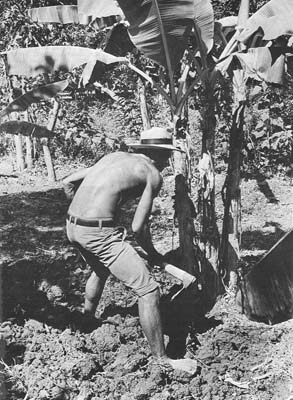
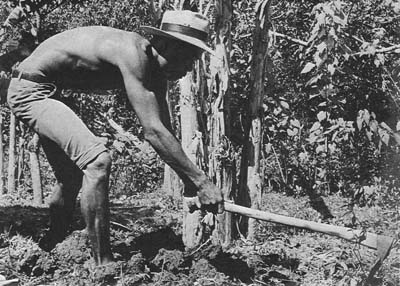
Husen works with a patjul, the short-handled, broad bladed hoe that is the most important tool in Java, in one of his father’s banana groves in Tjibanteng garden. He is turning over the rich volcanic soil so that it will catch and hold the water when it rains.
Between eight and nine o’clock in the morning.
It had rained in the night but now the sun shone and each flooded rice field was a golden mirror, with its shimmering face to the sky; hundreds of them, stretching eastward between the road to Tjirebon and the mango and banana orchards of Tjibanteng Garden as far as one could see. In the mirror two near-naked peasants, Husen and his brother, Tarja, muscular, sun-bronzed, glistening with sweat and ankle-deep in mud, stood bent over, swinging their patjuls to break up the clods of black volcanic clay. Ahead of them an uncle, conical sunshade on his head, guided a wooden plow drawn by two fawn-colored cows. Along the pathway by Tjibanteng Garden, the lavender blossoms of the kangkung welanda were just beginning to fold up in the sun’s rays and they still sparkled with dew. The voices of women and children drifted up from the banks of the brown, sluggish Tjimanuk River; Tjiremai Mountain was just visible in the faint blue distance.
Husen worked hard; there was still a morning freshness in the air and not a hint of the oppressive, smothering heat that would force them to stop at noon. To Husen, the whole landscape seemed to be sparkling and glittering with dew and sun and he listened to the croaking of an angry frog, a distant train whistle and the song of birds from Tjibanteng Garden: the coo-coo of the derek bird, the nervous twittering of the tjitji, the drop in pitch of the kepudang and the complaining call of the ketilang.
A betjak came hurrying cheerily along the road, its bells jingling, gong clanging. There was the whisper of a breeze from the Java Sea six miles away. The breeze carried the voice of a girl singing, somewhere far, far away, just a snatch of song.
On the road, long chains of women passed carrying on their heads sheaves of rice, vegetables and fruit for the market in Djatibarang. There was the tinkle of a pony cart’s bell, a procession of silently passing bicyclists and, in the blue distance beyond the road, little figures walked along the dikes, hoes and perangs on their shoulders.
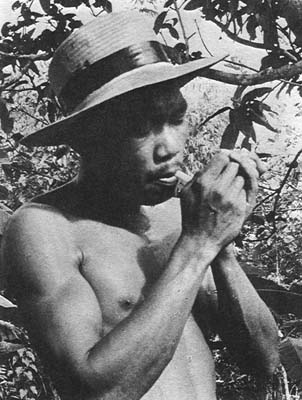
Lighting up a crackly, clove spiced kretek cigarette
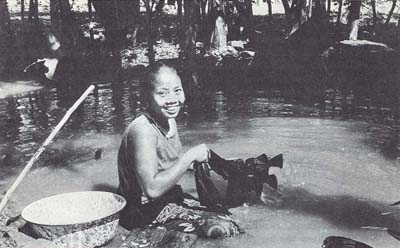
Karniti washes clothes.
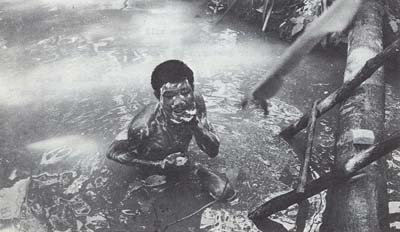
Husen takes a bath.
A group of little buffalo boys came along the garden path, chattering incessantly and aimlessly prodding their charges with green switches, eight huge black water buffalo. The heads of four of the boys were hidden under tattered, shapeless old men’s hats but a fifth wore a cone of red-painted bamboo; he looked like a bright red mushroom walking. The buffaloes had no pasture to graze in – land was too scarce and valuable in Java – and they roamed the lanes between the gardens, riverbank and rice fields all day munching on grass and tangal weed along the way.
Husen listened idly to the high-pitched, excited little boys’ voices.
“I took these baby birds out of a Glatik’s nest.”
“They’re alive. Be careful you don’t crush them.”
“Oh, the buffaloes. They like to go home.”
“I want to ride on a buffalo.”
“Be careful. Dangerous.”
Tarja, hearing the boys, went over to see the baby birds. When he found the boy had stuffed them back into his pocket and one was dead, Tarja became agitated and angry, “Bad boy, Parjono, why did you kill that bird? Throw it down. Throw it down in the bushes. You are a bad boy, Parjono.”
The other boys began singing and throwing rocks at the river.
Oh, small house is many men kill boy
In big house many thunder
“Hold the other gently, with your hand, okay?” Tarja was telling the bird snatcher.
Three girls arrived to weed in a nearby field. Husen shouted to them, “Don’t just sit girls. Work. May I accompany you?”
The girls giggled, “Yes, you may,” one called back, as her friends struck out at her in mock protest. “C’mon, Husen.”
“But I’ll have to join right in the middle of you!” The girls laughed and turned to their work.
The buffalo boys were now chasing yellow dragonflies and looking for the frog which had been croaking angrily from a nearby paddy. “He’s praying for rain,” Husen called to them.
Then one boy picked up a black ant. “Hey, you can make them fight each other,” another shouted. “Take a black ant and a red ant.”
The buffalo boys crouched down in a circle on the path, exclaiming with excitement.
“Let me pull out his feelers.”
“A red ant can beat a black ant.”
“Find another one. This one’s dead.”
“They bite each other. Trus, trus, c’mon, let’s go, blackie!”
“Oh, this one bites the others back.”
“Is that one lost? Oh, the red one lost.”
“That one is die. Innalillahi wa. Innaillaihi rodjiun.”
“Wah, the black is outnumbered.”
“Attack, kroyok!” [when several attackers gang up on a single victim]
“Quickly, quickly!”
“Look at this one. Very sick this is.”
“This is a woman one.”
“I want go home,” the red hat suddenly announced. “Okay, c’mon, let’s go. Let’s go, let’s go,” chorused the others, tiring of the ant battles.
Husen watched them go and looked at Tarja, who worked fast and angrily. Tarja, a simple soul who still was not married at 27, was strong and did the work of a man. But in many ways he seemed a child himself, although he was not cruel like these children.
“Accch!” Husen groaned aloud. “If you are a betjak man and you switch to using patjul, you need a massage.”
Just then a rickety old truck came up the road from the direction of Djatibarang; overloaded with tarpaulins, scenery flats, trunks, electrical apparatus and at least thirty youths and girls, seated on top of the load, the trunk strained and shuddered and Husen half-expected it to steam to a collapse right there. Atop the cab itself an old man sat, incongruously dressed in a felt hat, black suit, and tie. Husen recognized Lojo, the popular sandiwara comedian of the Tjirebon region and, as in a reflex action, laughed and shouted, “Hello, Lojo! Arep mrana? You want going there?”
The old man shouted back, “Tunggo nana yah, Husen! Yah, yah! Waiting there okay!” He said the troupe would perform in the nearby village of Kliwed that afternoon, a slametan at a rich farmer’s.
The farmer was a distant relative of Husen’s, his mother’s cousin, and as he watched the truck crawl slowly down the road, Husen decided to bicycle there that afternoon for the performance, and perhaps invite Lojo to his house for the evening meal.
Husen loved the theatre; there were many sandiwara or dramatic troupes in the Tjirebon region of Java but few could equal Lojo’s in popularity. It performed at weddings, births, circumcisions, harvest celebrations, supplication of a spirit or whenever someone wanted to give a slametan and could afford the twelve to thirty thousand rupiah Lojo’s troupe charged depending on the circumstances.
With the exception of Lojo himself, who was a professional actor, the rest of the troupe were farmers, soldiers, perhaps a clerk or two and their wives and sisters or village girls who welcomed the opportunity to sing and dance before an audience. There were forty-two plays in Lojo’s repertoire and since most of the plays were familiar to the cast, who specialized in the roles of generals, soldiers, kings, heroes, heroines and villains, there were almost no rehearsals and usually the troupe did not know what play they would perform until an hour or so before certain time.
As a youth, Husen had acted in the sandiwara himself, not in a leading role but as a soldier who did the pentjak, a half-dance, half-fight in which two men strike viciously at each other with their hands and feet, sometimes even wielding knives, but withdraw their blows at what seems the last possible moment so they do not land. They throw one another to the floor, the victim cooperating in exact rhythm with the attacker; they leap around into formal poses, turning sharply toward and away from one another. All the while the sandiwara’s orchestra beats drums and the audience shouts. Husen loved it. To him it seemed to have the beauty and excitement that came from the thinness of the line between art and life, the shouting and grimacing that seemed as if any moment it could break out into actual combat, but never did.
So Husen, with his friend, Juned bicycled to Kliwed that afternoon. But before they could go backstage on the wooden platform his relative had constructed for the drama, he was asked to attend the slametan his “uncle” was giving for his son’s circumcision or what Husen called “cutting the pipe.”
Anthropologists usually call the slametan the basic core ritual of Javanese society. A brief communal feast, it symbolized the mystic and social unity of those taking part: friends, neighbors, local spirits, fellow workers, relatives, dead ancestors and near-forgotten gods, all bound, by virtue of their commensality, into a defined social group pledged to mutual support and cooperation. It has been described as “a kind of universal social joint” [by Clifford Geertz, the American Anthropologist] fitting varied aspects of social life and individual experience together in a way that minimizes uncertainty, tension and conflict. To Husen an abangan, or traditional peasant in most of his views, such ceremonies made him “slamet,” a state he described, as “Gak ana apa apa,” which meant, “Nothing is going to happen to anyone,” that he was, for a time, free from harm.
This day Husen and Juned were shown into a room in his uncle’s large stone house and were seated on bamboo floor mats. The room was filled with the scent of burning incense and men continued to arrive to make a small circle around some specially prepared food already laid out in the center.
Husen’s uncle spoke after everyone was seated, expressing his gratitude for their attendance. He regarded them, he said, as witnesses to the purity of his intentions in having his son circumcised and said he hoped they would share in any benefit the ceremony brought. Then the village modin or Moslem priest began chanting a prayer from the Koran.
Husen and all the other men sat with their palms upward, and their faces lifted as though awaiting a gift from God. At each pause in the modin’s chant, they uttered “Amen,” and when he finished, they rubbed the palms of their hands on their faces as if awaking from sleep.
Each was then given a cup of tea and a banana-leaf on which were serve roasted fish and chicken and rice porridge. When everyone was served, Husen’s uncle bid them eat. Husen scooped the rice and meat up with his fingers, eating hurriedly and quietly for less than five minutes, then joined the other men in asking if he could “follow my will” and depart. Most of his food was uneaten and he and Djuned wrapped it in banana leaves to take home. The entire ritual took less than ten minutes.
When Husen and Djuned emerged from the house, the drama had already begun and they went to sit near the back of the audience. A hundred chairs had been arranged in a palm grove for the invited guests and beyond a picket fence perhaps two or three hundred people, mostly women and children, pressed forward, trying to see.
A painted canvas proscenium framed the stage and against a crudely painted backdrop, with columns and fountains to depict a palace garden, a man in a soldier’s uniform strutted back and forth.
Djuned passed Husen a kretek cigarette, murmuring, “It must cost more than twenty thousand roops. A party like this.”
“Not enough maybe. More than twenty thousand.” Husen was pleased his relatives appeared so rich.
Onstage a squad of soldiers stood at attention as an actor in a red uniform, cape and crown entered gnashing his teeth and grimacing so grotesquely that the children up in front laughed and called out.
“Oh, this is story about the Kingdom of Siliwangi, maybe,” Husen whispered. “It’s good we came now. If not, maybe not get seat. Where’s Lojo?” A neighbor whispered he would not appear until a second play, in the evening.
“Come, all of you,” the Siliwangi King declared. “Let us serve our god.” An actor seated, cross-legged with a white, painted face and body to resemble a Hindu god was carried onto the stage. “This is our god, creator of the world and lord of the universe. Everything that happens in the universe is done by this great guru, our lord. In this holy place, men don’t think about other things. Put down your weapons and kneel to our god. Ask whatever you want of him because he’s our god.” The King and the soldiers began singing a burlesque of a religious hymn, “Ho, ho, ho, sing for our god; O, our god, give us a happy life, wealth and prosperity; O, our god, give us a long life.” Husen and Djuned joined in the audience’s laughter. The scene shifted to a throne room, where the King heard reports of a new religion sweeping the land. “It can’t be true,” he declared angrily. “My people going to a new religion. We must not let it penetrate our land. If we catch anyone who dares to practice it, bring him here and I’ll severely punish him.”
“All the people like this drama,” Husen whispered to Djuned. “But I think it is special for the people in the village.”
The tattered red stage curtain draws shut, there is a frenzied crescendo of flute, xylophones and drums from the gamelan orchestra up front and another scene began, this time in a bamboo hut in the forest.
“Since Islam came we are getting freedom,” an actor in a soldier’s uniform declared. “During Prabhu Siliwangi’s rule, we never have freedom; now hundreds here in Krawang are turning to the new religion. You get more freedom with Islam. Oh, please, God, help us, especially to get more money, if not me, then other people. But men are never satisfied. If God gives them money they want more and more. And if they get, they begin to forget God.
Husen laughed approval. The actor talked in a sing-song comedian’s voice. Three of the King’s soldiers entered and seized him by the arms and neck but the comedian slipped to the ground, squatted, grimaced and pretended to defecate. The soldiers backed away, holding their noses as the audience roared.
“That is a kind of Urea fertilizer,” the comic declared. “If you get from the government you have to pay, but from me it’s free.” This went down well with the farmers in the audience.
Now an actor dressed as an elderly Moslem teacher entered with his daughter, a tall girl who walked with mincing steps; the orchestra accompanied her hip-swinging walk with drumbeats.
“Ah, a bantji,” Husen said. “That is no girl, Djuned, is queer.”
The Moslem teacher now began to speak: “I come from Malaya. Firstly, I’m a merchant. This one is my adopted daughter. She is the daughter of the king of Malaya. Besides being a merchant, I am also a Moslem. You must try to attract other people to be Moslem. Here I am visiting many kinds of people, rich and poor. I have to choose some method to give them understanding. Religion is not a language or a country. Because I’m Malay and you are Indonesian. There are two kinds of religion. One is created by man, the Trimurti of King Siliwangi. The other is sent by God through his messenger, the Arabs. The language is Arab but remember the religion is not language. Our religion is not Arab but Islam.”
A man in front of Husen turned around, and remarking that he was wearing a black Moslem cap, said he looked like Sukarno. Husen wrinkled up his nose, “He had six wives.”
“What is the name of this new religion?” one of the King’s soldiers asked onstage.
“Islam.”
“What? Aslam? Aslim?” The audience roared. “You know it is forbidden to introduce a new religion without getting a license from the district bali desa and paying a fee.” More laughter from the audience.
A long serious discourse on Islam followed and Husen feeling bored, suggested they walk around. “Ed, I am tired already sitting here.”
They moved through the audience toward the tea stalls outside, catching a glimpse backstage of a bare-chested youth carefully adjusting a long, black woman’s wig on his head. “That one is not woman,” Husen said. “That is queer.” “Where? Oh, like in Djakarta.” “The drummer is very nice. ‘Ed, I want to drink tea. Because I am tired.”
“You have money?”
“To pay I have.”
A pretty young girl served them at the tea stall.
“Did you have enough sugar?” Husen grinned. “This tea is very bitter. My tea is like this girl here. Bitter, I think.”
“Oh, yah, of course,” the girl tossed her head. “I am only a simple village girl.”
“Yah, I know,” Husen went on. “I am high people. My friend is a village secretary and I’m his chief.” The girl, who knew Husen was a betjak man in Djakarta, laughed.
“No, you are only chief of the patjul.”
“No chief of patjul. But that is okay too. If you want to help me in my rice field you can come. Bring tea and food to my garden.”
“All right. If your wife is finished with you. Okay, I can bring food and tea for you in the garden. If Karniti is finished with you.”
“Okay,” Husen told Djuned. “If she comes I give earth, not money.”
“Okay, are you finished, Husen?” Djuned was bored by the flirtation.
“How much for the tea and cakes?” Husen took Djuned’s fountain pen.
“Seventy five roops.”
“Okay, I’ll pawn this fountain pen with you and bring money tomorrow.”
“Oh, never mind if you haven’t money. Tida apa apa. Never mind.”
“No, I’m joking. Here’s a hundred roops.”
“Oh, I know you haven’t money, Husen,” the girl smiled, “But to buy beer, even three bottles, I hear you always have enough.”
Husen and Djuned moved back towards the play, the girl calling after them, “You must come here many times and have tea at my shop, Husen. Maybe you don’t forget me for a long time again.”
As they took their seats the audience was booing the stage. The Moslem teacher had been arrested and given the death penalty. A gallows had been set up and soldiers had just tied a rope around the Moslem’s neck when his daughter came rushing onstage with a scream, “Aaaghghgh! Father, father!”
King Siliwangi, who had come out in the garden to witness the hanging, now exclaimed, “Who is this girl? Who is this girl? Is she a virgin? Ah, she is still virginal. Like a new Honda. O, Moslem teacher, what do you think if I marry your daughter. If she marries me, I’ll set you free.”
The daughter agreed to marry the King, despite boo’s from the audience and a few stones thrown by children onto the stage, but she set one condition. The King must bring her a medallion from Mecca. At this point, the troupe’s manager appeared before the curtain to announce that, since it would be less than an hour until evening prayers at the mosque, the performance would be discontinued but there would be a second drama, with Lojo, that evening. No one seemed to mind since all knew the rest of the story, that King Siliwangi himself would be converted to Islam. It was history.
Husen hurried backstage and Lojo agreed to come for dinner, and they returned to Pilangsari, the old comedian riding on the back of Husen’s bicycle.
Karniti was waiting in the doorway of Husen’s father’s house when they arrived and laughed when she saw them. “Oh, this is Lojo, the joking man from the sandiwara.”
“Because my work is like that, my girl. I must make everybody laugh and be happy.”
“Lojo, I am happy you come here,” Husen said. “Maybe, first, you know my place now. Maybe I am going everywhere, if going to your village, not ashamed to come to your house again. And I think your food over there in Kliwed is not so very good. You have your dinner here, it is better.”
“Yah,” Lojo said, taking a chair inside, “if the peoples not looking at the house, but the kindness inside, it is better. If big house also, but not kind, I not like to go there. If people are kind, I can also be friendly. Yah, I come here, Husen, because you looked tired already, coming to Kliwed to find me in the sandiwara and ask me for dinner. And I am afraid to eat and drink tea over there because I’m afraid in that place, Kliwed, there is sometimes so many magic there. If you drink sometimes you get sick and spit blood in that village. That is maybe. Not all the people are like that, many are kind, but sometimes. I have ilmu [supernatural protective powers gained from fasting and sleeplessness] and three times already when I go to drink tea in Kliwed the glass breaks in my hand so I cannot drink. It has happened three times. I am protected by my ilmu. I think if drink, maybe die.”
Husen laughed. “Yah, I have also put much magic poison in your tea.” In the kitchen, Husen helped Karniti serve up the food dishes. “Oh, you come late, Husen,” she told him.
“Because I am with Lojo.”
“Yah, because he is old friend.”
“Oh, Kar, if you are angry I stay out all night. I’m not looking for another girl.”
After dinner, Warjo, another actor in the troupe, came on a friend’s Honda to take Lojo back to the sandiwara. Lojo asked to bathe in the river first. As they wandered down the path on the riverbank, Husen asked the youth with the Honda how much it had cost.
“About one hundred five thousand. I buy two.”
“Oh, you are rich man,” Husen laughed. “I have five Honda’s myself.” He chuckled. “But Honda Honda An,” he said, naming a brand of plastic toy Honda models.
“I only had one and a friend went crazy over gambling. So I got his Honda for fifty thousand roops. But now my pockets are empty. If you want to buy one, okay.”
Husen laughed again. “I not like. Because I am ‘fraid fall down if driver of Honda. Better I stick with Honda Honda An. ‘Cause not dangerous.”
“It’s not difficult to drive; easier than a motor car.”
“If I have money, better not buy Honda, better buy rice to eat.”
“Oh, do you like washing in the river?” Lojo asked, when they had stripped down and waded into the sluggish, brown water.
“Yah, this is my bath,” Husen told him. “Better than a pond. Because the water is flowing. And I think cleaner.” Husen offered Lojo his soap and a toothbrush. A village woman, bathing on the opposite bank, called to Lojo, “Oh, I don’t like thin, little men like you. I like big ones!”
“Oh, I am also big,” Lojo laughed, pointing at the water, “Kita gah gede lemu, lemu ilcine. I have a big one!”
The woman recognized him and shrieked with laughter, calling up the riverbank, “Oh, you are Lojo! Look, it’s Lojo, the joker!”
Lojo was already making up when Husen and Djuned reached Kliwed on their bicycles. The old comedian, who died his hair black and looked much younger than his sixty-five years, was in the process of making himself look old again. He sat cross-legged on a bamboo mat, using only a broken mirror and an oil lamp. When he saw Husen and Djuned, he invited them to watch the performance from backstage where an enclosure had been erected of bamboo matting. Some thirty actors sat sprawled, stood or squatted around the enclosure, some in costume and makeup, others in army uniforms or black Javanese peasant pajamas.
Lojo had exchanged his frayed-but-well-tailored black suit and tie for a black peasant outfit and wound an old blue rag around his head. To Husen, the drama both onstage and off was confusing; there was too much to watch. The gamelan orchestra played a frenzied overture. An actor in a general’s uniform was painting a black moustache on a pretty young girl in the costume of a Hindu god. Another girl dancer was applying mascara to her eyelashes.
The music quickened, the curtain opened and the girl in the god’s gilded helmet hurried onstage. For a moment she seemed just a village girl in outlandish dress, then, as she fluttered her hands downward and they suddenly twisted and turned, her gestures seemed to be self-contained and, indeed, god-like, as if they were detached from her body. Every gesture was intricate – a pointed finger flipping of her sash in one direction or another, kicking her sarong train back with her foot, bending her hands backward from the wrist or moving her head horizontally along the plane of her shoulders. With every movement, a metal xylophone in the gamelan orchestra would strike out a series of clear, elemental tones, following one another in an ever-flowing rhythm. Now there was the dull boom of a big gong, the furious beat of a double-ended drum or the bamboo sound of the full percussion orchestra.
Husen watched transfixed until a man next to him hissed at the girl, “Hey, you don’t laugh!” “She’s Gatotkatja,” Husen told Djuned. “He had fangs when he smiled.”
The dance ended, followed by one by a farmer from Husen’s own village, who portrayed the god, Bala Dewa, with great leaps, grimaces and a gnashing of the teeth. Husen turned to watch Lojo, fascinated by the transformation of his face. Unlike the other actors, Lojo used no powder but drew white lines directly on his brown skin, using a little white powder mixed in a pan with some water. With a piece of straw, he deftly drew firm, hard lines for a moustache, followed by soft blurred strokes for stubble on the chin. Side whiskers, white surprised eyebrows and white lines under the eyes followed. Lojo darkened his lips, eyelids and the hollows of his cheeks with lamp black, added a few wisps of hair escaping from the rag on his head and the face, so celebrated in the Tjirebon region, of the old, much put upon but sly Javanese servant was complete.
On stage, as the drama proper now began, there was near pandemonium. A forest with Demak Mountain in the distance had been painted on the canvas backdrop. A volcano had just erupted and actors ran back and forth, shouting and falling to the floor as a stagehand in a torn undershirt threw a smoke bomb onstage. A narrator, also in an undershirt and smoking a kretek, stood shouting excitedly into a microphone off stage. Then an actor brushed past Husen to run into center stage, fall on his knees over someone’s prostrate body and cry, at the top of his lungs, “Father! Father!” Next to Husen another actor called from the wings, “Hurry, hurry…the lava is coming this way!”
Backstage the scene was utterly different. Lojo sat serenely smoking a kretek. Several actors sat cross-legged on the bamboo mat, eating a supper of rice, cucumbers, vegetable soup and tea. The man in the general’s uniform, who was now bearded said with irritation to a youth in peasant clothes who was sprawled out on the floor, “Why are you just lying there? You haven’t even finished getting dressed yet.”
“Crazy, crazy, crazy,” retorted the youth in a bored voice, but he rose to hunt for his costume.
“Where’s the comb?” someone shouted.
“Look in the prop box.”
“Has anybody any Methol?” It was one of the girl dancers. “I have a little fever.”
“We’re out. Ask the chief to send somebody to the bazar.” In one corner a tall, handsome Javanese, Djono, one of the leading men, lay with his arm around the girl who had danced Gatotkatja. Lojo explained to Husen she was his new second wife.
“Hey! You don’t over there,” a stagehand called to a man who was trying to peek through a gap in the bamboo enclosure. “I’m from the village,” the man mumbled but he went away. “Where’s my jacket?” somebody called.
To the side, oblivious to the confusion, a tall, huskily-built youth had been sitting, painting his face with great care with a heavy coat of lipstick and rouge. Then he donned a large black wig, strapped on a padded brassiere, and standing, wrapped around himself a green woman’s kain and put on a darker green jacket and sash. The effect from a distance was of an exceedingly beautiful woman and Husen recognized Saman, the brother of Warjo and an official in the Indramaju government, who always played the leading ladies in Lojo’s troupe.
Saman, rising to go onstage, passed by Husen and said in a low, bass voice, “Husen, give me money.”
Husen put his thumb between two fingers in the common Javanese obscene gesture. Saman gave him a mock slap on the shoulder, protesting, “Please, please, get out of my way. I want to perform.”
Husen blocked the way and pushed his body roughly against Saman’s for a second before letting him pass. As the actor moved onto the stage, Husen chuckled to Djuned, “Just for joke. I very much like to joke with queer. If real girl, I wouldn’t push her; she might fall down.”
The curtain closed for a moment and Husen could hear the gamelan orchestra playing a Tjirebon ballad as interval music.
A girl was singing over the microphone:
“Where have the stars come from.
They have fallen from sky to earth.
As her eyes fell to her heart…”
Lojo put aside his cigarette. “I’m on. Give that batik to me.” He stuffed the cloth into his waist – it also was a trademark – and, as the curtain opened, walked out on stage to the audience’s applause.
It was his set opening speech.
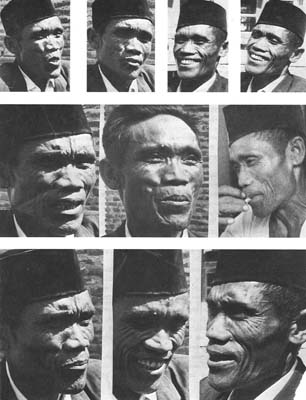
The Many Faces of Pa Lojo Offstage And On
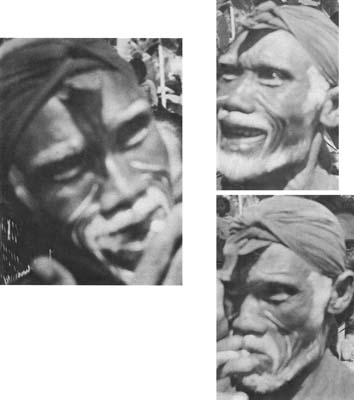
Warjo, one of the troupe’s leading actors, in the role of a Hindu god.
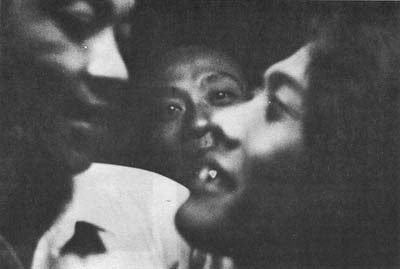
Warjo, as the hero, Atmarja, embraces the heroine, Saman, as the wicked stepmother looks on. In real life Warjo and Saman are brothers.
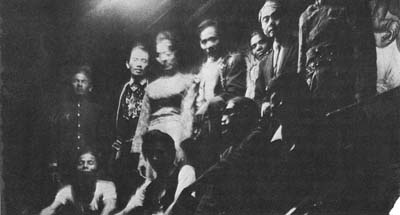
Some of the cast by oil lamp.
“Generally, generally, I am very happy. I hope all people will be happy and good for all their lives. I hope like that and that all the people, the old man and the old woman, the young boy and the young girl, are friends. Before, all the boys were forbidden to gamble. And some people don’t like gamblers. But now many, many people are gambling and a few even watch the sandiwara too.”
He sighed and there was an audible giggle in the audience. “Some people are rich and have Dodge trucks. But I only have dodge,” he said, giving the Javanese word for a kind of water snake. “Because I am at all times the servant of the people. And so I sing and laugh to make the people happy even when I want to cry.”
A few members of the audience threw small rupiah notes onstage. Two packages of cigarettes, thrown by the orchestra players, also landed at Lojo’s feet. “You give me? It looks like money! Alhamdililalah! Thank you very much. Trimakasih. Ah, that is very good, give cigarette to me.”
A voice came from the orchestra, “Pa Lojo, what music do you like?”
“I’d like a lagu [a popular dance with a strong drumbeat] like Djoged Ramayan. It’s a very easy dance. You like me to show you? If you play a lagu, it’s very easy. Please.”
He began to dance, much like an eighty-year-old man trying to do the go go, but the orchestra didn’t play. Lojo stops dancing, but his little finger continues to move.
“What’s that?” calls someone in the orchestra.
Lojo sees the finger moving and grasps it with his other hand.
“Have you money, Lojo?”
“Yah, I have. Fifty rupiah.” He fumbled in his ragged clothes but kept sticking his fingers through empty, torn pockets and grinning in embarrassment. “Oh, yah, forget. Maybe stay in house. So I haven’t money now. Forget at home. Finish now. My pocket is empty.” Something falls to the ground.
“What’s that?”
Lojo stopped to pick it up. “Oh, fall down. Is money only. Two and a half roops. Do you like cigarette anybody?”
Voices from the orchestra: “Like. I like. All right.”
“If you like. All right. Please buy.” There is a long drum roll and Lojo shudders to its beat in a comic manner.
The banter with the orchestra went on until the audience warmed up and the orchestra began to play a frenzied number. Lojo at first cavorted around in time to the music in a burlesque of classical Javanese djoged, then, tiring, called to the orchestra, “Okay, very good, very happy. Now, stop, stop.”
The orchestra did not stop but played faster and faster, with a loud and furious drumbeat, and Lojo seemingly could not stop either, to the hilarity of the audience. “Stop, stop,” he called breathlessly. “Change the drums. Eeeeyah! Difficult. I want to stop.” He grabbed the scenery for support but his legs and hips kept moving. “Finish! Finish!”
The audience roared with laughter now and from the wings, Karwan, Lojo’s fellow elderly servant and his straight man, entered with his customary frown. This was the signal for the drama proper to begin. The music stopped abruptly and Lojo, with fright and embarrassment, winds down his frenzied dance steps and stops.
After a tongue-lashing from Karwan, Lojo explained to the audience that he was a servant who wanted to leave his master and return home to his village. He called three betjak men to carry the six quintals of rice due him from his master.
The master, a fat Djakartan, retorted to his old servant, “Do not forget, Lojo, about before when you were ill for some weeks. You borrowed rice, about two quintals.”
A betjak driver, who strode onstage angrily, grabbed Lojo by his collar, “Lojo, hey, mang! Quickly! Why have you promised with me if you’re not coming? I’ve got two more betjaks waiting with me. We’ve been waiting a long time already.”
“Ah, I am sorry,” Lojo apologized. “Because the rich people now say my rice is only four quintals because I was ill. So I guess two betjaks are enough.”
The betjak man is furious but goes to tell his friends.
Lojo went back to his master and said, “Oh, I want out working for these rich peoples. I want to go home to my village. May I have my four quintals of rice, tuan?”
“Ah, again you forget,” the master said. “Your wife had a baby and you got two quintals of rice to pay for the midwife.”
Lojo: “Oh, maybe now it is only one point five quintal.”
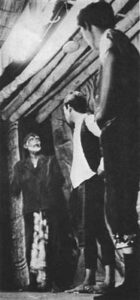
The betjak men stormed back again. “Hey, mang! Why are you taking so long? I am fed up with waiting.”
Lojo: “Eeeyah. I am sorry because these rich peoples are very, very difficult. One betjak driver is enough for me. Here, yah, is two cigarette, one for you and one for the man who is waiting.”
“Well, be quick.”
Lojo started to carry away the remaining one and a half quintals of rice.
But now the rich master called after him, “Lojo! Where are you taking my rice?”
Lojo did a double-take, moved his mouth in jabbering silent protest and groaned, “You already cut off four and a half quintals, tuan.”
The betjak men were yelling from offstage, “Hurry, hurry! Be quick!”
Rich master: “No, no, no, no, no!” He seized Lojo’s remaining rice. Lojo mimicked outrage behind his back.
Lojo: “Where is my rice? My one quintal and half?”
Rich master: “Why, you! Goddam, sialan, kurang adjar [“You have no education,” a common Javanese curse phrase], shaddup! Have you forgotten that plate you dropped and broke? This is for its cost.”
The betjak man returned and grabbed Lojo by the shoulder, spinning him around, “So you want to play with betjak drivers, do you?” And he gave a hard sock in the nose. As the master exited on the left, the betjak man went out on the right, shooting back, “Awas! Awas! Watch out, watch out, old man! If you’re alone in the street and me and my friends catch you, you’ll see. Nobody keeps us waiting so long for nothing. We let many good-paying passengers go back.”
Lojo looked after one, then the other then began to sob, “Hiiiih, hiiiih, wah! I am servant long time, not get rice, get socked in nose! Hiiih, hiiiih!”
It brought down the house.
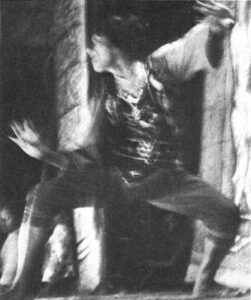 Backstage, Saman, who also acted as the troupe’s cashier, was furious. The chief of a neighboring village who had promised them twenty-six thousand rupiah for a recent performance had just stopped by and paid only twelve thousand. That was all he would give.
Backstage, Saman, who also acted as the troupe’s cashier, was furious. The chief of a neighboring village who had promised them twenty-six thousand rupiah for a recent performance had just stopped by and paid only twelve thousand. That was all he would give.
“The bastard,” Saman said in his own deep voice. “He said this was all he would give for everything. Only twelve thousand in all. So I asked him where was the money to pay for the singer. She gets a thousand roops. Where is that to come from? The chief, if he’d been decent, would have given at least five hundred more for the girl. But one rupiah he wouldn’t give. He told me to cut it out of the rest.”
“Don’t worry, Saman,” said Lojo, lighting up a kretek. “He owes us something now. We will get it back one way or another in the end.”
“We even had to pay for our own tea at his house. That cheap bastard.”
“We don’t make a fuss over money, Saman,” the comedian told him. “It is a debt that will be redeemed.”
Lojo put down the cigarette and hurried onstage. “Hey, what are you doing there?” asked a gruff voice.
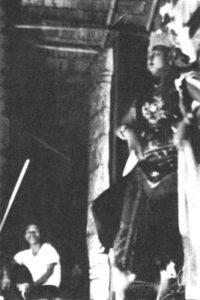 “Picking up cigarette butts,” came Lojo’s high, squeaky answer, followed by laughter.
“Picking up cigarette butts,” came Lojo’s high, squeaky answer, followed by laughter.
The drama that evening was a variation of the Cinderella story: A beautiful girl (Saman), with divorced parents, is mistreated by her wicked stepmother, who has an even more wicked daughter of her own. Both she and the heroine fall in love with the same prince so the wicked stepmother, who is also the queen of Banjuwangi, hires assassins to kill her step-daughter. Lojo, as Saman’s servant, had rather the role of the fairy godmother.
To Husen, watching from the wings, and seeing the actors move on and off the stage, shedding their characters and costumes, smoking, eating, joking and swearing, the illusion of the play’s reality was gone. Now, it was getting past midnight – the play went on to four o’clock in the morning – and he watched the wicked queen and her daughter plotting how to snare the hero.
“For four months,” the wicked daughter giggled a hoarse cackle; she was played by a farmer from Husen’s village, “we will not go anywhere. Only stay in bed and sleep because that boy is very, very nice.”
“Are you crazy?” the wicked queen said with a squawk. “That you talk to yourself?” She was played by an army sergeant who served in Djatibarang.
“Yes, mother, because a boy has already promised to marry me.”
“Who, who is that boy?”
“That is, mother, he is a nice boy. Atmarja. He is like the god, Ardjuna. He wants to marry me.”
At this a roar of angry shouts came from children in the audience: “Lies! You lie!”
The actor playing the wicked daughter turned and addressed the audience, still in falsetto voice, “Kliwed children are very naughty. Atmarja wants to marry me.” This triggered a storm of cries and boo’s from the children.
Saman entered and the old Banjuwangi King, deceived by the wicked queen, started beating him up. He knocked him down, pulled his hair – almost pulling off Saman’s wig – dragged him to his feet and knocked him down again as Saman screamed and sobbed and children in the audience began throwing stones at the wicked queen.
Lojo, hearing the angry roar from the audience, told his straight man, “C’mon, Karwan, they’re getting too excited out there.” Improvising, he and Karwan ran onto the stage and fought the wicked stepmother and her daughter in a mock battle. The two would rush Lojo from different directions, he would duck, and their heads would crash. Then Karwan jumped on both of them, knocking them to the floor and Lojo poured a teakettle of water on their heads. The audience was now on its feet and cheering.
To calm down the atmosphere, Lojo sent several soldiers out on stage in the next scene, to have a long, windy conversation on conditions in the Banjuwangi Kingdom. Farming was not so good, one said, too many insects and now, moreover, an outbreak of cholera. The first few cases have been reported by the Indramaju hospital and the audience was urged to boil their water as a precaution. Then there was a message that everyone should fly the flag on National Day. “I don’t mind throwing in a little government propaganda,” Lojo told Husen. “Under Sukarno, sandiwara did very well. We even had our own permanent theatre in Tjelang.”
By the time it came for Saman’s abduction and murder, half the audience had fallen asleep and it seemed an anti-climax when a soldier carried Saman to the wings and Saman could be heard audibly chuckling and saying, “Don’t drop me, you bastard.”
In the morning, Husen and Djuned put their bicycles on top of the loaded truck and rode home with the troupe. They have to wait some time as Saman read out from a list and paid each of the actors, stagehands and members of the orchestra. Most had borrowed on their salaries and got only two or three hundred rupiah. Once on the road, Husen looked at the faces of the actors in the harsh morning light: Lojo had put on a pair of steel-rimmed spectacles, and in his black suit resembled a stern and dried-up old headmaster. Saman, huskily-built and the tallest member of the troupe, seemed impossible to have been the mincing, soprano-voiced heroine of the night. The girl dancers, who had seemed lushly beautiful in their stage makeup, now looked like plain, sallow village girls. And he saw the handsome general was now grey-complexioned and pock-marked. Indeed…all the troupe looked seedy, the stage sets meager and tacky and the clothes worn and threadbare. It was almost with relief that Husen and Djuned jumped off the truck at Pilangsari. And yet as the ancient, overloaded truck disappeared down the road, Husen felt a pang of envy.
The Shadow Play
Husen was a born actor. As a boy he loved to pretend that he was a dalang, the puppeteer of the wajang kulit, or Javanese shadow play. He would improvise little theatres out of bamboo, make the puppets of Hindu gods and nobles and Javanese clown-servants out of mango leaves, and for other little boys in the village, he would act out the lakon or story of a wajang play he had just seen.
There were always wajangs in Pilangsari and the surrounding villages; after the rice harvest and when times were good, perhaps there were two or three a week. In the evenings, Husen would hear the haunting bamboo melody of a gamelan orchestra come, drifting across the river or from a far-off tree line and he would slip away from his house, hurrying through the darkness with mounting anticipation as the music grew louder and louder. In the paved courtyard of some prosperous peasant’s house, he would dart past the glowing orange lights where women sat at tiny stalls selling cakes and tea and cigarettes, throwing a long black shadow behind him as he moved towards the arc of half-light thrown by the dalang’s coconut oil lamp. Sometimes Husen would pause behind the big white screen set up between the pillars of a portico and watch the dalang unpack his puppets, sticking them into a banana trunk or perhaps already sitting cross-legged, head bowed, in an attitude of prayer. But usually he would dart at once to the front of the screen where the grown men, proud in their black Moslem caps and sarongs, made their way into a favored pavilion or to rows of comfortable chairs with tea and bananas on little tables beside them. Like water seeking its own level, Husen and the other little boys would scramble to the front of the men, falling upon each other like pups in a heap and going to sleep through the long court debates and philosophical discussions, until it was time for the battles and the clowns to come on. But sometimes Husen would sit up and watch everything and gradually as the years wore on, the wajang came to seem to him, as it does to all Javanese, as a truly sacred drama. A king wrestled with demons, a holy man combated evil spirits. The bodies of the buffalo leather puppets, painted in gaudy gold, reds, blues, greens and blacks, came to seem, hidden as they were on the other side of the screens, an illusion and their shadows, which he watched and which seemed to tremble and breathe with life in the dalang’s hands, the reflection of that illusion. And, somehow unconsciously, the boy absorbed the belief that soul, shadow, spirit and ghost are one, that the soul and God are one. And although nominally a Moslem, in this way was Husen’s true religious belief formed.
But little of this appeared, of course, in the renditions of the lakons he performed for the other village boys. These were rough slapstick comedies. “Okay,” Husen would say, holding up mango-leaf figures, “this is Judistira on the right…a king from Pendawa, and Dorna, the advisor from Astina Pura Kingdom over on this side. They are talking about King Prabhu Srijudana.”
“Where’s he from?”
“Not in Java. Across from Java, maybe. But Judistira is king of Pendawa. Stay in Java. Have four brothers, Bima, Ardjuna, Nakula and Sadewa. Before both sides friends. But now fighting because Pendawa is poor and Astina is rich.” In this way, Husen summed up the Hindu epic, the Mahabharata, the struggle between cousins, the five Pendawa kings and the one hundred Korawas, which culminated in the great war of kinsmen, the Bratajuda, an endless struggle in the wajang, since the final battle is never portrayed, and symbolizes less a struggle between good and evil, as between alus and kasar feelings, or between base animal passion and detached, effortless self-control.
But as Husen, the boy, put it, “Now, Judistira is very alus, very kind. If somebody say, ‘Judistira, I kill you,’ he say, ‘Okay, please;’ if somebody say, ‘Judistira, I take your wife’ – but he have no wife – he say, ‘Please.’ He had white blood not red blood.” It was the boy’s way of explaining the major wajang character who symbolizes the inability to act if drained by kindness and compassion, the man who believes tout comprendre c’est tout pardonner and is praiseworthy but pallid.
Husen went on: “Now, Bima, his brother is hot blooded, many fighting; he sleeps standing up with his fists doubled. He has many wife and stabs people with his very long thumbnail,” thus describing the wajang symbol of both human vitality and the dangers of passionate commitment.
“Ardjuna, the third brother, he’s very slow, very cold and likes girls the best and is the nicest looking in the whole world, with many, many wives. He is not kind like Judistira, he takes other people’s wives. If nice girl, beautiful girl, okay, he is like to make love with her, even in the Astina Kingdom which is the enemy. The other two Pendawa kings, Nakula and Sadewa are twins and follow their brothers around,” (Ardjuna, the most admired hero in the wajang, is able to sustain action by stifling compassion; he is the symbol of cool capability and merciless justice).
“Tell as about Semar, Husen.”
Here the boy was on safer ground. Semar, along with his two sons, Petruk and Gareng, was the great Javanese low clown. They were the servants and constant companions of the Pendawas. But in contrast to the kings, Semar was physically repulsive; he had great wisdom and kindness but a fat, awkward body, a black, ugly looking face and was full of vulgar talk and action, such as breaking wind to chase away his children or even throwing his feces at opponents. But to Husen and to all Javanese, Semar was also the father of all people and actually a god in all too human form. The guardian spirit of all the Javanese from their first appearance to the end of time, he is the most important figure in the whole wajang mythology.
Husen would try to explain Semar to the other boys. “His batin or inside life, is very nice, but his lahir or outside life is not good. If look at Semar, is very bad, very fat, very ugly. Now before this earth was empty and Togog he was the first man out. But Togog looked the earth empty and so he go inside again and Semar is out from the earth. Then Togog called to Semar, ‘Little Brother…you are second from me.’ ‘No,’ says Semar, ‘I am the first.’ ‘Because the earth is empty,’ says Togog. ‘I am out first, take a look and go back. So you are my little brother.'”
The boys, familiar with the Moslem creation myth, would ask about Adam and Eve and Husen would laugh and say he didn’t know. “Adam and Eve, earth and sky, left and right, east and west, men and woman, all two-two,” he would finally reply. “The meaning is peoples must marry. Sometimes queer, bantji. But all else is two-by-two. Only God is one. That is why Semar only has one tooth. He is god, but his children are very naughty. Semar says, ‘Oh, you must going to work in garden.’ But Semar’s children, many going to answer call of the nature.”
What Husen liked best was to stage a comedy with Semar’s children, Gareng and Petruk, fighting a giant, bumping each other’s heads, burning Dorna, the Astina kings’ treacherous adviser on the nose with Petruk’s cigar or with plays on words between the Javanese and Sundanese languages, easy because the words for kiss, sit and water in Sudanese meant drink, go home and feces in Javanese; since most of the villagers knew some of both languages, although Javanese was spoken in Pilangsari, this provided an endless source of merriment.
Now, for almost twenty years, Husen had not performed a wajang, but he had grown fond of paying a few rupiah to rent an illustrated lakon in Djatibarang for a few days and reading it at night to his family. Then, he would sit for hours at the wooden table in his father’s house, holding the book by a kerosene lamp, as his mother and father, Tarja, his little brother, Warjono, Karniti, and whoever happened to be visiting gathered round.
Karniti, especially, loved these evenings; they were among her happiest times in the village since it meant she would not have to lie awake half the night waiting for Husen to come home and wondering where he was and whom he was with.
Sometimes Husen would read, acting out all the parts with many voices, and sometimes he would tell them the story, such as Djajasantika:
An excerpt from “Djajasantika” as read and told by Husen:
It was in the kingdom of Manimantaka and King Prabhu Kelana Djaya, a giant with fangs and a big moustache, told his generals he wanted to rob a magic scepter from the Astinapura kingdom. “Please, boys, let’s go there and get it.” But because robbing that thing was very difficult, one of his warriors, Kalantaka, who was also a giant, turned himself into the form of Semar’s son, Petruk. Another warrior, Durga Sakti, disguised himself as Gatotkatja, the son of Bima, the Pendawa king.
“I want inside the palace of Astina, so I will appear as Petruk,” said Kalantaka, and there, disguised as Petruk, he fought with the watchman, Tirtajuda. And Tirtajuda ran to Dorna, the Astina king’s adviser, and said, “I have been knocked down by Petruk!”
“Dangerous, dangerous!” Dorna said (Dorna was Husen’s best characterization; an elderly but more two-faced Polonius). “Better we tell the soldiers and seize him. Boys, quickly seize Petruk!” But Kalantaka, in the form of Petruk, escapes, steals the magic scepter and, turning back into an evil giant, flies away. The soldiers report Petruk and Gatotkatja have stolen the magic scepter.
“Adjow! adjow! tewas! This is dangerous, very dangerous,” said Dorna. “Petruk has stolen the magic scepter of Astina.
Dorna reports this to the Korawa king who exclaims, “Hah! Ahhhh, Apa! Uncle, my scepter is lost! Who is the culprit? Adhuh, adhuuuh!”
“The soldiers say it was taken by Gatotkatja, the son of Bima, and Semar’s son, Petruk.”
“Let us go to the Pendawa Kingdom and tell them what happened and go to Semar’s village,” said the king.
Now in Tumaritis Karang, Semar’s village, (roughly translated as “Fleabag Village”) Semar and his wife were talking.
The wife said, “You tell me you are going to matjul (hoe) in the garden?”
Semar: “Where are the children now? Please, call all of my children. I want to talk to them about the new farming methods.”
Semar’s wife, Suti Ragen, called to Bagong, Tjepot, Petruk and Gareng, “Please come here, children.”
In the garden, Bagong said, “Hoi, ‘Reng, our mother calls us.”
Mother: “Quickly, Bagong, Petruk and Gareng!”
When they entered, Semar said, “Naaaa, Bagong, Gareng. Very good is you come to me. I want to tell you about farming methods. But where is Petruk? Please, children, go looking for Petruk.”
Bagong and Gareng go back to the garden and find Petruk crying under a tree.
Bagong: “What do you do, Petruk? Please, we go home now. Our father, he is want konferensi on interdepartmental agriculture. Ah ihi, adjollah. Let’s go.”
Petruk: “Shaddup! Diam! Perfi! Close your mouth! I am a coward.”
Bagong: “E eh, ech. What do you mean, you are coward?”
Petruk: “Last night I had a dream that my body was finished with fire – burnt to ashes.”
Bagong: “Why you think only about dreams?”
Gareng starts singing:
“Last night, Bung, I am dreaming
Find snakes, Bung, very big
And snake bites, Bung, my fingers
And I am cry, “Adooooooow!”Gareng stops singing and really yells, “Adooooh, Mother, Help! Agg-g-g-g-gh!”
Bagong: “Iddiiiii! Ijj! The crab has bitten Gareng’s toe.” Bagong knocked the crab off with a stick of wood but with a cry of “One, two, dead,” he hits Gareng’s foot instead.
“Agg-g-g-g-gh!”
The family at this point laughed at Husen’s comic reading.
So they must carry Gareng back to the hut. There Semar is waiting and he said, “Hei, why are you carrying Gareng? Ah, Petruk, be certain I want to hold konferensi now on farming.”
Petruk began to cry again. “Ehh, hik, hiiiii, hi, last night I was dreaming, father…”
Semar, who possesses telepathic powers, also sobbed because he understood the meaning of the dream. Outside their hut soldiers arrived, led by the crafty Dorna.
Semar gave a low laugh of welcome, “Please sit down, teacher.”
Dorna: “Thank you very much.”
Semar: “How are you?”
Dorna: “Baik kakang, Semar. Very well, Semar. Trimakasih, apa chabar Kakang? Thank you, how are you?
Semar: “I am surprised that you, a tamu agung, a big foreigner, are come here all the way from Astina palace. What do you desire? Because my village is very humble.”
Dorna: “Brother Semar, first I am very fond of you, and I am grieved to be leading a delegation from the Astina King. I came here because the Astina King told me to arrest Petruk.”
Semar: “Why? Petruk is every day stay in this house.”
Dorna: “No, no. Petruk stole the king’s magic scepter.”
Semar became angry. “Eee, eee, nanti dulu. Just a minute!”
Dorna (impatient): “All right, men, seize Petruk!”
All began fighting, Semar’s children against the soldiers.
Soldier: “Bedebah, kurung adjar, sialan, goddam, bloody, shaddup!”
Another soldier: “Do you not fear me!”
Bagong: “Come here!”
Soldier: (hitting him) “Tjoba ni! Try this!”
Bagong (swinging) “You will eat wind. Nana lagi Where’s the next one!”
Soldier: (lying in pain) “Auuuuuuuw!”
Dorna: “Adjooow, adjow. Tewas. Dangerous.”
Petruk is finally seized.
Dorna: “Bagus, botjah, botjah! Good, boys!”
The soldiers bind Petruk and take him away. Semar told his children, “C’mon, Bagong, Gareng. We mast go to the Pendawa kings for their help. I want to give information that the Korawas have taken Petruk away.”
Along the way they are joined by Gatotkatja, who has been thrown out of his house by his impetuous father, Bima. Because Dorna spoke sweetly, Bima went to his wife and said, “Where is my son? I want to kill him because he makes me ashamed.”
Bima’s wife: “He has not left the palace. How could he steal the magic scepter?”
Bima: “Oh, you like your son to shame me. I not like. Bima threw Gatotkatja to the ground, and Gatotkatja, who could fly, went off to find Semar.
Semar told his children and Gatotkatja, “Let us go to another country. Petruk is dead and you are dishonored. We will retire to the sacred pond in the forest.”
But in the forest they came across a dead man hanging from a tree.
Bagong: “Brrrrr! Look, someone’s dead.”
Gareng: “Aaaaaaj! It is Petruk who is hanging!”
Bagong: “Paaaaaacecek! Lihat nih! Look at this! Hiiiiii! iiiii, iiiii,” and he began crying.
Gareng was also crying: “Hik, hik, wah!” Bagong climbed the tree and cut the rope and Gatotkatja caught the body. Semar quickly revived Petruk with magic. “Come, Petruk,” Semar said, “We will go deep in the forest to a holy place.”
Husen continued to read the lakon for several nights, and no one in the family seemed to tire of it. It seemed Semar and his children and the Pendawas were continually fighting the Astina kings and Dorna, giants and ogres, and that they had to keep killing them over and over again. Why was this? It was because the giants and ogres represented the passions and lusts; they keep arising again and again and one has to keep fighting them off with good impulses, as represented by Judistira’s compassion, Bima’s vitality, Ardjuna’s sense of justice and Semar’s magic powers and homely wisdom. One could never defeat them once and for all. They would always keep coming back and the struggle against them would go on over and over, an endless, indecisive battle.
The most popular lakon in Pilangsari, however, barely touched on Semar and the Pendawa kings and was not drawn from the Mahabharata or Ramayana myths. Instead, it seemed to have had its roots in the soil of the Tjirebon country itself. As briefly sketched, in Husen’s words:
“Mapag Sri or the Origin of Rice”
Once upon a time, in Sura Laja, the abode of the gods. The dewa, Adiguru, has two sons, Antarasa and Antasari. One day Antarasa is told by Adiguru to make a wooden bed. But he falls ill and cannot work. And his brother, Antasari, tells Adiguru that Antarasa is just lazy. So Adiguru turns Antarasa into a dragon. Then Antiguru tells the noble, Narada, that, “You must interview Antarasa.” Narada goes to see Antarasa who is already turned into a dragon. As a dragon he has two eggs in his forehead, a sign that as a man he was really ill, and Narada reports back to Adiguru that he has been unfair, his son was really ill.
Now, Antarasa thinks, “I am turned into a dragon and am ill because it is Antasari’s fault, because he told my father a lie.” Adiguru himself realizes that Antasara has been wicked and so he turns Antasara into Budug Basuh, a handsome prince who smells bad because he is covered with scabie sores. And Budug Basuh cannot stay in his father’s house. Adiguru sends him away, saying, “Get out!”
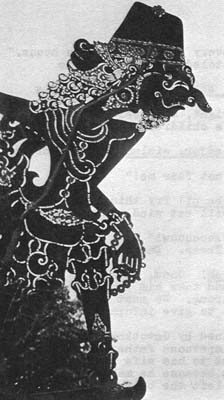
Dorna, the crafty adviser of the Korawa Kings
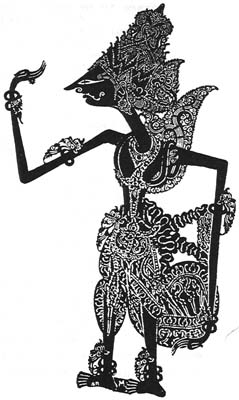
So Budug Basuh must go to Tegal Kepanasan, a place where two giants are waiting, Tjabelungka and Kala Mudang. And Antarasa said to Adiguru, “I don’t mind being turned into a dragon but you must tie me up.”
So he was bound and once he was, the two eggs fell off and Antarasa ate them and was no longer sick. And in the street he found birds who became his friends and one bird asked, “Where are you going?” Because the dragon is busy he cannot answer. He is busy eating the eggs. And the bird hits the dragon’s jaw and the eggs fall out. One drops in Palembang in Sumatra, and it hatches into Radinsadhana, a handsome young boy.
The other drops to the ground from the dragon’s jaw and hatches into a beautiful young girl. And part of the shell becomes Lembuputi, a snake in the water, but sometimes it looks like a red buffalo. And the white of the egg falls in Petapan Timpuru, or Golden Bed.
The dragon takes the girl and says she must wait for the god, Vishnu. And Adiguru is told by Vishnu that if the girl does not love a boy she cannot stay on earth. And already the girl loves Radinsadhana and Vishnu brings her to Adiguru, her grandfather.
And Adiguru said to the girl, whose name is Sri Kwatji, “If you like to marry I have a dewa or god in store for you. Your husband will be Budug Basuh.”
And Adiguru said, “If you want to marry, you cannot with another. You must marry Budug Basuh.”
Now Budug Basuh looks very nice, very handsome, but smells very bad because he has scabies.
And Sri Kwatji not like and she ran away. But Budug Basuh, he very much loves this girl and he ran behind. And Sri Kwatji came to Adiguru and said, “I am not like with him.”
And Adiguru said, “If you are not married with him, I’ll kill you with this kris, or magic dagger.” Now Adiguru did not want really to kill but only make her afraid.
Now Sri Kwatji searched for Budug Basuh. And when she found him, she saw that he was wrapped in his sarong because of his many sores. And she thought, “Why does he want to be so hot, wrapped in his sarong like that?” And Budug Basuh got up, and seeing Sri Kwatji, his love, was again aroused. But because he had many sores and smelled bad she ran back to Adiguru and said, “I am not like with him.”
And Adiguru said, “You must marry him.”
Sri Kwatji said, “No, no, no, no!” and she threw herself on the kris that Adiguru was holding. And she was taken to the cemetery and buried.
Months later, Togog, the watchman at the cemetery who was the first man in the world, looks at Sri Kwatji’s grave and sees the first green shoots of rice have come out. And now Sri Kwatji is known as Dewi Sri, the goddess of rice.
Budug Basuh is still chasing her. And he came to Adiguru and asked, “Where is Dewi Sri?”
“Die already,” Adiguru said. So Budug Basuh, who loved Dewi Sri, threw himself against the kris of Adiguru and died.
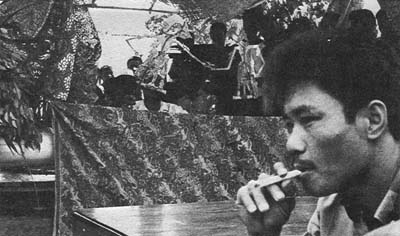
Adiguru, Budug Basuh and Husen
And Adiguru called all the gods, and said, “Take this coffin and bring it to the River Ganga. It is Budug Basuh’s body and you don’t stop until you reach there.”
But after some time one of the gods got tired of carrying the coffin and he said, “Let’s take a rest.”
“No, no, no!” said the other gods. “We must carry it to the Ganga because Adiguru said we cannot stop on the way.”
“Tida apa apa. Never mind. I am tired.” And they put the box on the ground. From inside came a noise knock, knock, knock, knick-knack, knick-knack – and they opened the box just a crack to see what the noise was and WhooooOOOOOOSH!!!! out came all the insects and animals of the world!
Tigers, snakes, boars, elephants, fish and many rice-eating insects like sundep, beluk, lembing, army worm and all the others we have in Java. Fish for sure too. You see if you eat rice with fish very happy. And if you have rice, many insects, beluk, sundep and animals like to eat.
Because Adi Guru told them not to stop until they reached the Ganga. Because one god put his fingers in and opened the box. So now we have many, many trouble.”
Did Husen really believe the myth? “About half-half, maybe a little more,” he would say. But every night of her married life, his mother had left a plate of rice, sauce and tea, with an upturned mirror, on a banana leaf under the rice bin for Dewi Sri’s nourishment.
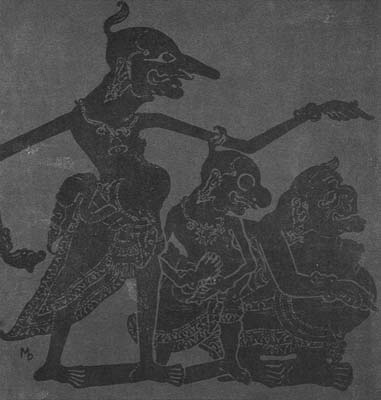
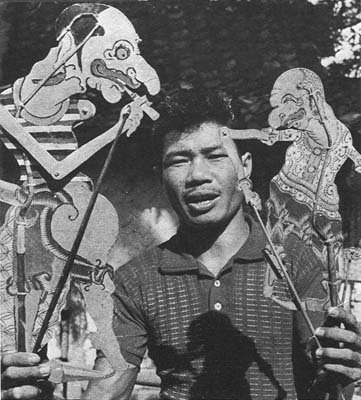
Petruk, Gareng and Semar
Abu and Father
Into this elusive village world of myths, magic, music, and half-remembered gods erupted the green revolution, cold, commercial and cataclysmic.
Its prime agent in Pilangsari and the surrounding villages did not appear at first to be a revolutionary: a mild, soft-spoken twenty-two-year-old student, Abubakar Djauhari, BSc., arrived only with his degree, some charts and graphs and an American textbook, “Getting Agriculture Moving,” by Arthur T. Mosher. This was his bible and his manifesto.
Indeed, Abu himself was appalled by the implied violence of the catchphrase, “green revolution,” used to describe the rapid spread of the new dwarfed, stiff-stemmed strain of rice which did not lodge under its own weight if heavily fertilized, and upon which the government in Djakarta rested its hopes of achieving national food self-sufficiency. He never used it and preferred instead to speak of a “greening movement,” often baffling his listeners.
But no conquering warrior riding in with a regiment would bring more change.
Abu was assigned a room at the home of the chief of Karanggetas village, just across the banks of the Tjimanuk River from Pilangsari. There he lived in genteel poverty, always dressed in a clean, if threadbare, white shirt and carefully pressed trousers as he walked or bicycled around the countryside, giving lectures, checking his experimental plots and, in time, visiting each individual farmer. His pay from the district agricultural extension office was only three thousand rupiah a month, the price of a steak dinner at the Hotel Indonesia in Djakarta. This meant he could make few trips home to visit his widowed mother in Kuningan, on the terraced slopes of Tjiremai Mountain and even fewer to consult his professors at the Agriculture Academy in Bandung. Although the village treated him with hospitality, smiles and extreme politeness, Abu sensed a subtle adversary relationship and since all those with University educations had moved away to the cities, he was rather lonely. This he fought, busying himself in his free time with activities at the village mosque since he was a santri or devout, practicing Moslem who prayed to Mecca five times a day and observed all the fasts and social strictures laid down by the Koran. And in the evenings, if he felt depressed or discouraged, he would turn to his dog-eared copy of “Getting Agriculture Moving,” for that combination of pep talk, inspirational message and common sense advice that was its author’s specialty.
“To increase the agricultural production of a country is a complex task,” Dr. Mosher cautioned. “It is frequently a baffling task as well…It is baffling because the spirit of a people is involved also. Techniques are not enough. They have to be combined and used with intelligence, imagination, experimentation end continuing hard work. Agricultural development is as dependent on how effectively people work together as it is on the natural resources with which they begin…Yet agricultural development does occur. Farmers experiment with new crops, frequently with no more encouragement than seeing these grow in their neighbors’ fields.”
Abu flipped the pages to his favorite passage:
“Enthusiasm and determination are the engine; skills and knowledge are the tools; occupations and citizenship are the opportunities…”
Perhaps it was not surprising that Abu believed Dale Carnegie to be a leading American agricultural expert.
Near the end of the book, illustrated with line drawings, Dr. Mosher compared “getting agriculture moving” to the parts of a wheel. There were five: “new farm technology,” “markets for farm products,” “the local availability of farm supplies and equipment,” “adequate incentives,” and “transportation facilities.” An artist had portrayed each as a separate part of a wheel and then drawn them coming together.
“Now agriculture can move!” was Dr. Mosher’s enthusiastic caption. Over the English text, Abu had scribbled his own translation, “Sekarang Barulah pertanian dapat bergerak madju!”
Dr. Mosher had ended the book by directly addressing the reader:
“The last section of this chapter each reader must write for himself. Almost every person in each society can do something to raise agricultural productivity…What can you do now, without waiting for conditions to change or for someone else to do something first?”
“Go over this book, chapter by chapter. Look at each of the subtitles in each chapter. As you do that, finish this book by writing on this and the following pages the specific things you can do to increase the rate of agricultural development in your country.”
On the last two pages, the words, “I can…” had been printed. Otherwise the publisher had left them blank. Abu had filled in the first, writing in neat, legible English:
“…give the farmers information so that if the government gives them the credit and water they need they will know what to do and can grow the new rice. I like all the farmers to make progress with their lives. That is my idea. To get rid of their poverty. So there is enough employment in the village and there does not have to be urbanization so the people must leave their homes and go to the city. There must be enough to eat, enough for clothes, to send children to school and get happiness and so on and so on. All the villagers must have capital resources; the credit needs for the farmers should be provided within the village itself. Not from outside. The village can own money itself. Cooperation must grow within the village.
“If the village and the farmer get capital, they can get what they need. The money lender or idjon system is a kind of evil in the village.”
Husen first met Abu one morning after a heavy rainfall when he was hoeing one of his father’s plots in Tjibanteng Garden. The buffalo boys came running up to him waving their arms and shouting.
“Mang! Mang! Mang!
Husen put down his patjul. “What is?”
“Look, look there! Look, mang, look under the tree!”
“Over there!” the boys cried. “That is, that is! We’re afraid.”
Husen went over to the riverbank and saw a young man in a white shirt sitting under the trees and watching the landscape.
“Hey! Who is that?” Husen called to the stranger in a harsh voice.
“Please, mang! Get him!” the buffalo boys cried. “Because he brings net. We were playing football. The man came and looked like this.” The boys turned their heads in all directions. “Maybe dangerous. We’re afraid, Mang. Maybe this man is a Tjulik!”
Husen moved quickly along the river bank. Approaching the stranger, oddly dressed in a white shirt and slacks, Husen said to him roughly, “Where you come from?”
“Karanggetas.”
“You know with me? Are you sure you’re from Karanggetas? I never see with you before.”
Abu explained he was a student and village extension worker and that he was waiting to go fishing in the river. When he held up his net, Husen laughed and apologized, “Those boys are all afraid of you because they think you are a tjulik.”
Abu grinned and his eyes twinkled with amusement. “Do you really believe in tjuliks?”
Husen chuckled with embarrassment. “Because, how many years ago, okay, it was like that. Maybe a ghost said, ‘I want that boy’s head. I want the heads of forty boys.’ So maybe that man, the one the ghost speaks to, he becomes a tjulik. And he must steal little boys and cut their heads off. Maybe he drinks their blood and carries their heads away in a sack.”
Abu looked doubtful and Husen said emphatically, “Until now. In the village. Sometimes a boy disappears.” Not only head. Maybe taken away by truck.”
Abu laughed. “Okay, you ever been in Djakarta?” Husen asked.
“No, never; only Bandung.”
“I read in the paper some days ago in Tandjung Priok a man kidnapped a little boy, killed him, and drank his blood. He said a ghost had told him to drink the blood of a little boy.”
“Are there crocodiles in this river?” Abu asked. “I was afraid, it is so high today and the current is strong after the rains.”
“No, no crocodiles now. Before maybe. Many crocodiles. But now, not. Oh, in Djakarta, many crocodiles. Djalan Thamrin, Pasar Senen.” Husen laughed. “Many, many crocodiles in Djakarta, but not in village.”
Husen sat down, offered Abu a kretek, which the student politely refused, and lit one himself. The buffalo boys had kept a safe distance but now seeing Husen seated beside the stranger they came swarming over. One little boy ran perilously close to the edge of the bank, where loose soil had been torn away by the river during the rains. He clutched at some roots just when it seemed the earth at his feet would collapse into the river and Husen called, jokingly, “Jump in.” A whole banana tree floated past on the muddy, brown river water, its branches and leaves sodden and spread out in the water. In the silence they could hear the snickering of cicadas and the croak of frogs from the rice paddies beyond the garden.
The buffalo boys called to each other, “Why don’t we swim?” “You try it.” “Of course.” “Jump in.” One of them kicked the soft, eroded earth on the bank into the river. It fell with a “plop!” sound. “The water kicked the land so all the land fall down,” the boy announced, pleased with himself. “Maybe the river won’t go down for a week,” said another. Other boys started kicking clods of earth into the water. “Plop!” “Plop, plop!”
Abu shook his head. “This is the soil loss because of human activity. It is the erosion.”
Husen shouted to a man on the opposite bank who was looking with dismay at some flooded tomato plants on a sandbar. “Hey, where is your garden?” Husen laughed. “Under the river?”
Now a woman on the other side, where the village of Bojong was hidden in the banana and mango trees, shouted to Husen, “Hey, c’mon. Bring your friend. Tuesday night there’s a wajang kulit. Yah, all right. Better bring him now. Can he swim?” And she went back into the trees with a cascade of laughter.
Abu looked at some inundated vegetable gardens on the opposite bank. “They must protect those gardens with contour plowing and terrace gardening and must make greening movement activity. To make soil and water conservation and prevent soil erosion. But there is a plan to deepen the Tjimanuk River.”
“Yah?” Husen was interested now.
“Now only a fourth of the river water is being used by the farmer. After the rice harvest, they will dredge the canal until the rains come in late November.”
The buffaloes were getting too close to the riverbank and the boys hissed at them, “Hsssss, kija, kija, go, go! Trrrrrrr idrrr, eeeedr, eeeedr, turn, turn! Yak eee yak eee yak djrr-r-r-r-r-r!”
“Maybe you like ride?” Husen asked Abu jokingly. “Please sit down on the buffalo.”
Ignoring him, Abu said, “This is the grazing process. Because there is no special grazing place in this village.”
“Kurang adjar! Goddam!” Husen exclaimed as one buffalo attempted to mount another.
“Is that your rice field over there?” Abu asked. “It needs weeding.”
“Eeeyah. We haven’t enough money.” Beyond the rice field a bicycle was passing, with a girl in a green skirt, yellow blouse, red scarf and powdered face behind the rider. “Hello,” Abu said, “I think that is taxi girl. Is negative social problem in village.”
Husen started to laugh and then realized this curious youth was serious. “What did you mean, my rice needs weeding?” he asked and Abu agreed to go and take a closer look at it. As they left the riverbank, Husen, unable to resist, kicked a clod of earth over the bank and heard it go “plop!” in the water. “Is negative soil erosion activity,” came the weary voice behind him.
After a round of Husen’s father’s fields, the two stopped at a tea stall along the road where some men were spraying Endrin insecticide on an adjacent rice paddy.
“The farmer needs money for clean weeding,” Abu was saying. “Now they spend more money than they take in, especially for sandiwara dramas, wajangs, circumcisions. It is the irrational tradition of the farmer’s life. The government has a special warning about that. Not so many wajang after the harvest. Every wajang must get permission and the procedure more difficult. But the educational level in the villages is still too low and the extension workers are too few. One extension worker in America has only two hundred farmers to work with. With all the facilities, with automobiles, telephones. In Indonesia, you cannot find like that; but you survive.”
“Why did you study agriculture, Abu?”
“It is population density and food problem, is interest of my life. The big men are not from the richest families but have the highest ideas.”
“You like this village?” Husen was fascinated by his new acquaintance, so different from his fellow villagers or the people he met in Djakarta.
“It’s economy is very mysterious. If it is from harvest to harvest and you make calculations, there is not enough for the people to live on. But all the villagers survive. If you make calculations about income and output, it is minus. It is not open, there is not effort to be open; it is mysterious.”
Abu asked the tea stall woman who appeared to own the field being sprayed, how much Endrin she was using. She wrinkled her old, lined brown face and thought for a minute. “Three hundred batas, this is. And sixty rupiah of Endrin.”
“Oh, it’s no good,” Abu said. “In one hectare you most put two liters. A liter of Endrin costs 500 rupiah. And a hectare is seven hundred batas. She is using only one-eighth of what she needs,” he told Husen. “The farmers here must know about spraying and plant protection.”
“Will it hurt the rice?” Husen asked.
“No, it’s better than nothing.”
“Because I haven’t money,” interjected the old woman.
“You have many, many trees here,” Abu told her. “The rice field must have much, much sunlight. Your soil is good enough. It is perfect for a garden but not for rice. Too much shade.”
“It’s no good?” Husen again.
“If you look at it from a technical agricultural point of view it is not good. But,” and Abu grinned, “it’s better than nothing.”
“All right,” promised the old woman. “I’ll use more if I can find money.”
“Adjooow, adjow,” Husen joked, imitating the crafty court adviser, Dorna, from the wajang kulit, to celebrate Abu’s persuasive powers.
“Dorna, it is from the wajang operations, wajang activities,” said Abu. Before leaving he advised the woman how much fertilizer to apply and got a promise from her that next time she would plant the rice in rows instead of the traditional helter-skelter fashion.
As they walked back to the garden, Husen told Abu about his life as a betjak driver in Djakarta. “I want to help people like you, Husen,” Abu told him. “This urbanization, looking for a job in the city because in the rural community there is much disguised unemployment. But we must go slowly. I am afraid of the antiseptic society, like in Sweden.”
That evening when Husen returned home he found his father planting papaya trees in the garden. “Father,” Husen told him, “these papaya, they’re too close together. Near, near like that is not so good. I go to work there to separate them. We must cut some out.”
“No, no, no, son. Because these flowers are good and the fruit will be sweet,” Husen’s father was dismayed at the notion.
But Husen was adamant. “Abu says to plant two meters apart. Abu says if you are planting papaya you must make a hole first and give fertilizer from the compost pile.”
“Who is Abu?” the father asked innocently, not knowing the enemy was already at the gates.
In recent years, as he entered his sixties, the father had become increasingly introspective, rarely going to the fields but instead preferring to putter around the house and its surrounding garden. A devout, practicing Moslem like Abu, the father was the first of the family to wake each morning, rising to say the first prayers of the day at four o’clock and then pacing around in the darkness of the garden until daybreak. Just before the dawn, Husen’s mother would hear her husband’s coughs outside and winding a skirt around her, she would hurry to the well, splash cold water on her face. Then she would select a handful of dry grass and stalks standing in the corner of the kitchen and arrange them delicately in the mouth of the oven, making the most of every leaf. With a match, she caught a flame and thrust it into the straw and the blaze would begin.
As she worked the mother could hear in the morning stillness the voice of the hadji at the village mosque calling the faithful to prayer. By the end of the prayers, the chickens were already pecking in the woodpile and scratching the earthen floor in hopes of finding a grain of fallen rice.
Outside she could hear the loud splashing as her husband took his bath in cold water of the pond. The village sounds began with the clackety-rattle of the ironmonger. A delman horse cart clopped by on the road and farmers, some with the quick jog of men carrying heavy loads under yokes, began moving across the narrow dyke tracks in the rice fields.
When some rice was warmed, the mother wakened Djena, a visiting daughter, and her four small children, and Warjono and Tarja, the family’s two youngest sons who still lived at home, and they all helped themselves to rice, chilies and bean curd, along with a glass of clear, sweetened coffee. The father did not join them, he had been fasting for thirty days in hopes that Allah would hear his prayers and save his rice crop from insects until the coming harvest; his last two had failed and the lumbung, or rice bin, in the kitchen was now three-quarters empty. In the ruddy, dark dawn, with only the first gleams of bronze in the sky, the father had followed the dyke track through his rice fields. The plants were tall and the heavy loads were yellowing, but many were white and stiff at the grain head, a sign the plant had been eaten by lembing bug near the ground. The earth was cracked and dry between the plants and he could also see the mice had taken their toll. In one of his smaller fields – the father’s rice land was in seven different patches since he had bought it piecemeal over the years – almost all the plants were dead and white, eaten at the root of the stem by insects and worms. The father gravely shook his head. It was as if a plague had hit Pilangsari since the introduction of the new rice seeds two years before.
Husen’s father, who did not read newspapers and seldom listened to the radio, did not know that the post-Sukarno government in Djakarta was staking perhaps its very existence on success in growing the new rice varieties, PB-5, PB-8, C-4 and Dewi Rati, both to make the country self-sufficient in food and to eliminate a $60 million-a-year rice import bill, funds badly needed for industrial development. A countrywide extension program called BIMAS, an acronym for “mass guidance” had been started seven years before to increase rice production through extension activities and the coordination of such services as provided material inputs and farm credit. The central theme of BIMAS was to assist farmers to improve production through the application of five principles: improved seed, proper fertilization, control of pests and diseases, good irrigation practices and improved “cultural practices.” The main thrust of the BIMAS effort lay on the shoulders of some two thousand professional extension agents spread thinly through the country; to supplement their effort the government also sent agriculture students such as Abu to work in the villages.
To further intensify this effort, the government two years before had launched a new program, called BIMAS Gotong Rojong, based on the principle and using the name of the ancient Javanese village tradition of mutual cooperation and self-help. Under this program, a foreign company agreed to supply fertilizer, seed, insecticides and certain services to a village at a fixed cost per hectare. The cost was borne by the government and paid in foreign exchange with the hope repayment to the government would be made in cash or kind by the farmer. When such hopes failed to materialize and the government suffered heavy financial losses, the BIMAS Gotong Rojong program was discontinued. At the time of our story it was just ending its second and final year or fifth actual rice crop, since villages where it was tried had at least two a year.
Nonetheless, despite setbacks, the new strains of rice were fast taking hold in Indonesia, especially Peta Baru 5 and 8, which, while of Indonesian parentage, were bred with IR8, the more famous “miracle rice” developed at the International Rice Research Institute at Los Banos, in the Philippines. Some said the government’s target of 15.3 million tons of rice by 1974 was set too high. But even with a growing rice requirement of 300,000 tons each year to keep pace with population growth, a remarkable expansion had been possible, from nine million tons to eleven million tons in only four years. The hope was to reach twelve and a half million tons, at which time rice imports could be stopped within two or three years.
The main economic fact about agriculture in Indonesia was that 80 per cent of the country’s labor force was at present engaged in it, although with modern production methods advanced countries were feeding themselves with between five to ten per cent of their labor in agriculture. But the hope was Indonesia was nearing the stage of these countries a century ago when agricultural supply becomes, extremely elastic – so that production expands and new methods of cultivation are adopted in response to great price incentives.
This, of course, posed a bigger problem, once the population was fed, and that was that at some point Indonesia would find that it did not need on the land more than a small proportion of those who worked there now. The flow to the cities, especially Djakarta, already a major trouble for its administration, could become an uncontrollable flood. Most of the agents of change, from Abu, the student, to Lieutenant General Ali Sadikin, the government of Djakarta as we shall see in Part II of this study, felt this would not happen and instead the transformation of Javanese agriculture would reverse the flow to the city. Abu, by some mental calculations of his own, estimated, for instance, that Husen’s father’s land could support and feed sixteen people instead of its present five, if good agricultural practices were adopted.
In Djakarta it was also felt that the Indonesian agricultural revolution must be put on a sound scientific basis if it were to be successful, the same combination of land-grant agricultural universities and a country-wide extension service that had transformed the American Midwest. Accordingly, in late 1970, an arrangement with a consortium of five Midwest universities – Wisconsin, Illinois, Minnesota, Michigan State and Indiana – was made to train more Indonesian teachers. At the same time, twenty-four agriculture faculties were established under the University of Indonesia, with two central “feeder” institutions at Bogor and Jogjakarta.
There was a great deal of foreign assistance from America, West Europe and Japan and such international bodies as the FAO and World Bank. Some of the Europeans argued that Java, with 74 million people on an island only 650 miles long and 75 miles wide, was already so overcrowded that improving rice production would not keep anyone back in the village. Others warned more should be known about the cultural and social impact of the new rice-growing methods; they pointed out that the panicle or seed head of the new varieties was morphologically different from the old. It was difficult to cut with the razor-like ani-ani, which, requiring many people and was light work, had provided the village welfare system, for centuries. In some villages where the new rice was successful, farmers were switching to harvesting with a sickle, throwing many of the poorer and elderly out of a means of livelihood. The experts worried a little but then threw up their hands and said, “In the face of growing population, you can’t expect to maintain the status quo.”
Already 800,000 of the 7.5 million hectares of Riceland in Java was planted in the new rice and it was expected to rise to 1.5 million hectares by mid-1971. The population pressure was so great that, willy-nilly, the government had to feed its people and prevent any further decline in the standard of living, almost regardless of the cultural consequences.
But culture and nature are very closely intertwined in Java; nature, so sublimely beautiful, supremely mysterious and intimate that the Javanese do not merely accept it. They have made it their god and over the ages have injected it into all imported religions. Together, nature and culture could be expected to fight back.
Two years before the BIMAS Gotong Rojong project had come to the neighboring villages of Karanggetas and Bojong, on the opposite banks of the Tjimanuk River from Pilangsari. A Swiss company, CIBA, took over everything, supplying seeds and fertilizer and even spraying all the village fields from the air.
Pilangsari did not join the program; some said it was too poor, some that it was asked to join by the government too late and some that it was not asked at all. The village’s problem with its one hundred eighty hectares of rice fields and fifty hectares of garden, was that it lay on the wrong bank of the Tjimanuk River and did not have enough water until the heavy rains came in December. Although lying within the 1,500-square-kilometer Tjimanuk River project, fed by the project’s big Rentang Dam, Pilangsari’s Dutch-built canal had fallen into disrepair. Built over a system constructed nine hundred years ago by the Hindu Emperor Majapahit, the canal had slowly filled with heavy deposits of volcanic ash, and, since World War II, a lack of maintenance funds, a Moslem rebellion and the decline and collapse of the Sukarno regime had contributed to its deterioration. Abu had told Husen there were plans to dredge the canal and build a new series of stone and cement locks, but the villagers believed nothing until they saw it.
Instead, the new rice had brought real hardship to Pilangsari. Across the river, the fields of PB5 and PB8, growing dense and luxuriant at the stems, had provided a spectacular breeding ground for insects. If a farmer was under the CIBA program, these were combated to some degree with aerial spraying and insecticide; the farmers across the river, growing traditional rice in their traditional way, suffered, since the insects would and did fly across.
And the villagers gossiped that the plague of insects came because somehow the new rice and BIMAS program were against nature. There seemed to be ample evidence: during the first harvest under CIBA, the rice was attacked by wereng bugs; during the second, rats; during the third, cut worms and during the fourth, army worms, the worst in thirty years. Now great clouds of the sundep moth, hatched from the beluk caterpillar, settled over the fields, joined by a second destructive insect, the lembing bug.
“Sundep, beluk, lembing ning sawah pirang pirang,” [Note: This was so often repeated, it was the first sentence I learned in Javanese] the villagers would say over and over again. “Sundep, beluk, lembing are everywhere in the rice fields.”
“The contractor or inventor or scientist must see why this has happened,” Abu would fret, finding himself having to defend modern technology against the fears and superstitions of the villagers. “Because of these troubles many farmers cannot pay back their credit.”
Swiss experts from CIBA came to Karanggetas and Bojong to study the crisis. Aerial spraying was tried again but the villagers accused it of making their crops fail and killing the flowers on their mango trees. Some of the villagers appealed to the local government officials, “Please don’t use that from the air. Give us the insecticide and we’ll spray it from the ground ourselves.” But the officials told them, “No, we have a contract with the Swiss to spray from the sky.” The villagers then claimed that, while the insects seemed to thrive, birds, chickens and a dog or two had died.
One of Karniti’s uncles in Karanggetas who had pioneered PB-5 in the village in 1968, withdrew from the CIBA program. “In this village we have 840 hectares sown in rice,” he explained. “Without consulting us, the government decided all should be involved with CIBA. But of the 840 acres, only a hundred are really good land. The government didn’t directly force anyone to join CIBA but people felt somehow threatened and that they would be subjected to pressure if they didn’t, so the whole village went with CIBA, even if everybody didn’t try to grow the new rice.
“I realize the new rice is a big invention all over the world, but the last two years experience here were bad; we didn’t get anything. So whatever miracles the new rice performs, we haven’t seen them.”
He said he had succeeded in getting 36 quintal of paddy per hectare with PB5 and 38 quintal per hectare with PB8 his first year, as against an average of 20 to 25 quintals per hectare with the old, traditional strains of rice. He had also began double cropping since 1968, growing his main crop in the late November-May rainy season and a second, irrigated one in the late Summer and Fall. PB5 took about 135 days and PB8 125 days to mature.
“I figure my last two crops were a total loss,” the uncle went on. “I tried some insecticide on my own, Endrin and Dimicron, but it didn’t work. So I dropped out of CIBA. I don’t need their technical advice any more. Oh, maybe I do but you have to remember we have been farmers many, many years and I think our ancestors were excellent farmers. They never failed as we did last year with CIBA.”
Yet this man continued to grow the new rice. Why? “Well, you saw it in my fields. I’ll try again and again. That’s just my way. I want to try. But frankly speaking, we have social opposition to the new rice here. Some people, they didn’t oppose it from the first. But after their crops failed they are speaking out against it. They say it’s against nature.”
The economics of the new rice were very simple. For one hectare of Riceland, a farmer needed one quintal or 100 kilograms of Urea, which cost him 2,600 rupiah; 35 kilograms of Triple super phosphate at a cost of 875 rupiah; 100 kilograms or two liters of Dimicron insecticide (many used the less effective Endrin, which was cheaper) at 1,800 rupiah and 100 kilograms of Zinc Phosphate against rats for 370 rupiah. A total investment per hectare of 5,645 rupiah before the costs of labor for sowing, weeding and harvesting. With the old traditional varieties, a farmer averaged a yield of around 20 quintals, or 2,000 kilos per hectare [Note: Some foreign experts put this average at 1,835 kilograms per hectare] which could be sold at the rate of 43 rupiah per kilo in Djatibarang or 45 rupiah in Djakarta. This meant a traditional crop had a monetary value at harvest time of about 86,000 rupiah, but since about 80 per cent of this was hand pounded and consumed by the family, the cash income would not be much more than 10,000 rupiah. [Note: Rice consumption per capita in Indonesia during 1965-67 was estimated at 80 to 95 kilograms. A quintal equals 100 kilograms; a hectare, 2.47 acres]. Husen’s father, for instance, estimated his cash income from his hectare of riceland at 7,000 to 8,000 rupiah. This indicates a farmer had to have a considerably higher yield with the new rice to break even. With luck, and if one applied all the required inputs, the farmers in Karanggetas, Bojong and Pilangsari could achieve yields of 30, 40 and 50 quintals per hectare and even, as we shall see, reach 90 and 100 quintals. But few did. The temptation to skimp on fertilizer or insecticide and use the money instead to stage a sandiwara, drama, a wajang kulit or a circumcision or marriage ceremony was very great.
The methods of rice paddy growing in Pilangsari were similar to those elsewhere in southern Asia. Pregerminated rice was used for sowing in “wetbed” seedbeds and sometimes whole panicles of rice were planted in rows on top of puddled soil. Husen’s father tried to protect his seedbed by locating it in the paddy before his house and erecting a scarecrow and whirring device that made a shrill whistle if there was a breeze.
While the seedlings grew, the fields were prepared by flooding them two to four weeks before transplanting. Husen and his brothers, who usually all returned to the village at this time, cut the stubble and weeds from the previous crop to the soil line with a perang, or bolo knife.
The remaining organic matter was chopped into the mud with the short-handled, broad-bladed patjul hoe, tramped into the mud with the feet of Husen and his brothers, or ploughed in with water buffalo-drawn ploughs. For this service, Husen’s father paid a neighbor 2,500 plus meals for each crop, usually at the rate of 750 rupiah a day. Although cheap, old buffalo teams could sometimes be had for 300 rupiah a day.
As the soil was being prepared, the youths would clean, repair, level and straighten the dykes or bunds in the fields, spreading mud over the tops of the dykes to heighten and strengthen them. Then they would cut the sides with their perangs or patjuls.
Sometimes, the father felt it would be more economical if his sons remained in Djakarta to earn money driving their betjaks – Husen had two other brothers, Tarliman and Sumarjo, who drove betjaks in the city although they lived with his sister, Karlina, and since his falling out with her after his illness, he rarely saw them. Then the father would hire six workers from the village itself at a cost of fifty rupiah apiece plus meals, for working from dawn until noon, when the heat in the wet rice paddy became too oppressive.
Husen’s father did not apply fertilizer, but if he had used it he would have put about half the Urea or nitrogen, and all of the phosphorus on his fields before plowing, evenly broadcasting it by hand. Final harrowing, puddling and leveling, was performed one day or two days before transplanting.
After they were twenty to thirty days in the seedbed, Husen’s mother and sisters would carefully pull them up by hand, tying them in small bundles and carrying them to the rice fields, draped over a shoulder pole. (The boys would do the carrying). After marking off straight rows, or sometimes not in rows, three or four seedlings would be planted together. The depth of the water in the field would be increased about five centimeters a day for a few days and maintained at this depth until two or three weeks after flowering.
The irrigation system in Pilangsari was designed to allow water to flow continuously from one paddy to another through breaks in the dykes separating the fields. While foreign experts said this was not efficient and prevented the use of granular insecticides, Husen’s father and the other villagers believed it reduced water temperatures, increasing aeration and preventing the buildup of algae in the paddy.
As the rice grew, weeds were kept under control by hand weeding, which Husen’s father paid another group of villagers fifty rupiah apiece plus meals to do. If the new seeds were used, they would now have applied fertilizer instead of before, as a top-dressing, using half of the Urea three to six weeks after planting and the other half eight weeks after planting. If the father had been progressive, he also would have sprayed his fields during this period with insecticide, Dimicron or Endrin.
Two weeks after flowering, the fields would no longer be irrigated. Every crop season, a day before the harvest, Husen’s father would enter the fields and hand-select the best panicles for seed use. He would then cut, bundle, dry and store them in the house for use the next season.
The harvest would be performed by men, women and girls, using the razor-like, hand-held knife, the ani-ani, which I have already mentioned. Husen’s father’s religious beliefs belonging to animism but closely followed by Islam as well, were partly responsible for his reluctance to adopt any other method of harvesting. He also followed the traditional village tjeblokan system of having the same group of poor villagers who planted his rice crop, harvest it. In return each harvester received one-sixth of what he cut. Bundles of stalk paddy were formed and tied together, then gathered and carried on poles or in baskets from field to Husen’s house. There the bundles were sun dried, with the heads down on the hard soil of the garden. Each night Husen’s brothers and mothers gathered the stalk paddy and took it inside the house, then carried it outside again for drying in the morning. This went on for three days. Then the dry paddy was stored in the lumbung, a huge, basket-like bin of plaited bamboo as high as a man’s head, which stood in the kitchen, between the cooking area and the small cubicle where Husen’s mother and father slept. It was the family’s most valuable possession and indeed its treasury.
When rice was needed to eat, Husen’s mother or a poorer village woman would hand pound it with a mortar and pestle. The experts said this resulted in a heavy breakage of grain and that as much as 50 per cent of the head rice was lost this way. But in Husen’s house chickens always consumed what was left after the hand-pounding so it was not as uneconomical as it sounded. If cash was needed and rice was to be sold, Husen’s mother would call a seller who called everyday in the village as he bicycled into the market at Djatibarang. But these days there was very little left to be sold.
In good times, the family ate rice three times a day; heated-up, left-over rice fried with strips of omelette and red chili in the early morning, as nasi goreng and at ten o’clock and again at five o’clock, this time freshly cooked boiled rice served with shrimp flakes, omelettes, vegetable soup, sliced cucumbers and peanut crisps, along with a pot of tea or very sweet, cocoa-like Javanese coffee. This diet almost never varied, day in and day out, although Husen, who was very fond of shrimp, would sometimes have Karniti buy some in the marketplace for him and sometimes his mother would roast peanuts, steam bananas or make some other extra delicacy. Unlike most Javanese the family never ate salt fish, and unlike the richer peasants in Pilangsari, never could afford meat except for rare festivals and holidays.
One day, Husen’s father, having heard so much about the young agricultural student in the next village, asked to meet Abu. When Abu arrived the father was squatting in front of the house, cutting bamboo with a perang. As they spoke he kept on working, splitting the bamboo from top to bottom with his knife. He cut it down with two quick strokes, slicing the knife down into the end of it and pushing the blade down the bamboo’s whole length. He was still strong enough to get the knife past each knotty joint, but sometimes, as the conversation wore on, the old man would squat back on his heels and rest.
The father had been fasting for almost a month in supplication to Allah and Dewi Sri, the rice goddess, so that they would keep the insects away from his rice and Abu noticed how thin and gaunt he looked. They shook hands and Abu observed what a fine paddy lay just before the house.
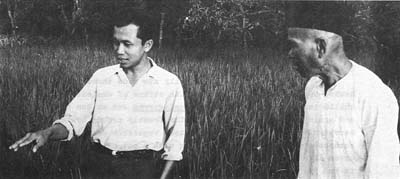
The father smiled and said, “This land is only used for seeding. It is our best land.”
“The experts tell us,” Abu smiled, “to use a quintal of Urea per hectare. But if you used that much on this land, the rice would fall down. It is very rich land.”
Father: “I spray on jowar leaves. That is my fertilizer.”
Abu: “Yes, about half a dose would be enough here. Do you get much rice per hectare?”
Father: “About twenty quintals.”
Husen suggested they go see the field and they walked out together to get a closer look.
Husen: “We only get five parts; the harvesters take the sixth.”
Father: “And besides that we lack water. Look at this earth, how dry it is already.”
Abu: “Do you ever spray? You have a lot of sundep and beluk it seems.”
Father: “I just tried one time. I borrowed a sprayer from the agriculture office. But it was destructive. It killed the rats but it also killed my chickens. A dog ate the rats and he died too.”
Abu: “Don’t you use any fertilizer now?”
Father: “Just jowar leaves.”
Abu: “You don’t use fertilizer? Never?”
Father: “Just leaves and compost from my garden. It is the natural way.”
Abu: “How much land do you have?”
Father: “Riceland? One hectare. But not in one place. Seven places. Here, there.”
Abu: “How much seed do you use?”
Father: “Five quintals only. Nobody advised me.”
Abu: “Only five quintals. Sometimes it is not enough.”
Father: “Yes. Maybe. I don’t know exactly. I’m only a farmer.”
Abu: “How many children do you have? Do they supply you with other income?”
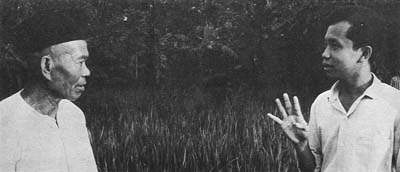
Father: “No.” [Note: This was curiously untrue. His children, especially Husen, regularly sent home money. The previous months, Husen had sent 1,500 and 3,000 rupiah to pay for weeding laborers, according to his brothers]
Abu: “You just live off the land.”
Father: “Yah.”
Abu: “How do you protect your paddy from insects?”
Father: “I just let it go.”
Abu: “So you never use spray. Just that one time against rats?”
Father: “No, when the army worm attacked, my paddy was safe. I have no army worm in my fields. But my friends did. God blessed me. My friends would say, ‘Your rice has ripened. Why don’t you cut it?’ I told them, ‘Let it ripen more.'”
Abu: “Your friends…”
Father: “They all failed but I didn’t. I fasted and prayed and God blessed me.”
Abu: “What about the new rice?”
Father: “I never tried because of lack of capital. It seems that if I spend money for the new rice I need results. I think better with the old rice. Less risk.”
Abu: “Won’t you even try it?”
Father: “Maybe. I have to change rice varieties every three years anyway.”
Abu: “You never used PB5 or PB8?”
Father: “Never I used.”
Abu: “But you’ll try now?”
Father: “I don’t know.”
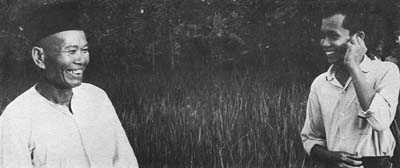
Abu: “Do you think you know how to use it?”
Father: “I have no capital. If old rice, you don’t need much. I have seen in other villages farmers who tried to grow the new rice without enough capital and it was not successful.”
Abu: “You want to try, but it’s a question of capital?”
Father: “Yes, maybe. But you know my income comes only from rice and my mango orchard. It’s not so bad if the crop fails if the investment is low. And I have to pay taxes, 1,944 rupiah last year for the territorial development assessment.”
Abu: “How much is the land worth?”
Father: “Maybe, 315,000 rupiah a hectare.” ($890 a hectare or $445 an acre).
Abu: “Do you double crop?”
Father: “If you are sure of water you can double crop. The first season you have to keep fallow some land and if the harvest comes for the first season around April, right in that month you can start planting the fallow land. You have to choose a variety not longer than five months so the harvest will come in August. So you have November to March and April to August crops, but not on the same land. I was the first farmer in the village who tried two rice crops five years ago.”
Abu: “Who gave you information?”
Father: “No, no information at all. I just tried. We always had the first crop. I tried two because once it was raining and the paddy was full of water and I thought, why don’t I plant this. Maybe the water will be enough until the paddy grows. I didn’t think it would succeed but it did. It has gone on now for five years. But now we need some assurance from the government so we can grow two crops. Last year they cut off our water so they would have it in Karanggetas for the new rice. So we didn’t get water. They cut off the flow in the canal. So we failed twice. Once from insects and once from lack of water. The first crop didn’t completely fail. But the second was a total loss.”
Abu: “Did you ever try to borrow from a bank? The government is starting up a rural credit program for farmers next year.”
Father: “No, never. I never borrow from a bank.”
Abu: “Are you afraid to get credit that way? That you can’t pay it back?”
Father: “You know the idjon system? Suppose I have land. I don’t plant it myself. I rent one bau for eight quintals of rice. Now if I’m an idjon money lender, they have to pay me before I plant. The owner of the land automatically gets eight quintals per bau, and he in turn sells the crop before the harvest when the price is way up for 2,500 cash. And he keeps all the cash or even loans it out on interest or will wait until the harvest and the price drops to 1,200 or even 1,000 rupiah per quintal and he can buy more cheap. The rich relative of mine who held a sandiwara drama a few weeks ago is an idjon money lender.”
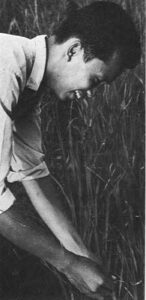 Abu: “You wouldn’t mortgage your land at a bank?”
Abu: “You wouldn’t mortgage your land at a bank?”
Father: “No, never, never mortgage the land.”
Abu: “Where do you get capital?”
Father: “Oh, just my garden. My mango trees. Selling a little rice. Sometimes I have to borrow from friends. I give them the fruit of my mango trees as interest.”
Abu: “‘Why don’t you borrow from the government?”
Father: “For each 800 rupiah you have to pay back one quintal of rice per season. It is too much.”
Abu: “What about your friends?”
Father: “They do the same as me, borrow on our mango trees.”
Abu: “Have you ever followed any agriculture course?”
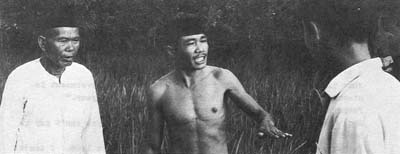
Father: “No, never. Once I planted some maize seeds and an agriculture official came and I got a prize. One sarong.”
Abu: “Why don’t you try that again?”
Father: “Now there’s not enough water.”
Abu: “If you have enough food and clothing and get more income, how do you spend it?”
Father: “Sometimes I loan it to friends without interest. No interest at all. Or loan to my relatives. If God blesses me, I’ll never starve. If my rice fails, I can still eat manioc and maize.”
Abu: “How did you get this land?”
Father: “When I was young I sold bananas at night in the market in Djatibarang.”
Abu: “Have you ever made a calculation about your expenses and income?”
Father: “No, never. Because I never take credit. So I think it is not necessary for me.”
Abu: “So what do you think is more important, capital or method?”
Father: “Method. This rice needs more water so I just put some more water and if it needs less, I’ll just drain some out. When I was young I learned from experience. And I compare my last result with the previous one.”
Abu: “To find a new method you ask officials?”
Father: “No, never. I just watch my farm and try to improve it. It’s my habit to do things by my own methods. If I have to plant a seed, any seed, I just use a thread to make it straight, like this, with strings.”
Abu: “Why straight?”
Father: “More results and more profit. I just try to find my own way and improve it. I got a prize years ago without asking. You can imagine a poor Javanese who had never had a sarong until then. We were forbidden by the prijaji (nobles, Javanese upper class) to wear them in those days and I got a prize.”
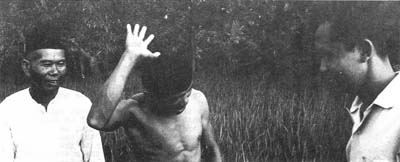
Abu: “This land is prosperous enough so that you need not use a full dose of fertilizer. If you want to use Urea, a half quintal is enough with the jowar leaves.”
Father: “Only a half quintal? Tell me how to use it.”
Abu: “Put on TSP first, one day before you plant. Then after that, the next day, you can plant your seed. In the first weeding, put Urea. Half of the half-quintal. On the second weeding, put the rest of your Urea. If you use PB5, use 22.5 kilos of TSP and one quintal of Urea. Only for this soil. Every one is different.”
Father: “Hmmm.”
Abu: “Oh, I see a field out there of new rice.”
Father: “Yes, it belongs to Rustam. He is the first of our village to try the new rice.”
Abu: “How is he doing?”
Father: “Let us wait and see.”
Husen now spoke up. “Look, father, next time I come from Djakarta I’ll stay here a long time. I want to plant some peanuts and papaya in Tjibanteng garden and I want to get some fertilizer from Djatibarang and do like Abu says. I want to try. Now I not stay long. But also, father, after you cut this paddy, I want planting new rice. I’ll ask Abu about fertilizer and practices. I want to try.”
Father: “All right, son. But you must be careful about money. You can spend very easily.”
Husen: “Yah, maybe if I find money I not stay in Djakarta a long time.”
Father: “Better maybe you are a farmer here, Husen. You are strong and not tired and can make many, many plantings.”
Husen: “Yah, father, and maybe even I might try building a little shop along the road. Karniti wants and I like to try.”
That night Abu looked to see what Dr. Mosher would have to say:
“Basic beliefs about life and its meaning color the attitudes and actions of great numbers of people…Most specialized tasks require some empathy: the ability to see things from the other point of view.”
“Is it not true that farmers resent being pushed around and told what to do? All of us do. Farmers want to be treated as human beings, as intelligent and responsible persons. They can accept help and advice from others only to the extent that doing so does not violate their own self-respect or their own integrity as persons…”
“Money is not everything. Friendship and social approval are important to most of us. We fear ridicule and we fear being shut out of the companionship of our fellows even more. Farmers share these feelings.”
Abu – and Dr. Mosher – had made a convert, but only one. Husen was to return to Djakarta after the rice harvest and one day, after it had begun, Abu was dismayed to find Husen and his brothers sitting about the house with their father while others cut their rice. “It’s the tjeblokan system,” Husen explained. “Father believes that those who planted the rice must harvest it. It is the tradition and at planting time we didn’t have the money.”
Abu observed the father’s workers and stood by as the harvesters weighed the newly-cut bundles and received their one-sixth of the crop. “It was the best one-sixth,” he told Husen. “No wonder your father is poor.”
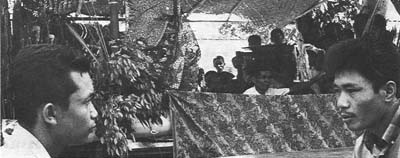
Now, during the harvest season there were many sandiwaras and wajang plays and Abu, despite his professional views, loved them and went to one or the other almost every night. One of these wajangs was peculiar in that there were no chairs for the audience, indeed there was no audience. Instead a crowd of young men had gathered before a large open window at the host’s house. Inside sat a very fat lady in a yellow silk bridal veil with two young girls, in similar wedding dress, on either side of her. Absent, however was the bridegroom. When Abu and Husen inquired they learned the lady had been married twenty-eight times already, loved weddings and wajang kulits, and although she had grown old and fat and could find no new husband, had decided to have a marriage ceremony anyway. Husen told Abu he recognized the woman. He had stopped in front of her house in Kliwed several years before with a flat tire. As he waited for the tire to be repaired, the woman had come to the door and asked, “Don’t you play guitar? I hear in Djakarta you play guitar, Husen. You were Taminah’s husband, okay? All right, please, come in and play my guitar.” Husen entered and proceeded to play some Tjirebon songs when the woman stood up and said, “C’mon, brother, inside, inside this room.” She gave him a shove and Husen found himself in a dark room with a big mirror and a bed. As the woman closed the door she pushed her body against his and Husen exclaimed, “No, no, no!” and grabbed the door, rushed through and out of the house. “Because my bicycle already made good,” he told Abu, chuckling.
Some days later, Abu asked Husen to accompany him to another Wajang in Bojong. A progressive farmer who had been a former Communist had achieved the local production record of 92 quintals per hectare. He was giving a wajang, the story of rice, “Mapag Sri” and the sub district agricultural officer would be there to present the Bojong man with a prize.
On the way, Abu told Husen that many of the most progressive farmers in the four villages where he worked were either former Communists or leftists who had been jailed in 1966. “I’ve never been able to find out how many people were killed in Bojong in 1965,” he told Husen. “Do you know?”
“I dunno. Maybe twenty.” Husen did not want to talk about that chapter in the village’s life. “It’s all over now.”
But during the wajang, when their host took Abu out to show him the prize field, they discovered someone had come along with a penang and severed at least half a dozen of the plants from their stems.
“Why would anybody do that?” Husen asked in all innocence. “I don’t know. Maybe jealous,” answered the former Communist with a frozen smile. Husen noticed it was an equally lavish wajang presentation. As was the custom, their host fed all the neighborhood children and some poor adults, but as was far more generous than the custom, he also gave each a full kilo of rice apiece to take home.
At sundown, when the wajang ended, rice had sprung anew from Dewi Sri’s grave and all the insects and animals had burst forth from Budug Basuh’s coffin, Abu went back to try and persuade the Dalang, a neighbor of Husen’s, to inject a little more modern agricultural technology into his dialogue.
But the Dalang refused to acknowledge his host’s success in raising 92 quintals per hectare was due to careful application of Urea, TSP and Endrin. “It was the wind,” the Dalang said. “It blew down from the forest and Tjiremai Mountain and carried all the insects from his field onto another’s. Now someone else will suffer for his success.” A day or two later Husen passed the thick, rich rice field of the former Communist and noticed that while it was overripe, people were harvesting in all the surrounding fields but not his. When he asked a harvester from Bojong, he was told, “There weren’t enough workers so he’ll have to wait.”
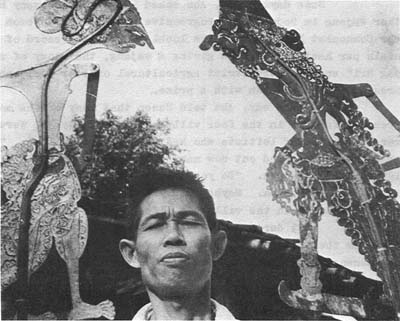
The Dalang
Return to Djakarta
Dusk. The light of the evening was descending on the village; the last rays of the equatorial sun still shone on the palm leaves above. Everything was green, the pale green of the rice fields against the darker green of the bamboo and mango trees, there was every shade of green and in the milky luminescence of the pond, Karniti was bathing and softly singing in her high-pitched voice. From the river came the cries of children, “Put me on your shoulders, Uncle Husen!” “Run, run!” “Hai, hai, hai!” An old woman and some boys passed along the path, returning from Tjibanteng Garden with bunches of green bananas on their heads. Somewhere in the bamboo thicket came the cry of the bird the Javanese call the Prekutut, for it calls shrilly at sunset, “Prekut-tut-tut-tut!”
Husen, wrapped only in a faded sarong, his hair wet and matted from the swim, came back to the house and flung himself down on a bamboo cot in the yard.
“Back from the river, Husen?” Karniti emerged from the pond, wrapping a batik around herself and shaking out her long black hair.
“Hey, Kar, what was that over in Karanggetas! I saw some girls dancing there last night. With men inside one sarong. They pay ten roops. I think this is dirty thing. In my village never; the polisi would chase away. In Djakarta, okay. But the village is not Djakarta.”
“Oh, for kissing. That is only for kissing, I hear.” Karniti shook her hair out all the more vigorously. “Please, if you like, you can go.”
Husen rolled over on his back. “Why if I like to go I tell with you? If I like kissing the dancing girls I not tell you about it. I am just go myself.”
Husen lay on his back with his hands behind his head looking up at the sky. He saw it on fire with the redness of dusk, and then he saw the light go out; the angels drew their golden wings over the horizon and went to their night’s rest. The heat of the day was gone, the soft, blissful night was beginning, and Husen might sit quietly there all evening. He saw the sky grow dim, the mist descending over the ground, and the stars light up one after the other. In the morning he and Karniti would return to Djakarta; time enough to think about the future.
The children had followed him up from the river and were now squatting in a semi-circle around his youngest brother, Warjono, who began to relate the second half of “Mapag Sri,” the wajang kulit, acting out all the roles just as Husen had done twenty years before. A typhoon, in giant form, has carried away Dewi Sri, pursued by all the gods. There is a long battle between the gods and all the enemies of rice, insects, animals and the typhoon. Budug Basuh appears in the reincarnation of a tusked black boar and, once more, in his unrequited love, tries to seize Dewi Sri. When the gods fail to stop him, Semar gives Ardjuna a magic flying kris and Budug Basuh is killed once more.
A breeze from the distant Java Sea crackled the banana leaves and Husen stared at the stars, the incomprehensible sky itself and the mist and the thought came to his mind of that loneliness which awaits everyone by the grave; in his sudden sensation of loneliness he wanted to call to Karniti and felt ashamed of his words.
Just then the village constable appeared, a tall, lanky youth in a sarong. “Hey, Husen, when you go to Djakarta?”
“Tomorrow maybe.”
“I heard you change places now in Djakarta.”
“Yah, I am now in Simprug, in Kebajoran, because in Karet we did not have a good room. Very full of betjak men. So I am now contract a room and stay over there in Kebajoran and bring the betjak of my uncle to the hotel.”
“Oh, good, because if you already have room. So if you want to sleep and not work it’s free. You bring your wife?”
“Yah, she must cook for me.”
“You want to stay there long, in Djakarta?”
“I don’t know.”
“Before you go tomorrow, stop by my house and I’ll give you a letter of way. Then you’ll have no trouble.”
“Very good.” When the constable left, Husen lay back again and listened to the voices of the boys. His brothers were arguing. Tarja had a few rupiahs and wanted Warjono to go to the village warung and buy some roasted peanuts but the younger brother refused to go. “C’mon, Warjono, let’s go to the warung.”
“Please, go yourself and buy.”
“You go, boy, and quickly.”
“No, I am tired. Why you want me to go buy peanuts for you?”
Tarja’s voice rose, angry at his thirteen-year-old brother, “I work hard in the fields all day; you only play and are a lazy boy.”
“It’s you who are lazy.”
Husen heard his mother’s voice now calling from the doorway. “Boys, you don’t get angry and angry. Why? There are peanuts in the house. I can roast some. Because Tarja work hard already.”
Husen’s father came outside and sat down on the bench. He stared into the darkness for some time and mused, “My grandfather used to tell me about hunting for mangos and there were many tigers and jackals in those times. And many birds also. Where have all the birds gone? Twenty years ago we used to have crows and not a one today.”
“Hey, ma! Ma!” Warjono called. “Please ask Warman for the two and a half roops I gave him.”
“Oh, he already paid it. I forgot to tell you, I left it on the table. Maybe Tarja took your money.”
“No, no, no!” Tarja was indignant. The children laughed and one boy said, “Oh, Tarja is not a village chief. He doesn’t have to steal money.”
“If a man with money passes by with black magic you, can make it shift to your own pocket,” said another boy.
“If we know such a man we must kill him,” said the first. “Maybe he has made a pact with setan. Ghosts can steal money and not get caught.”
“Do you remember when the djim (a Moslem genie) took Warjono?” the mother said from the doorway. “I left him with Djena and said, ‘Be careful of Warjono. Be careful of the baby, Djena.’ He was only two years old then. At nine o’clock I looked for him but he was gone. I was afraid he might have fallen into one of the canals or ponds around here and I rushed to the neighbors and cried, ‘Have you seen my son?’ I looked everywhere but not find.”
The father joined in, “All the neighbors joined in the search and finally your mother found him half a kilometer away, sitting in the path.”
Warjono: “I thought mother took me there.”
“No, not me. It must have been a djim. The djim was taking Warjono to Gemuruh Village on the other side of Karanggetas where there used to be many djims. There was a food offering on the path where we found Warjono and everyone thought the ghost stopped for food and that’s why Warjono reappeared again.”
“Maybe when the ghost was carrying him he was invisible,” ventured the old man.
Karniti appeared laughing in the doorway. “Be careful, Husen, when you go about after dark. There are many ghost children near the dancing girl place.”
“Wah! Who’s afraid,” Husen chuckled. “Only one time I see ghosts. I was walking home about midnight and I saw someone in Karanggetas, in a bamboo thicket, squatting on the ground, like going to the bathroom. I think, that is people. Oh, better if it is, in this dark place. Then I stubbed my toe – I was barefoot – and bent over a minute and when I looked up the man was gone. Because I ‘fraid, I ran and in the morning tell my friends, ‘Wah! Last night I am looking at a man over there in the bamboo place. But looking again is gone, no more.'”
Karniti laughed. “Warjo, please buy me some sugar.”
“No. no, no! I have no money!” the boy answered in a silly sing-song voice.
“Here, I’ve got some,” Husen said gruffly.
“This is fifty! Must spend all!”
“No, Warjo, sugar is only five roops,” Husen said. “You give me back the change.”
“Maybe I have something smaller,” Karniti looked in the house and called back, “Oh, I put ten roops on the table. Now I’ve lost it.”
“Maybe Tarja took it!” Warjono sang.
“Oh, everybody suspect me today,” Tarja squawked, lunging at Warjono. The boy dodged back and ran toward the road, followed by the other children, calling loudly back, “Oh, Tarja, stealing money…Oh, Tarja, confess!”
“I didn’t take it!” Tarja’s voice rose to a squeak.
“Confess, Tarja, confess, confess!” All the little boys voices shouted in chorus and Tarja leapt up and chased them down the path as they scattered in hoots of laughter.
Husen chuckled, “If no children not so happy.” He instantly regretted his words when he saw his wife’s face.
The bus to Djakarta was overcrowded and Husen and Karniti had to sit in the back near the engine. Perhaps it was the gas fumes, but they had not ridden an hour before Karniti turned very pale, beads of perspiration appearing on her forehead; she had to get off the bus at one stop and vomit.
Husen felt remorseful. At their leave taking, as he had knelt first at his father’s feet and then his mother’s, taking both of their hands in his, touching his head to them and letting his grasp slowly slip away, he had been fuming with annoyance at his wife. She had forgotten their marriage license at her parents’ house across the river and fortunately he had been able to find another document proving their marriage so their trip was not delayed.
Now Husen suggested they turn around and go back to the village. But Karniti insisted on going ahead to Djakarta. She had left their room in charge of a distant relative, a girl not long in the city and told Husen, “Maybe my cousin has been having boys there. It is better we go to Djakarta. It is a long time already.”
The thought came to Husen that his wife might be pregnant again; at this his heart swelled and something seemed to thicken in his throat. He reached over and held Karniti’s hand tightly but he said nothing.
“Why, Husen? Oh, maybe you were remembering our boy. He was in my arms the last time we came to Djakarta.”
“I hope with God our boy is happy, Kar. Now he stay over there in Heaven. Until now I think all the time about our boy. Mendoa kepada Allah. Pray with God.”
But in his heart Husen prayed they would have another child.
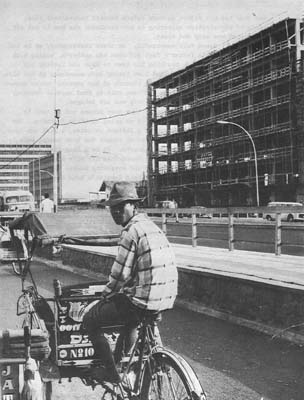
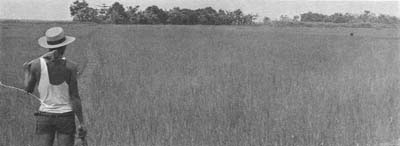
(To be continued. Part Two: The City)
Received in New York on December 1, 1970.
©1970 Richard Critchfield
Mr. Richard Critchfield is an Alicia Patterson Fund award winner on leave from the Washington Evening Star, Washington, D.C. This article may be published with credit to Mrs. Critchfield, the Washington Star and the Alicia Patterson Fund.


